Disclaimer
Paul Gustave Dore
French Romantic Illustrator, Printmaker, Painter & Sculptor
1832 - 1883
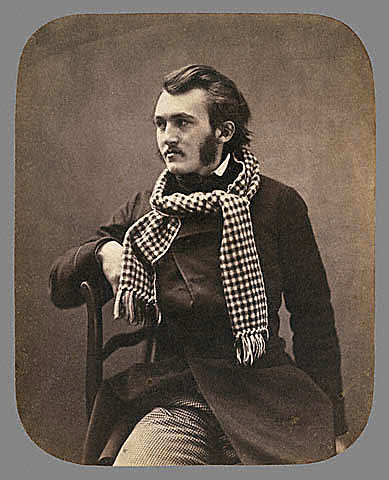
Paul Gustave Dore
by Felix Nadar: 1855-1859
Paul Gustave Dore was a French artist, engraver, illustrator and sculptor. Dore worked primarily with wood engraving and steel engraving.
Dore was born in Strasbourg and his first illustrated story was published at the age of fifteen. Dore began work as a literary illustrator in Paris. Dore commissions include works by Rabelais, Balzac, Milton and Dante. In 1853 Dore was asked to illustrate the works of Lord Byron. This commission was followed by additional work for British publishers, including a new illustrated English Bible. In 1863, Dore illustrated a French edition of Cervantes's Don Quixote, and his illustrations of the knight and his squire Sancho Panza have become so famous that they have influenced subsequent readers, artists, and stage and film directors' ideas of the physical "look" of Dore francs from publisher Harper & Brothers in 1883.
Dore's English Bible (1866) was a great success, and in 1867 Dore had a major exhibition of his work in London. This exhibition led to the foundation of the Dore Gallery in New Bond Street. In 1869, Blanchard Jerrold, the son of Douglas William Jerrold, suggested that they work together to produce a comprehensive portrait of London. Jerrold had gotten the idea from The Microcosm of London produced by Rudolph Ackermann, William Pyne, and Thomas Rowlandson in 1808. Dore signed a five-year project with the publishers Grant & Co that involved his staying in London for three months a year. He was paid the vast sum of £10,000 a year for his work.
The book, London: A Pilgrimage, with 180 engravings, was published in 1872. It enjoyed commercial success, but the work was disliked by many contemporary critics. Some critics were concerned with the fact that Doré appeared to focus on poverty that existed in London. Dore was accused by the Art Journal of "inventing rather than copying." The Westminster Review claimed that "Dore gives us sketches in which the commonest, the most vulgar external features are set down." The book was also a financial success, and Dore received commissions from other British publishers. Dore's later works included Coleridge's Rime of the Ancient Mariner, Milton's Paradise Lost, Tennyson's The Idylls of the King, The Works of Thomas Hood, and The Divine Comedy. His work also appeared in the Illustrated London News. Doré continued to illustrate books until his death in Paris in 1883. He is buried in the city's Père Lachaise Cemetery.
In "Pickman's Model", author H. P. Lovecraft praises Dore: "There's something those fellows catch - beyond life - that they're able to make us catch for a second. Dore had it. (Sidney) Sime has it."
DIVINA COMMEDIA
The Divine Comedy written by Dante Alighieri between 1308 and his death in 1321, is widely considered the central epic poem of Italian literature, and is seen as one of the greatest works of world literature. The poem's imaginative and allegorical vision of the Christian afterlife is a culmination of the medieval world-view as it had developed in the Western Church. It helped establish the Tuscan dialect in which it is written as the Italian standard.
The Divine Comedy is composed of over 14,000 lines that are divided into three canticas: Inferno (Hell), Purgatorio (Purgatory), and Paradiso (Paradise) - each consisting of 33 cantos. An initial canto serves as an introduction to the poem and is generally not considered to be part of the first cantica, bringing the total number of cantos to 100. The number 3 is prominent in the work, represented here by the length of each cantica.
The poem is written in the first person, and tells of Dante's journey through the three realms of the dead, lasting during the Easter Triduum in the spring of 1300. The Roman poet Virgil guides him through Hell and Purgatory; Beatrice, Dante's ideal woman, guides him through Heaven. Beatrice was a Florentine woman whom he had met in childhood and admired from afar in the mode of the then-fashionable courtly love tradition which is highlighted in Dante's earlier work La Vita Nuova.
In Northern Italy's political struggle between Guelphs and Ghibellines, Dante was part of the Guelphs, who in general favored the Papacy over the Holy Roman Emperor. Florence's Guelphs split into factions around 1300: the White Guelphs, who opposed secular rule by Pope Boniface VIII and who wished to preserve Florence's independence, and the Black Guelphs, who favored the Pope's control of Florence. Dante was among the White Guelphs who were exiled in 1302 by the Lord-Mayor Cante de' Gabrielli di Gubbio, after troops under Charles of Valois entered the city, at the request of Boniface and in alliance with the Blacks. The Pope said if he had returned he would be burned at the stake. This exile, which lasted the rest of Dante's life, shows its influence in many parts of the Comedy, from prophecies of Dante's exile to Dante's views of politics to the eternal damnation of some of his opponents.
In Hell and Purgatory, Dante shares in the sin and the penitence respectively. The last word in each of the three parts of the Divine Comedy is "stars."
INFERNO
Dante in the Dusky Woods
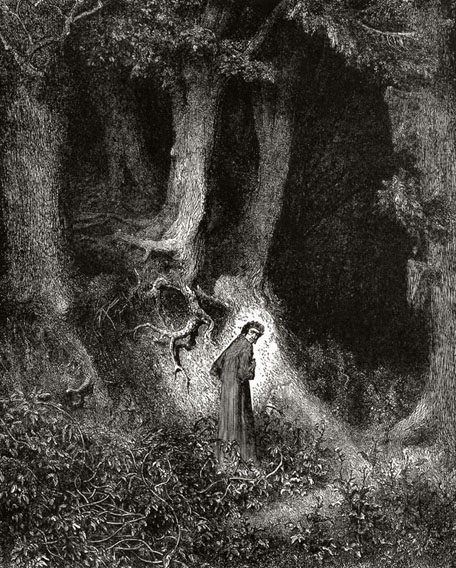
IN the midway of this our mortal life,
I found me in a gloomy wood, astray
Inferno - Canto 1, lines 29-32
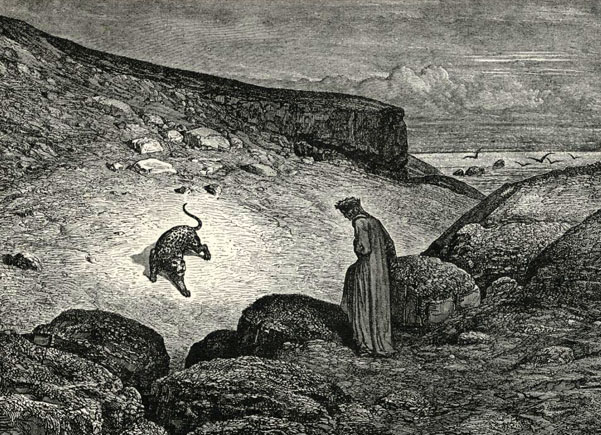
Scarce the ascent
Began, when, lo! a panther, nimble, light,
And cover'd with a speckled skin, appear'd
Inferno - Canto 1, lines 43-44
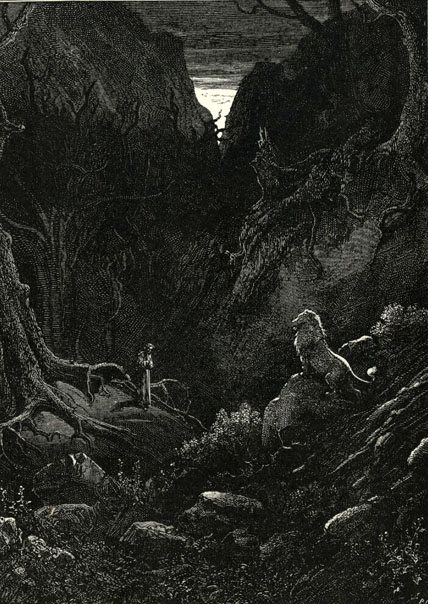
A lion came, 'gainst me, as it appear'd,
With his head held aloft and hunger-mad
Inferno - Canto 1, lines 87-88
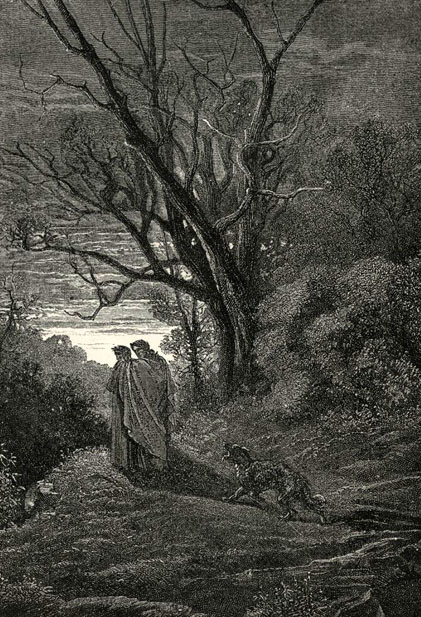
He, soon as he saw
That I was weeping, answer'd
Inferno - Canto 1, line 132
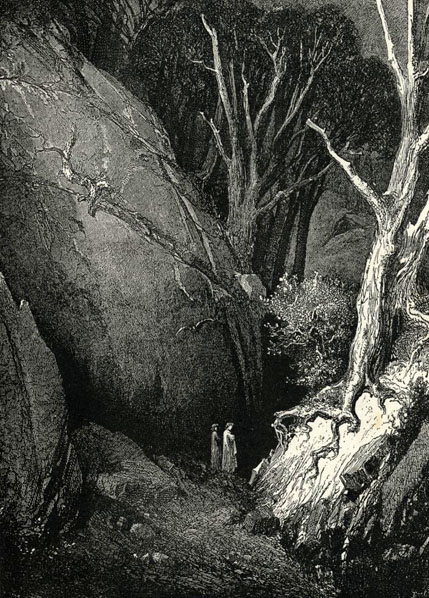
Onward he mov'd, I close his steps pursu'd.
Inferno - Canto 2, line 1
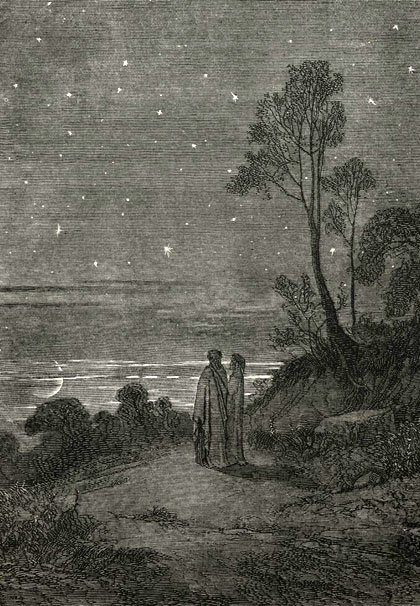
NOW was the day departing
Inferno - Canto 2, lines 70-71
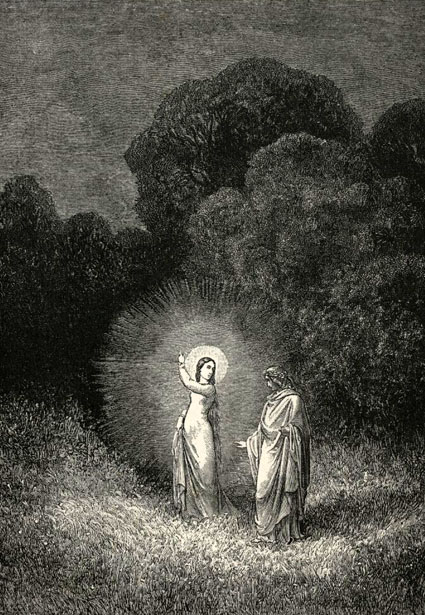
I who now bid thee on this errand forth
Am Beatrice
Inferno - Canto 3, line 9
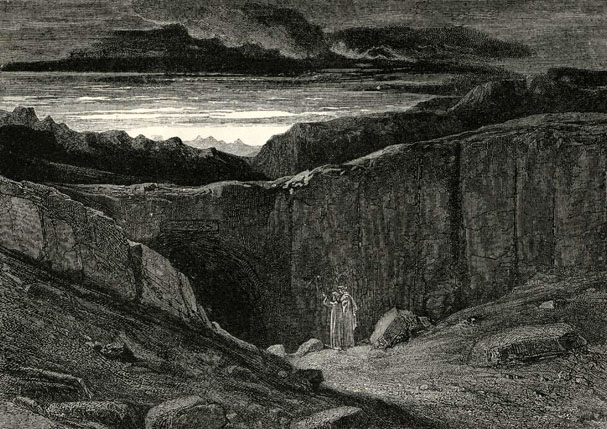
"All hope abandon ye who enter here."
Inferno - Canto 3, lines 76-78
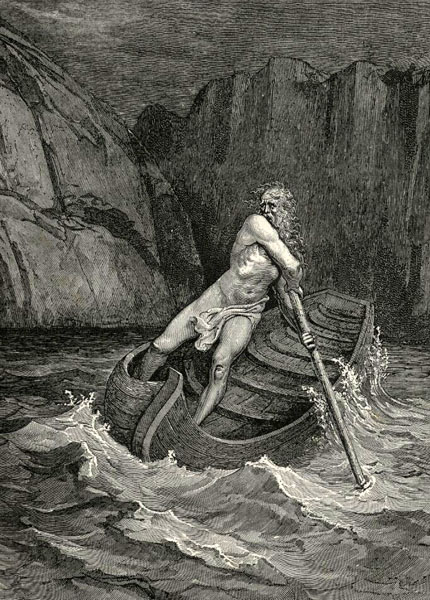
And lo! toward us in a bark
Comes on an old man hoary white with eld,
Crying, "Woe to you wicked spirits!
Inferno - Canto 3, lines 107-108
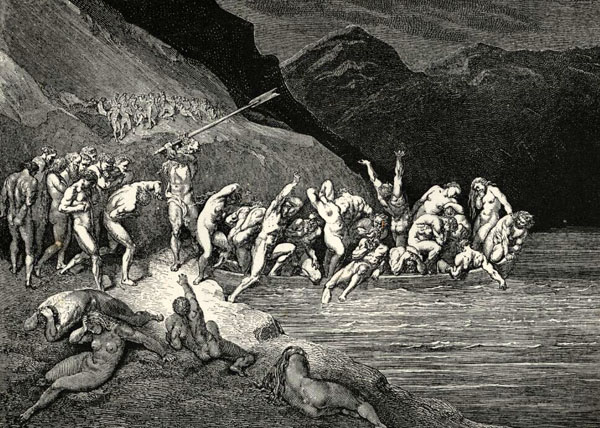
E'en in like manner Adam's evil brood
Cast themselves one by one down from the shore
Inferno - Canto 4, lines 38-39
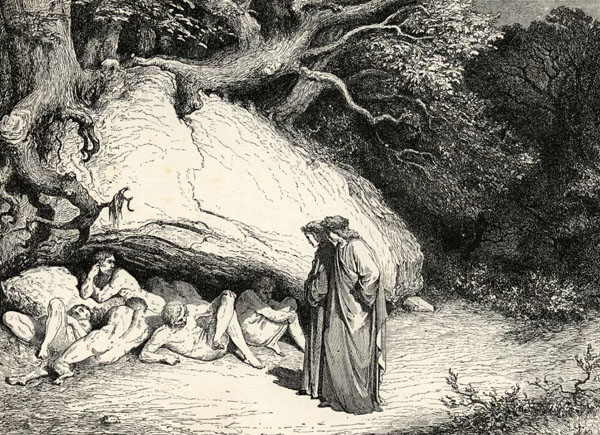
Only so far afflicted, that we live
Desiring without hope.
Inferno - Canto 4, lines 89-91
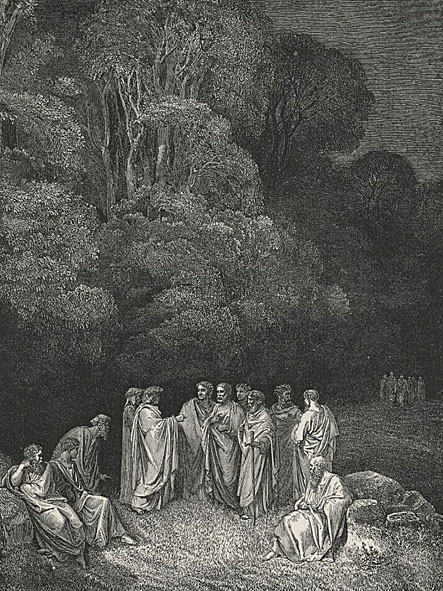
So I beheld united the bright school
Of him the monarch of sublimest song,
That o'er the others like an eagle soars.
Inferno - Canto 5, line 4
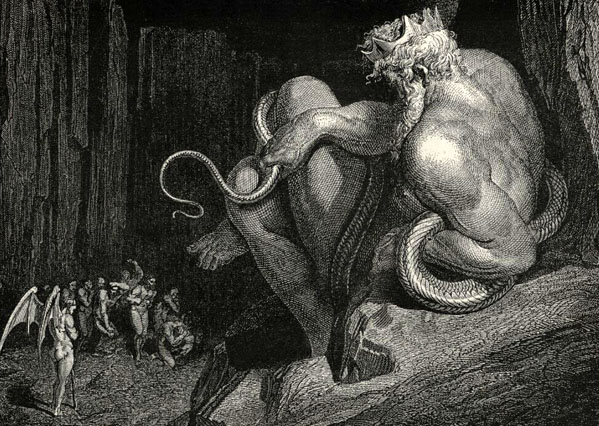
There, Minos stands
Inferno - Canto 5, lines 32-33
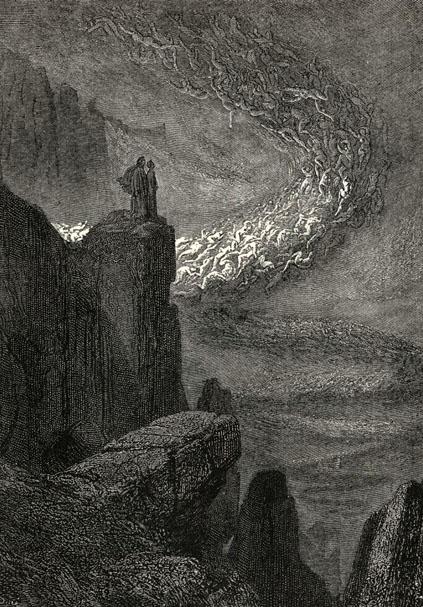
The stormy blast of hell
With restless fury drives the spirits on
Inferno - Canto 5, lines 69-86
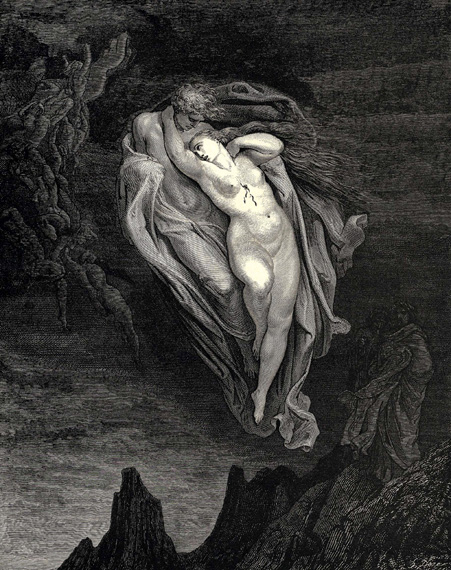
When I had heard my sage instructor name
Those dames and knights of antique days, o'erpower'd
By pity, well-nigh in amaze my mind
Was lost; and I began: "Bard! willingly
I would address those two together coming,
Which seem so light before the wind." He thus:
"Note thou, when nearer they to us approach.
Then by that love which carries them along,
Entreat; and they will come." Soon as the wind
Sway'd them toward us, I thus fram'd my speech:
"O wearied spirits! come, and hold discourse
With us, if by none else restrain'd." As doves
By fond desire invited, on wide wings
And firm, to their sweet nest returning home,
Cleave the air, wafted by their will along;
Thus issu'd from that troop, where Dido ranks,
They through the ill air speeding; with such force
My cry prevail'd by strong affection urg'd.
The Inferno - Canto 5, lines 99-111
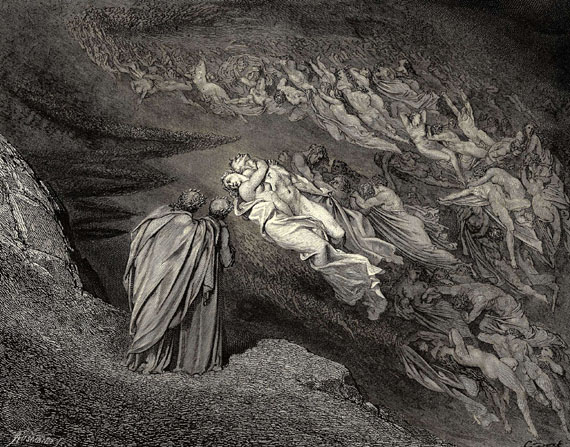
"Love, that in gentle heart is quickly learnt,
Entangled him by that fair form, from me
Ta'en in such cruel sort, as grieves me still:
Love, that denial takes from none belov'd,
Caught me with pleasing him so passing well,
That, as thou see'st, he yet deserts me not.
Love brought us to one death: Caina waits
The soul, who spilt our life." Such were their words;
At hearing which downward I bent my looks,
And held them there so long, that the bard cried:
"What art thou pond'ring?" I in answer thus:
"Alas! by what sweet thoughts, what fond desire
Must they at length to that ill pass have reach'd!"
The Inferno - Canto 5, lines 112-135
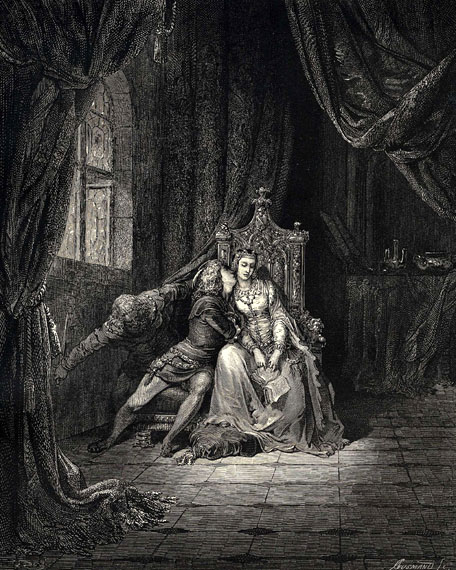
Then turning, I to them my speech address'd.
And thus began: "Francesca! your sad fate
Even to tears my grief and pity moves.
But tell me; in the time of your sweet sighs,
By what, and how love granted, that ye knew
Your yet uncertain wishes?" She replied:
"No greater grief than to remember days
Of joy, when mis'ry is at hand! That kens
Thy learn'd instructor. Yet so eagerly
If thou art bent to know the primal root,
From whence our love gat being, I will do,
As one, who weeps and tells his tale. One day
For our delight we read of Lancelot,
How him love thrall'd. Alone we were, and no
Suspicion near us. Ofttimes by that reading
Our eyes were drawn together, and the hue
Fled from our alter'd cheek. But at one point
Alone we fell. When of that smile we read,
The wished smile, rapturously kiss'd
By one so deep in love, then he, who ne'er
From me shall separate, at once my lips
All trembling kiss'd. The book and writer both
Were love's purveyors. In its leaves that day
We read no more."
The Inferno - Canto 5, lines 135-138
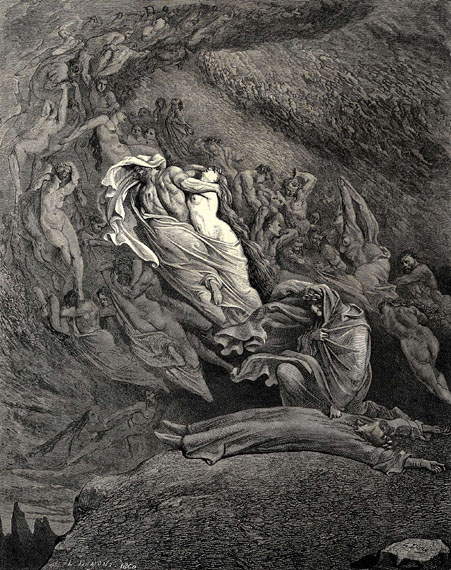
While thus one spirit spake,
The other wail'd so sorely, that heartstruck
I through compassion fainting, seem'd not far
From death, and like a corpse fell to the ground.
The Inferno - Canto 6, lines 12-32
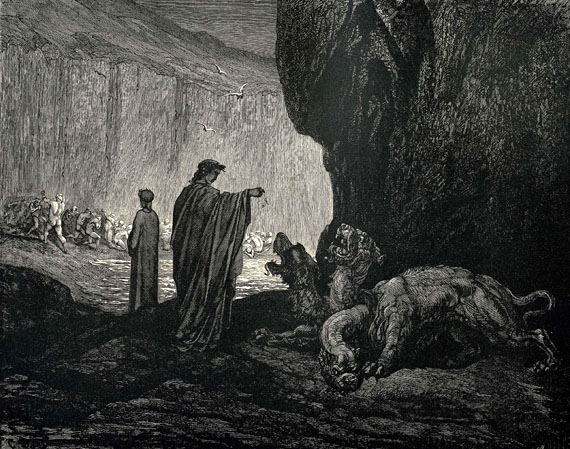
Cerberus, cruel monster, fierce and strange,
Through his wide threefold throat barks as a dog
Over the multitude immers'd beneath.
His eyes glare crimson, black his unctuous beard,
His belly large, and claw'd the hands, with which
He tears the spirits, flays them, and their limbs
Piecemeal disparts. Howling there spread, as curs,
Under the rainy deluge, with one side
The other screening, oft they roll them round,
A wretched, godless crew. When that great worm
Descried us, savage Cerberus, he op'd
His jaws, and the fangs show'd us; not a limb
Of him but trembled. Then my guide, his palms
Expanding on the ground, thence filled with earth
Rais'd them, and cast it in his ravenous maw.
E'en as a dog, that yelling bays for food
His keeper, when the morsel comes, lets fall
His fury, bent alone with eager haste
To swallow it; so dropp'd the loathsome cheeks
Of demon Cerberus, who thund'ring stuns
The spirits, that they for deafness wish in vain.
The Inferno - Canto 6, lines 36-56
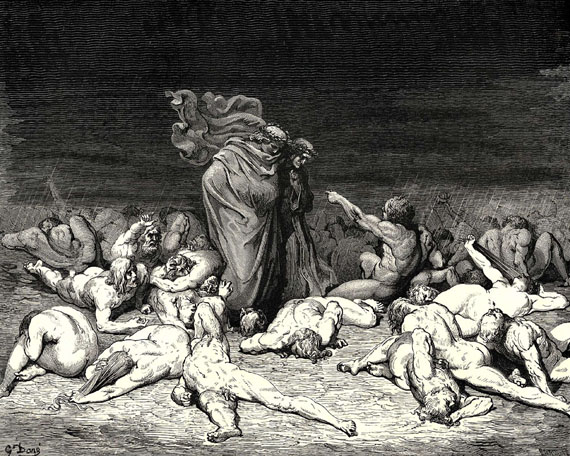
We, o'er the shades thrown prostrate by the brunt
Of the heavy tempest passing, set our feet
Upon their emptiness, that substance seem'd.
They all along the earth extended lay
Save one, that sudden rais'd himself to sit,
Soon as that way he saw us pass. "O thou!"
He cried, "who through the infernal shades art led,
Own, if again thou know'st me. Thou wast fram'd
Or ere my frame was broken." I replied:
"The anguish thou endur'st perchance so takes
Thy form from my remembrance, that it seems
As if I saw thee never. But inform
Me who thou art, that in a place so sad
Art set, and in such torment, that although
Other be greater, more disgustful none
Can be imagin'd." He in answer thus:
"Thy city heap'd with envy to the brim,
Ay that the measure overflows its bounds,
Held me in brighter days. Ye citizens
Were wont to name me Ciacco. For the sin
Of glutt'ny, damned vice, beneath this rain,
E'en as thou see'st, I with fatigue am worn;
Nor I sole spirit in this woe: all these
Have by like crime incurr'd like punishment."
The Inferno - Canto 7, lines 1-15
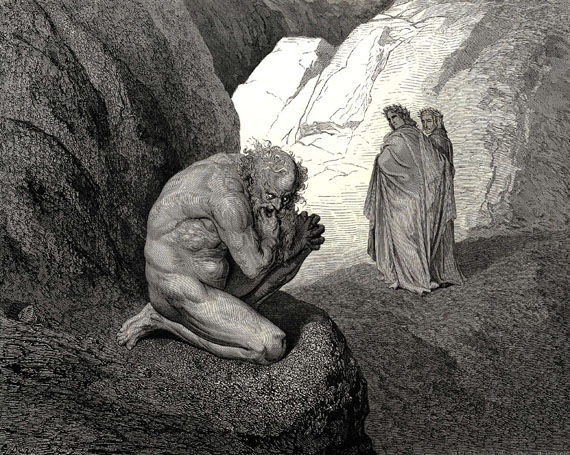
"Ah me! O Satan! Satan!" loud exclaim'd
Plutus, in accent hoarse of wild alarm:
And the kind sage, whom no event surpris'd,
To comfort me thus spake: "Let not thy fear
Harm thee, for power in him, be sure, is none
To hinder down this rock thy safe descent."
Then to that sworn lip turning, "Peace!" he cried,
"Curs'd wolf! thy fury inward on thyself
Prey, and consume thee! Through the dark profound
Not without cause he passes. So 't is will'd
On high, there where the great Archangel pour'd
Heav'n's vengeance on the first adulterer proud."
As sails full spread and bellying with the wind
Drop suddenly collaps'd, if the mast split;
So to the ground down dropp'd the cruel fiend.
Inferno - Canto 7, lines 53-67
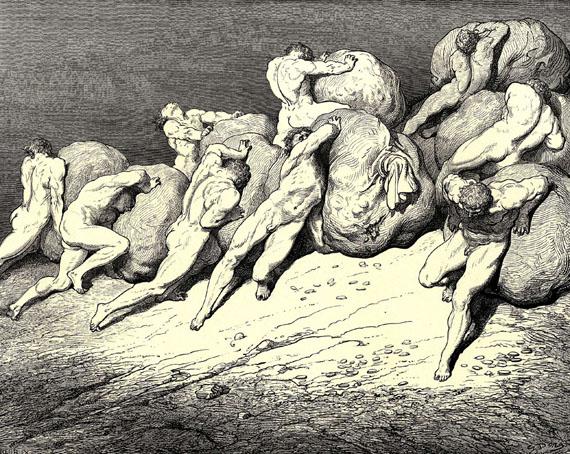
"Vain thought conceiv'st thou. That ignoble life,
Which made them vile before, now makes them dark,
And to all knowledge indiscernible.
Forever they shall meet in this rude shock:
These from the tomb with clenched grasp shall rise,
Those with close-shaven locks. That ill they gave,
And ill they kept, hath of the beauteous world
Depriv'd, and set them at this strife, which needs
No labour'd phrase of mine to set if off.
Now may'st thou see, my son! how brief, how vain,
The goods committed into fortune's hands,
For which the human race keep such a coil!
Not all the gold, that is beneath the moon,
Or ever hath been, of these toil-worn souls
Might purchase rest for one."
Inferno - Canto 7, lines 110-134
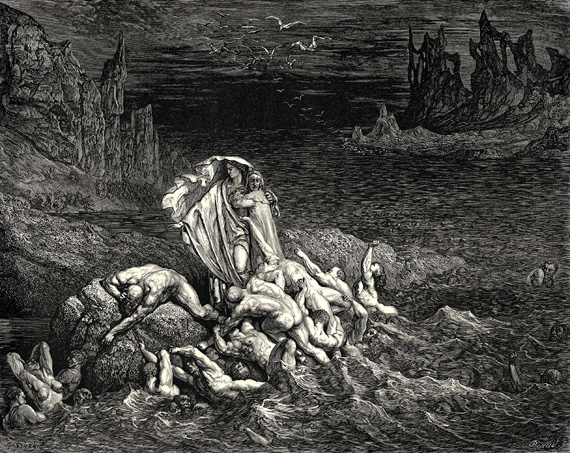
Into a lake, the Stygian nam'd, expands
The dismal stream, when it hath reach'd the foot
Of the grey wither'd cliffs. Intent I stood
To gaze, and in the marish sunk descried
A miry tribe, all naked, and with looks
Betok'ning rage. They with their hands alone
Struck not, but with the head, the breast, the feet,
Cutting each other piecemeal with their fangs.
The good instructor spake; "Now seest thou, son!
The souls of those, whom anger overcame.
This too for certain know, that underneath
The water dwells a multitude, whose sighs
Into these bubbles make the surface heave,
As thine eye tells thee wheresoe'er it turn.
Fix'd in the slime they say: "Sad once were we
In the sweet air made gladsome by the sun,
Carrying a foul and lazy mist within:
Now in these murky settlings are we sad."
Such dolorous strain they gurgle in their throats.
But word distinct can utter none." Our route
Thus compass'd we, a segment widely stretch'd
Between the dry embankment, and the core
Of the loath'd pool, turning meanwhile our eyes
Downward on those who gulp'd its muddy lees;
Nor stopp'd, till to a tower's low base we came.
Inferno - Canto 8, lines 13-29
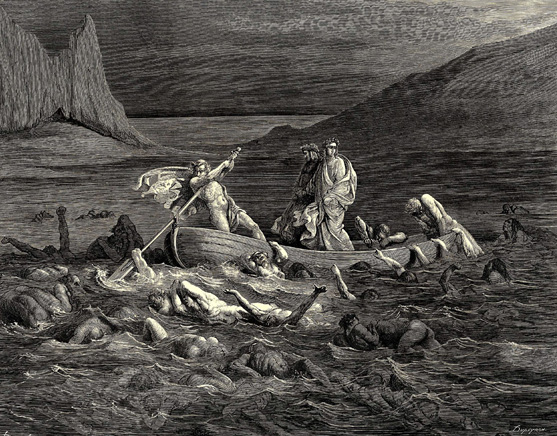
Never was arrow from the cord dismiss'd,
That ran its way so nimbly through the air,
As a small bark, that through the waves I spied
Toward us coming, under the sole sway
Of one that ferried it, who cried aloud:
"Art thou arriv'd, fell spirit?" - "Phlegyas, Phlegyas,
This time thou criest in vain," my lord replied;
"No longer shalt thou have us, but while o'er
The slimy pool we pass." As one who hears
Of some great wrong he hath sustain'd, whereat
Inly he pines; so Phlegyas inly pin'd
In his fierce ire. My guide descending stepp'd
Into the skiff, and bade me enter next
Close at his side; nor till my entrance seem'd
The vessel freighted. Soon as both embark'd,
Cutting the waves, goes on the ancient prow,
More deeply than with others it is wont.
Inferno - Canto 8, lines 30-50
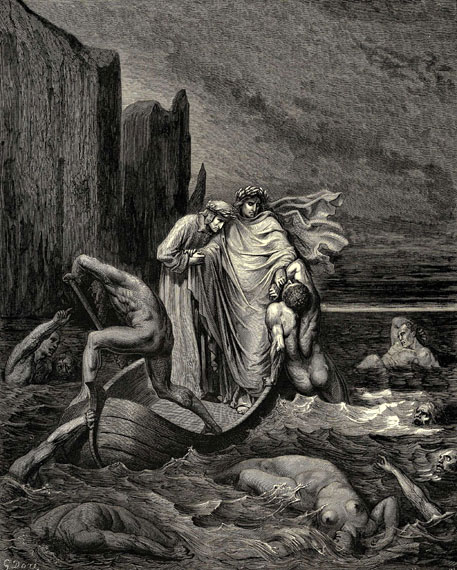
While we our course o'er the dead channel held.
One drench'd in mire before me came, and said;
"Who art thou, that thou comest ere thine hour?"
I answer'd: "Though I come, I tarry not;
But who art thou, that art become so foul?"
"One, as thou seest, who mourn: " he straight replied.
To which I thus: " In mourning and in woe,
Curs'd spirit! tarry thou. I know thee well,
E'en thus in filth disguis'd." Then stretch'd he forth
Hands to the bark; whereof my teacher sage
Aware, thrusting him back: "Away! down there
To the' other dogs!" then, with his arms my neck
Encircling, kiss'd my cheek, and spake: "O soul
Justly disdainful! blest was she in whom
Thou was conceiv'd! He in the world was one
For arrogance noted; to his memory
No virtue lends its lustre; even so
Here is his shadow furious. There above
How many now hold themselves mighty kings
Who here like swine shall wallow in the mire,
Leaving behind them horrible dispraise!"
Inferno - Canto 8, lines 74-128
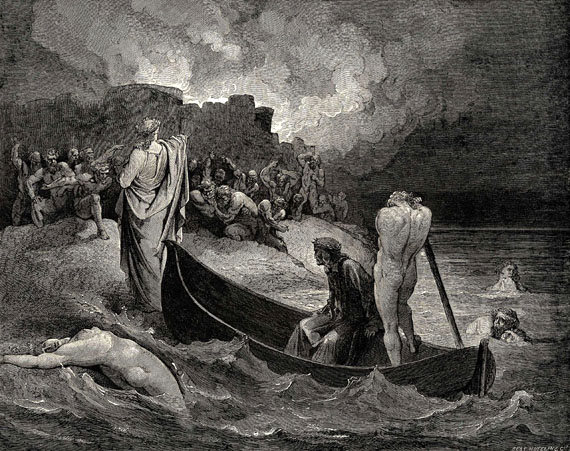
We came within the fosses deep, that moat
This region comfortless. The walls appear'd
As they were fram'd of iron. We had made
Wide circuit, ere a place we reach'd, where loud
The mariner cried vehement: "Go forth!
The' entrance is here!" Upon the gates I spied
More than a thousand, who of old from heaven
Were hurl'd. With ireful gestures, "Who is this,"
They cried, "that without death first felt, goes through
The regions of the dead?" My sapient guide
Made sign that he for secret parley wish'd;
Whereat their angry scorn abating, thus
They spake: "Come thou alone; and let him go
Who hath so hardily enter'd this realm.
Alone return he by his witless way;
If well he know it, let him prove. For thee,
Here shalt thou tarry, who through clime so dark
Hast been his escort." Now bethink thee, reader!
What cheer was mine at sound of those curs'd words.
I did believe I never should return.
"O my lov'd guide! who more than seven times
Security hast render'd me, and drawn
From peril deep, whereto I stood expos'd,
Desert me not," I cried, "in this extreme.
And if our onward going be denied,
Together trace we back our steps with speed."
My liege, who thither had conducted me,
Replied: "Fear not: for of our passage none
Hath power to disappoint us, by such high
Authority permitted. But do thou
Expect me here; meanwhile thy wearied spirit
Comfort, and feed with kindly hope, assur'd
I will not leave thee in this lower world."
This said, departs the sire benevolent,
And quits me. Hesitating I remain
At war 'twixt will and will not in my thoughts.
I could not hear what terms he offer'd them,
But they conferr'd not long, for all at once
To trial fled within. Clos'd were the gates
By those our adversaries on the breast
Of my liege lord: excluded he return'd
To me with tardy steps. Upon the ground
His eyes were bent, and from his brow eras'd
All confidence, while thus with sighs he spake:
"Who hath denied me these abodes of woe?"
Then thus to me: "That I am anger'd, think
No ground of terror: in this trial I
Shall vanquish, use what arts they may within
For hindrance. This their insolence, not new,
Erewhile at gate less secret they display'd,
Which still is without bolt; upon its arch
Thou saw'st the deadly scroll: and even now
On this side of its entrance, down the steep,
Passing the circles, unescorted, comes
One whose strong might can open us this land."
Inferno - Canto 9, lines 38-64
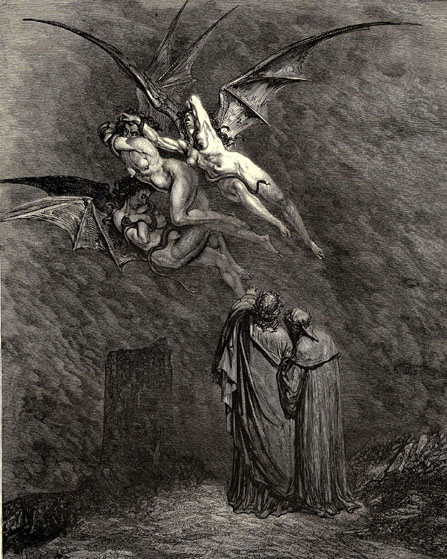
Where in an instant I beheld uprisen
At once three hellish furies stain'd with blood:
In limb and motion feminine they seem'd;
Around them greenest hydras twisting roll'd
Their volumes; adders and cerastes crept
Instead of hair, and their fierce temples bound.
He knowing well the miserable hags
Who tend the queen of endless woe, thus spake:
"Mark thou each dire Erinnys. To the left
This is Megaera; on the right hand she,
Who wails, Alecto; and Tisiphone
I' th' midst." This said, in silence he remain'd
Their breast they each one clawing tore; themselves
Smote with their palms, and such shrill clamour rais'd,
That to the bard I clung, suspicion-bound.
"Hasten Medusa: so to adamant
Him shall we change;" all looking down exclaim'd.
"E'en when by Theseus' might assail'd, we took
No ill revenge." "Turn thyself round, and keep
Thy count'nance hid; for if the Gorgon dire
Be shown, and thou shouldst view it, thy return
Upwards would be for ever lost." This said,
Himself my gentle master turn'd me round,
Nor trusted he my hands, but with his own
He also hid me. Ye of intellect
Sound and entire, mark well the lore conceal'd
Under close texture of the mystic strain!
Inferno - Canto 9, lines 73-98
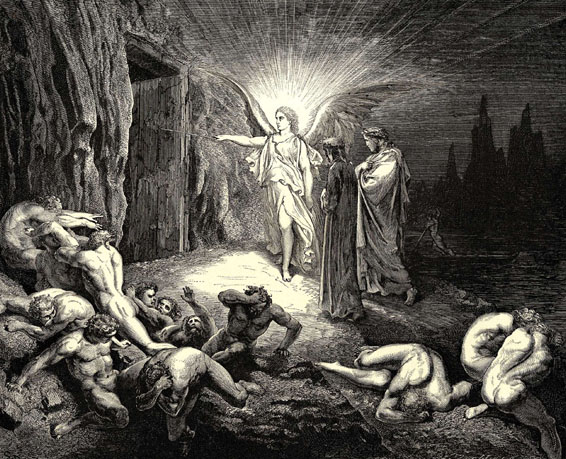
Mine eyes he loos'd, and spake: "And now direct
Thy visual nerve along that ancient foam,
There, thickest where the smoke ascends." As frogs
Before their foe the serpent, through the wave
Ply swiftly all, till at the ground each one
Lies on a heap; more than a thousand spirits
Destroy'd, so saw I fleeing before one
Who pass'd with unwet feet the Stygian sound.
He, from his face removing the gross air,
Oft his left hand forth stretch'd, and seem'd alone
By that annoyance wearied. I perceiv'd
That he was sent from heav'n, and to my guide
Turn'd me, who signal made that I should stand
Quiet, and bend to him. Ah me! how full
Of noble anger seem'd he! To the gate
He came, and with his wand touch'd it, whereat
Open without impediment it flew.
"Outcasts of heav'n! O abject race and scorn'd!"
Began he on the horrid grunsel standing,
"Whence doth this wild excess of insolence
Lodge in you? wherefore kick you 'gainst that will
Ne'er frustrate of its end, and which so oft
Hath laid on you enforcement of your pangs?
What profits at the fays to but the horn?
Your Cerberus, if ye remember, hence
Bears still, peel'd of their hair, his throat and maw."
Inferno - Canto 9, lines 111-131
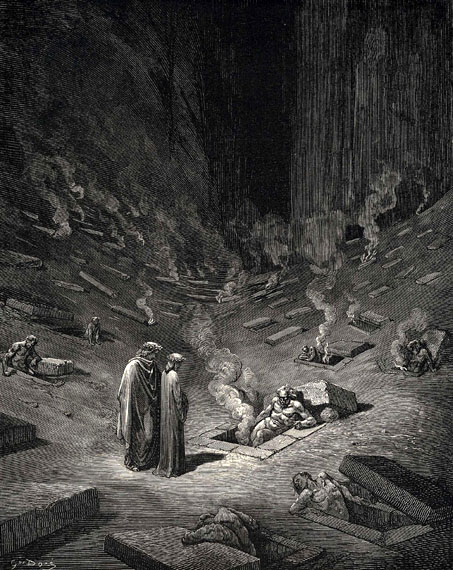
As where Rhone stagnates on the plains of Arles,
Or as at Pola, near Quarnaro's gulf,
That closes Italy and laves her bounds,
The place is all thick spread with sepulchres;
So was it here, save what in horror here
Excell'd: for 'midst the graves were scattered flames,
Wherewith intensely all throughout they burn'd,
That iron for no craft there hotter needs.
Their lids all hung suspended, and beneath
From them forth issu'd lamentable moans,
Such as the sad and tortur'd well might raise.
I thus: "Master! say who are these, interr'd
Within these vaults, of whom distinct we hear
The dolorous sighs?" He answer thus return'd:
"The arch-heretics are here, accompanied
By every sect their followers; and much more,
Than thou believest, tombs are freighted: like
With like is buried; and the monuments
Are different in degrees of heat. "This said,
He to the right hand turning, on we pass'd
Betwixt the afflicted and the ramparts high.
Inferno - Canto 10, lines 25-42
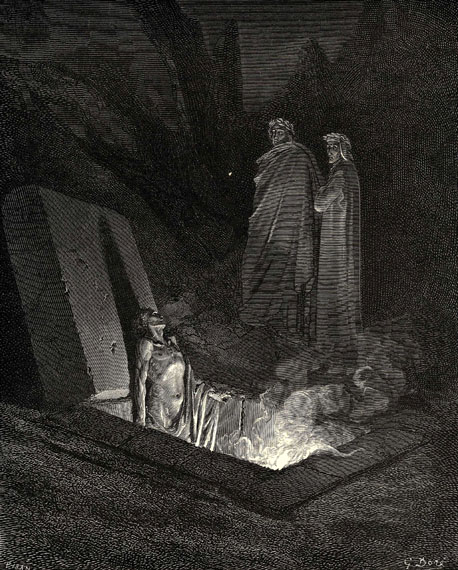
"O Tuscan! thou who through the city of fire
Alive art passing, so discreet of speech!
Here please thee stay awhile. Thy utterance
Declares the place of thy nativity
To be that noble land, with which perchance
I too severely dealt." Sudden that sound
Forth issu'd from a vault, whereat in fear
I somewhat closer to my leader's side
Approaching, he thus spake: "What dost thou? Turn.
Lo, Farinata, there! who hath himself
Uplifted: from his girdle upwards all
Expos'd behold him." On his face was mine
Already fix'd; his breast and forehead there
Erecting, seem'd as in high scorn he held
E'en hell. Between the sepulchres to him
My guide thrust me with fearless hands and prompt,
This warning added: "See thy words be clear!"
He, soon as there I stood at the tomb's foot,
Ey'd me a space, then in disdainful mood
Address'd me: "Say, what ancestors were thine?"
Inferno - Canto 11, lines 1-22
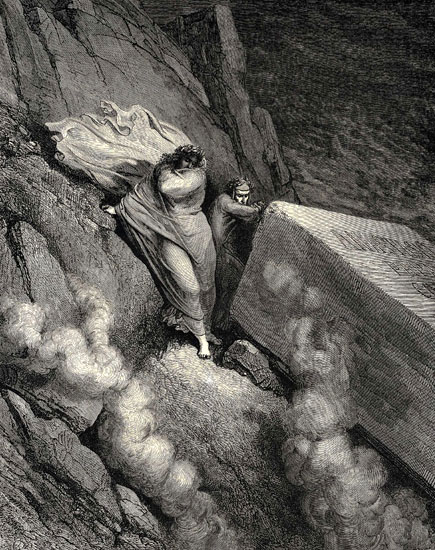
UPON the utmost verge of a high bank,
By craggy rocks environ'd round, we came,
Where woes beneath more cruel yet were stow'd:
And here to shun the horrible excess
Of fetid exhalation, upward cast
From the profound abyss, behind the lid
Of a great monument we stood retir'd,
Whereon this scroll I mark'd: "I have in charge
Pope Anastasius, whom Photinus drew
From the right path. - Ere our descent behooves
We make delay, that somewhat first the sense,
To the dire breath accustom'd, afterward
Regard it not." My master thus; to whom
Answering I spake: "Some compensation find
That the time past not wholly lost." He then:
"Lo! how my thoughts e'en to thy wishes tend!
My son! within these rocks," he thus began,
"Are three close circles in gradation plac'd,
As these which now thou leav'st. Each one is full
Of spirits accurs'd; but that the sight alone
Hereafter may suffice thee, listen how
And for what cause in durance they abide.
Inferno - Canto 12, lines 1-20
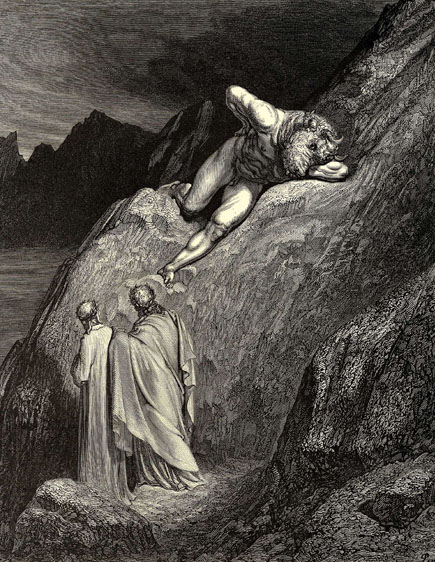
THE place where to descend the precipice
We came, was rough as Alp, and on its verge
Such object lay, as every eye would shun.
As is that ruin, which Adice's stream
On this side Trento struck, should'ring the wave,
Or loos'd by earthquake or for lack of prop;
For from the mountain's summit, whence it mov'd
To the low level, so the headlong rock
Is shiver'd, that some passage it might give
To him who from above would pass; e'en such
Into the chasm was that descent: and there
At point of the disparted ridge lay stretch'd
The infamy of Crete, detested brood
Of the feign'd heifer: and at sight of us
It gnaw'd itself, as one with rage distract.
To him my guide exclaim'd: "Perchance thou deem'st
The King of Athens here, who, in the world
Above, thy death contriv'd. Monster! avaunt!
He comes not tutor'd by thy sister's art,
But to behold your torments is he come."
Inferno - Canto 12, lines 29-40
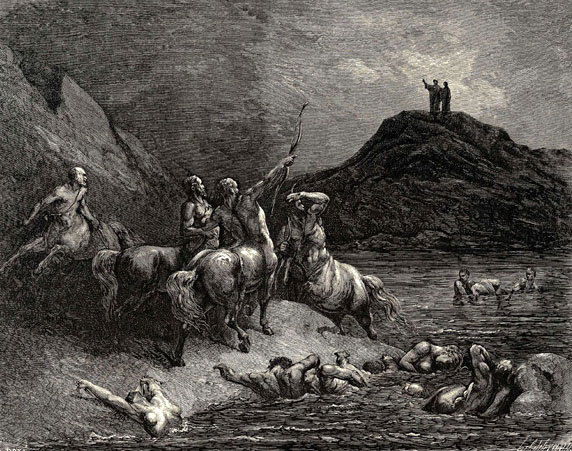
I beheld
An ample foss, that in a bow was bent,
As circling all the plain; for so my guide
Had told. Between it and the rampart's base
On trail ran Centaurs, with keen arrows arm'd,
As to the chase they on the earth were wont.
At seeing us descend they each one stood;
And issuing from the troop, three sped with bows
And missile weapons chosen first; of whom
One cried from far: "Say to what pain ye come
Condemn'd, who down this steep have journied? Speak
From whence ye stand, or else the bow I draw."
Inferno - Canto 12, lines 64-94
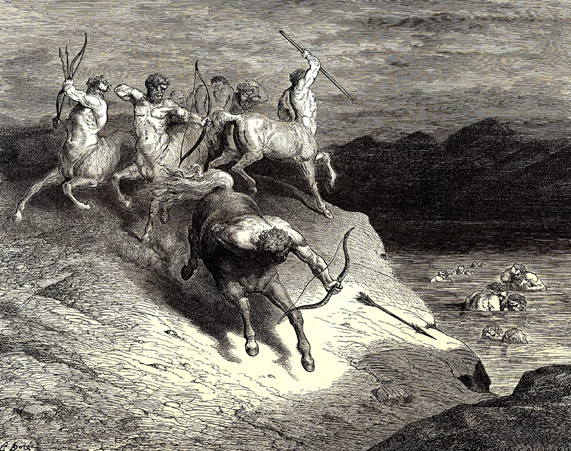
Then me he touch'd, and spake: "Nessus is this,
Who for the fair Deianira died,
And wrought himself revenge for his own fate.
He in the midst, that on his breast looks down,
Is the great Chiron who Achilles nurs'd;
That other Pholus, prone to wrath." Around
The foss these go by thousands, aiming shafts
At whatsoever spirit dares emerge
From out the blood, more than his guilt allows.
We to those beasts, that rapid strode along,
Drew near, when Chiron took an arrow forth,
And with the notch push'd back his shaggy beard
To the cheek-bone, then his great mouth to view
Exposing, to his fellows thus exclaim'd:
"Are ye aware, that he who comes behind
Moves what he touches? The feet of the dead
Are not so wont." My trusty guide, who now
Stood near his breast, where the two natures join,
Thus made reply: "He is indeed alive,
And solitary so must needs by me
Be shown the gloomy vale, thereto induc'd
By strict necessity, not by delight.
She left her joyful harpings in the sky,
Who this new office to my care consign'd.
He is no robber, no dark spirit I.
But by that virtue, which empowers my step
To treat so wild a path, grant us, I pray,
One of thy band, whom we may trust secure,
Who to the ford may lead us, and convey
Across, him mounted on his back; for he
Is not a spirit that may walk the air."
Inferno - Canto 13, lines 1-17
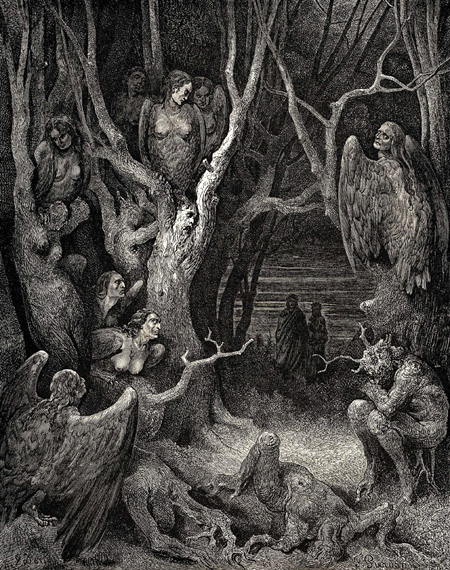
ERE Nessus yet had reach'd the other bank,
We enter'd on a forest, where no track
Of steps had worn a way. Not verdant there
The foliage, but of dusky hue; not light
The boughs and tapering, but with knares deform'd
And matted thick: fruits there were none, but thorns
Instead, with venom fill'd. Less sharp than these,
Less intricate the brakes, wherein abide
Those animals, that hate the cultur'd fields,
Betwixt Corneto and Cecina's stream.
Here the brute Harpies make their nest, the same
Who from the Strophades the Trojan band
Drove with dire boding of their future woe.
Broad are their pennons, of the human form
Their neck and count'nance, arm'd with talons keen
The feet, and the huge belly fledge with wings
These sit and wail on the drear mystic wood.
Inferno - Canto 13, lines 18-46
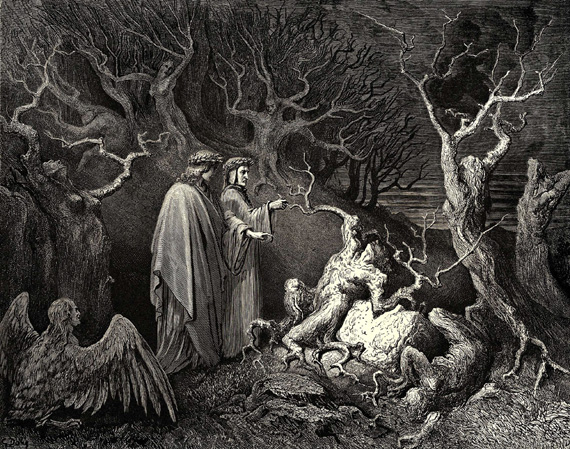
The kind instructor in these words began:
"Ere farther thou proceed, know thou art now
I' th' second round, and shalt be, till thou come
Upon the horrid sand: look therefore well
Around thee, and such things thou shalt behold,
As would my speech discredit." On all sides
I heard sad plainings breathe, and none could see
From whom they might have issu'd. In amaze
Fast bound I stood. He, as it seem'd, believ'd,
That I had thought so many voices came
From some amid those thickets close conceal'd,
And thus his speech resum'd: "If thou lop off
A single twig from one of those ill plants,
The thought thou hast conceiv'd shall vanish quite."
Thereat a little stretching forth my hand,
From a great wilding gather'd I a branch,
And straight the trunk exclaim'd: "Why pluck'st thou me?"
Then as the dark blood trickled down its side,
These words it added: "Wherefore tear'st me thus?
Is there no touch of mercy in thy breast?
Men once were we, that now are rooted here.
Thy hand might well have spar'd us, had we been
The souls of serpents." As a brand yet green,
That burning at one end from the' other sends
A groaning sound, and hisses with the wind
That forces out its way, so burst at once,
Forth from the broken splinter words and blood.
Inferno - Canto 13, lines 112-136
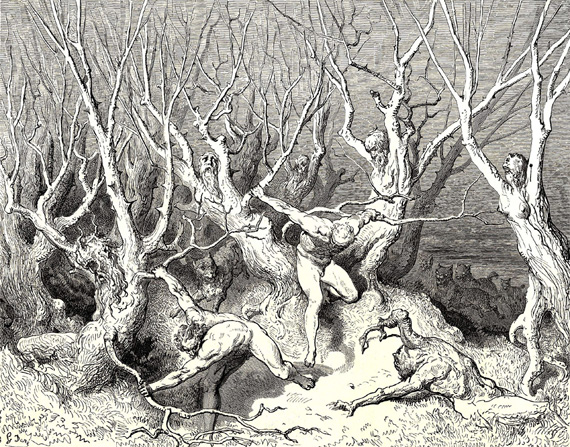
Attentive yet to listen to the trunk
We stood, expecting farther speech, when us
A noise surpris'd, as when a man perceives
The wild boar and the hunt approach his place
Of station'd watch, who of the beasts and boughs
Loud rustling round him hears. And lo! there came
Two naked, torn with briers, in headlong flight,
That they before them broke each fan o' th' wood.
"Haste now," the foremost cried, "now haste thee death!"
The' other, as seem'd, impatient of delay
Exclaiming, "Lano! not so bent for speed
Thy sinews, in the lists of Toppo's field."
And then, for that perchance no longer breath
Suffic'd him, of himself and of a bush
One group he made. Behind them was the wood
Full of black female mastiffs, gaunt and fleet,
As greyhounds that have newly slipp'd the leash.
On him, who squatted down, they stuck their fangs,
And having rent him piecemeal bore away
The tortur'd limbs. My guide then seiz'd my hand,
And led me to the thicket, which in vain
Mourn'd through its bleeding wounds: "O Giacomo
Of Sant' Andrea! what avails it thee,"
It cried, "that of me thou hast made thy screen?
For thy ill life what blame on me recoils?"
Inferno - Canto 14, lines 16-45
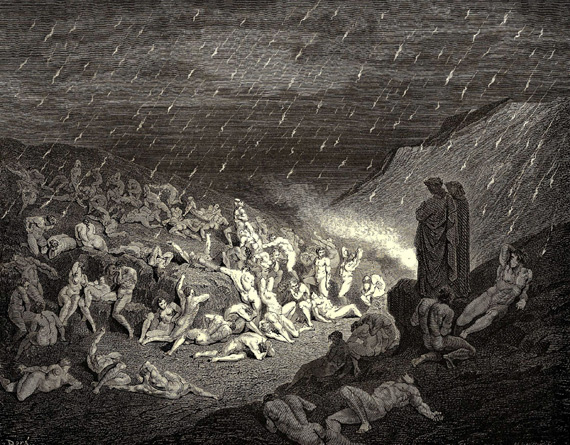
Vengeance of Heav'n! Oh ! how shouldst thou be fear'd
By all, who read what here my eyes beheld!
Of naked spirits many a flock I saw,
All weeping piteously, to different laws
Subjected: for on the' earth some lay supine,
Some crouching close were seated, others pac'd
Incessantly around; the latter tribe,
More numerous, those fewer who beneath
The torment lay, but louder in their grief.
O'er all the sand fell slowly wafting down
Dilated flakes of fire, as flakes of snow
On Alpine summit, when the wind is hush'd.
As in the torrid Indian clime, the son
Of Ammon saw upon his warrior band
Descending, solid flames, that to the ground
Came down: whence he bethought him with his troop
To trample on the soil; for easier thus
The vapour was extinguish'd, while alone;
So fell the eternal fiery flood, wherewith
The marble glow'd underneath, as under stove
The viands, doubly to augment the pain.
Unceasing was the play of wretched hands,
Now this, now that way glancing, to shake off
The heat, still falling fresh. I thus began:
"Instructor! thou who all things overcom'st,
Except the hardy demons, that rush'd forth
To stop our entrance at the gate, say who
Is yon huge spirit, that, as seems, heeds not
The burning, but lies writhen in proud scorn,
As by the sultry tempest immatur'd?"
Inferno - Canto 15, lines 21-42
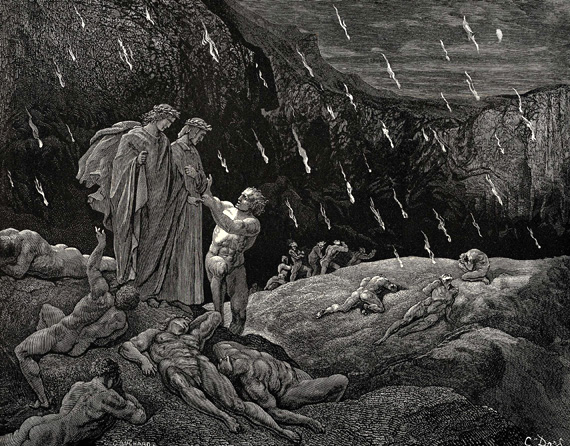
Thus narrowly explor'd by all the tribe,
I was agniz'd of one, who by the skirt
Caught me, and cried, "What wonder have we here!"
And I, when he to me outstretch'd his arm,
Intently fix'd my ken on his parch'd looks,
That although smirch'd with fire, they hinder'd not
But I remember'd him; and towards his face
My hand inclining, answer'd: "Sir! Brunetto!
And art thou here?" He thus to me: "My son!
Oh let it not displease thee, if Brunetto
Latini but a little space with thee
Turn back, and leave his fellows to proceed."
I thus to him replied: "Much as I can,
I thereto pray thee; and if thou be willing,
That I here seat me with thee, I consent;
His leave, with whom I journey, first obtain'd."
"O son!" said he, " whoever of this throng
One instant stops, lies then a hundred years,
No fan to ventilate him, when the fire
Smites sorest. Pass thou therefore on. I close
Will at thy garments walk, and then rejoin
My troop, who go mourning their endless doom."
Inferno - Canto 17, lines 1-28
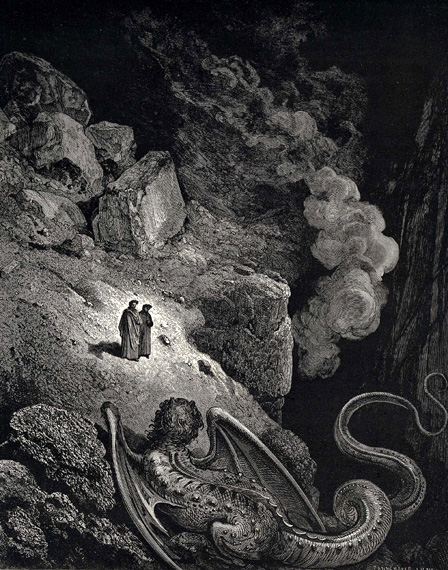
"LO! the fell monster with the deadly sting!
Who passes mountains, breaks through fenced walls
And firm embattled spears, and with his filth
Taints all the world!" Thus me my guide address'd,
And beckon'd him, that he should come to shore,
Near to the stony causeway's utmost edge.
Forthwith that image vile of fraud appear'd,
His head and upper part expos'd on land,
But laid not on the shore his bestial train.
His face the semblance of a just man's wore,
So kind and gracious was its outward cheer;
The rest was serpent all: two shaggy claws
Reach'd to the armpits, and the back and breast,
And either side, were painted o'er with nodes
And orbits. Colours variegated more
Nor Turks nor Tartars e'er on cloth of state
With interchangeable embroidery wove,
Nor spread Arachne o'er her curious loom.
As ofttimes a light skiff, moor'd to the shore,
Stands part in water, part upon the land;
Or, as where dwells the greedy German boor,
The beaver settles watching for his prey;
So on the rim, that fenc'd the sand with rock,
Sat perch'd the fiend of evil. In the void
Glancing, his tail upturn'd its venomous fork,
With sting like scorpion's arm'd. Then thus my guide:
"Now need our way must turn few steps apart,
Far as to that ill beast, who couches there."
Inferno - Canto 17, lines 86-122
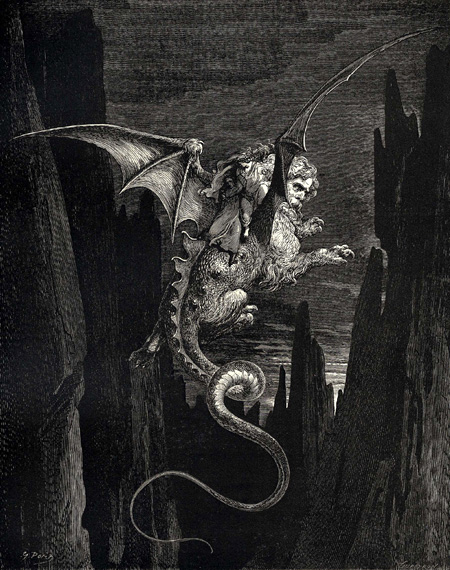
I settled me upon those shoulders huge,
And would have said, but that the words to aid
My purpose came not, "Look thou clasp me firm!"
But he whose succour then not first I prov'd,
Soon as I mounted, in his arms aloft,
Embracing, held me up, and thus he spake:
"Geryon! now move thee! be thy wheeling gyres
Of ample circuit, easy thy descent.
Think on th' unusual burden thou sustain'st."
As a small vessel, back'ning out from land,
Her station quits; so thence the monster loos'd,
And when he felt himself at large, turn'd round
There where the breast had been, his forked tail.
Thus, like an eel, outstretch'd at length he steer'd,
Gath'ring the air up with retractile claws.
Not greater was the dread when Phaeton
The reins let drop at random, whence high heaven,
Whereof signs yet appear, was wrapt in flames;
Nor when ill-fated Icarus perceiv'd,
By liquefaction of the scalded wax,
The trusted pennons loosen'd from his loins,
His sire exclaiming loud, "Ill way thou keep'st!"
Than was my dread, when round me on each part
The air I view'd, and other object none
Save the fell beast. He slowly sailing, wheels
His downward motion, unobserv'd of me,
But that the wind, arising to my face,
Breathes on me from below. Now on our right
I heard the cataract beneath us leap
With hideous crash; whence bending down to' explore,
New terror I conceiv'd at the steep plunge:
For flames I saw, and wailings smote mine ear:
So that all trembling close I crouch'd my limbs,
And then distinguish'd, unperceiv'd before,
By the dread torments that on every side
Drew nearer, how our downward course we wound
Inferno - Canto 18, lines 23-39
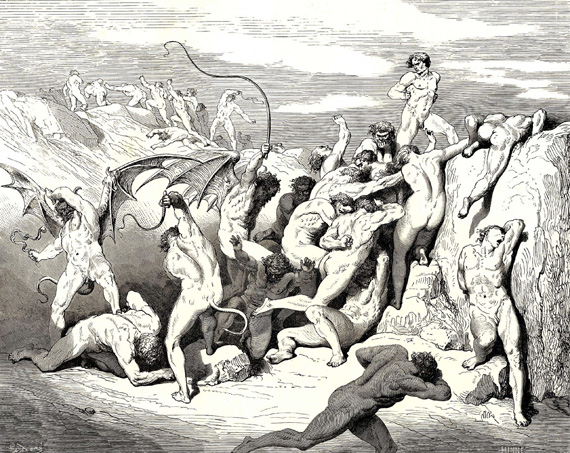
On our right hand new misery I saw,
New pains, new executioners of wrath,
That swarming peopled the first chasm. Below
Were naked sinners. Hitherward they came,
Meeting our faces from the middle point,
With us beyond but with a larger stride.
E'en thus the Romans, when the year returns
Of Jubilee, with better speed to rid
The thronging multitudes, their means devise
For such as pass the bridge; that on one side
All front toward the castle, and approach
Saint Peter's fane, on th' other towards the mount.
Each divers way along the grisly rock,
Horn'd demons I beheld, with lashes huge,
That on their back unmercifully smote.
Ah! how they made them bound at the first stripe!
None for the second waited nor the third.
Inferno - Canto 18, lines 107-121
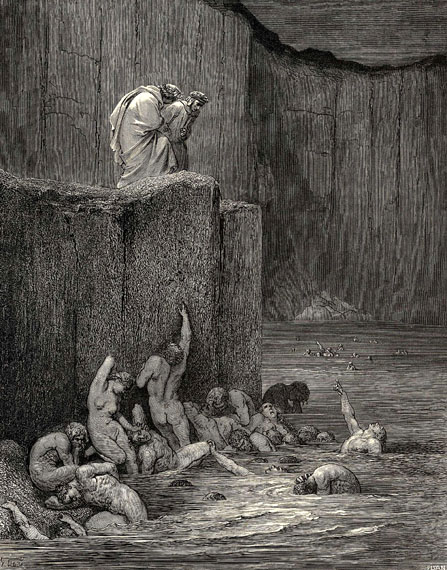
So hollow is the depth, that from no part,
Save on the summit of the rocky span,
Could I distinguish aught. Thus far we came;
And thence I saw, within the foss below,
A crowd immers'd in ordure, that appear'd
Draff of the human body. There beneath
Searching with eye inquisitive, I mark'd
One with his head so grim'd, 't were hard to deem,
If he were clerk or layman. Loud he cried:
"Why greedily thus bendest more on me,
Than on these other filthy ones, thy ken?"
"Because if true my mem'ry," I replied,
"I heretofore have seen thee with dry locks,
And thou Alessio art of Lucca sprung.
Therefore than all the rest I scan thee more."
Inferno - Canto 18, lines 125-133
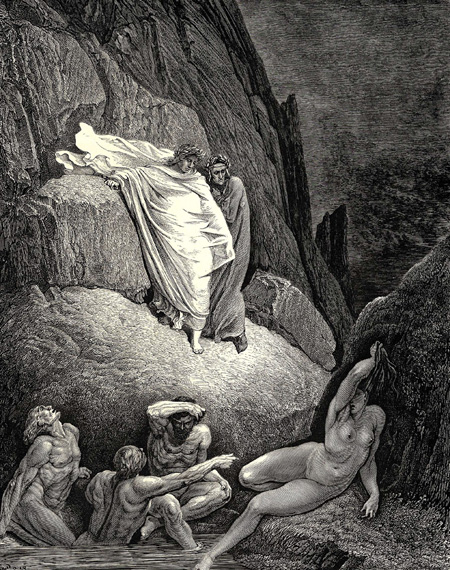
My leader thus: "A little further stretch
Thy face, that thou the visage well mayst note
Of that besotted, sluttish courtezan,
Who there doth rend her with defiled nails,
Now crouching down, now risen on her feet.
Thais is this, the harlot, whose false lip
Answer'd her doting paramour that ask'd,
'Thankest me much!' - 'Say rather wondrously,'
And seeing this here satiate be our view."
Inferno - Canto 19, lines 1-12
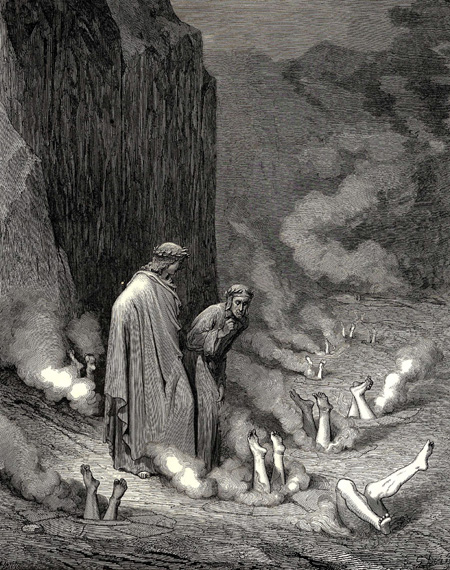
Thereat on the fourth pier we came, we turn'd,
And on our left descended to the depth,
A narrow strait and perforated close.
Nor from his side my leader set me down,
Till to his orifice he brought, whose limb
Quiv'ring express'd his pang. "Whoe'er thou art,
Sad spirit! thus revers'd, and as a stake
Driv'n in the soil!" I in these words began,
"If thou be able, utter forth thy voice."
There stood I like the friar, that doth shrive
A wretch for murder doom'd, who e'en when fix'd,
Calleth him back, whence death awhile delays.
Inferno - Canto 21, lines 36-56
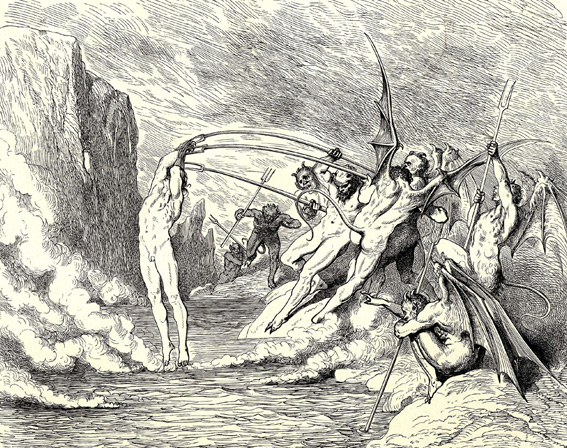
"Ye of our bridge!" he cried, "keen-talon'd fiends!
Lo! one of Santa Zita's elders! Him
Whelm ye beneath, while I return for more.
That land hath store of such. All men are there,
Except Bonturo, barterers: of 'no'
For lucre there an 'aye' is quickly made."
Him dashing down, o'er the rough rock he turn'd,
Nor ever after thief a mastiff loos'd
Sped with like eager haste. That other sank
And forthwith writing to the surface rose.
But those dark demons, shrouded by the bridge,
Cried "Here the hallow'd visage saves not: here
Is other swimming than in Serchio's wave.
Wherefore if thou desire we rend thee not,
Take heed thou mount not o'er the pitch." This said,
They grappled him with more than hundred hooks,
And shouted: "Cover'd thou must sport thee here;
So, if thou canst, in secret mayst thou filch."
E'en thus the cook bestirs him, with his grooms,
To thrust the flesh into the caldron down
With flesh-hooks, that it float not on the top.
Inferno - Canto 21, lines 57-76
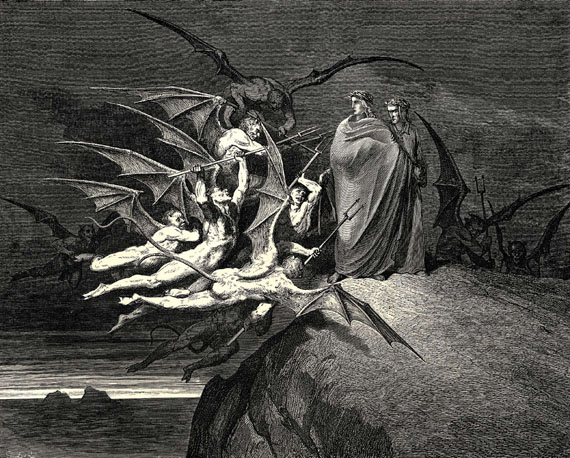
Me then my guide bespake: "Lest they descry,
That thou art here, behind a craggy rock
Bend low and screen thee; and whate'er of force
Be offer'd me, or insult, fear thou not:
For I am well advis'd, who have been erst
In the like fray." Beyond the bridge's head
Therewith he pass'd, and reaching the sixth pier,
Behov'd him then a forehead terror-proof.
With storm and fury, as when dogs rush forth
Upon the poor man's back, who suddenly
From whence he standeth makes his suit; so rush'd
Those from beneath the arch, and against him
Their weapons all they pointed. He aloud:
"Be none of you outrageous: ere your time
Dare seize me, come forth from amongst you one,
Who having heard my words, decide he then
If he shall tear these limbs." They shouted loud,
"Go, Malacoda!" Whereat one advanc'd,
The others standing firm, and as he came,
"What may this turn avail him?" he exclaim'd.
Inferno - Canto 22, lines 118-136
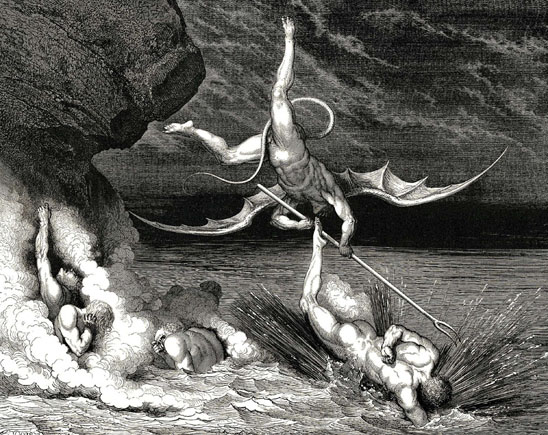
Now, reader, of new sport expect to hear!
They each one turn'd his eyes to the' other shore,
He first, who was the hardest to persuade.
The spirit of Navarre chose well his time,
Planted his feet on land, and at one leap
Escaping disappointed their resolve.
Them quick resentment stung, but him the most,
Who was the cause of failure; in pursuit
He therefore sped, exclaiming; "Thou art caught."
But little it avail'd: terror outstripp'd
His following flight: the other plung'd beneath,
And he with upward pinion rais'd his breast:
E'en thus the water-fowl, when she perceives
The falcon near, dives instant down, while he
Enrag'd and spent retires. That mockery
In Calcabrina fury stirr'd, who flew
After him, with desire of strife inflam'd;
And, for the barterer had 'scap'd, so turn'd
His talons on his comrade.
Inferno - Canto 22, lines 136-148
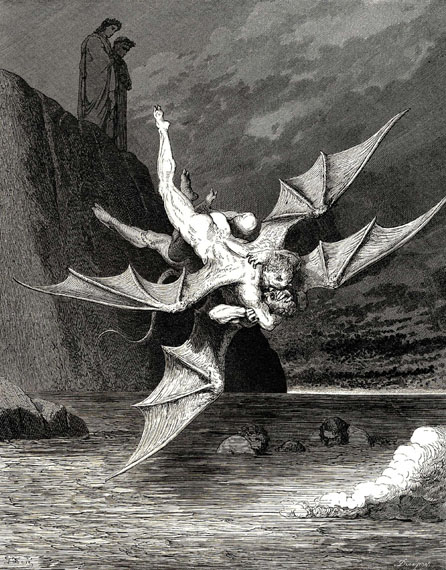
O'er the dyke
In grapple close they join'd; but the' other prov'd
A goshawk able to rend well his foe;
And in the boiling lake both fell. The heat
Was umpire soon between them, but in vain
To lift themselves they strove, so fast were glued
Their pennons. Barbariccia, as the rest,
That chance lamenting, four in flight dispatch'd
From the' other coast, with all their weapons arm'd.
They, to their post on each side speedily
Descending, stretch'd their hooks toward the fiends,
Who flounder'd, inly burning from their scars:
And we departing left them to that broil.
Inferno - Canto 23, lines 47-57
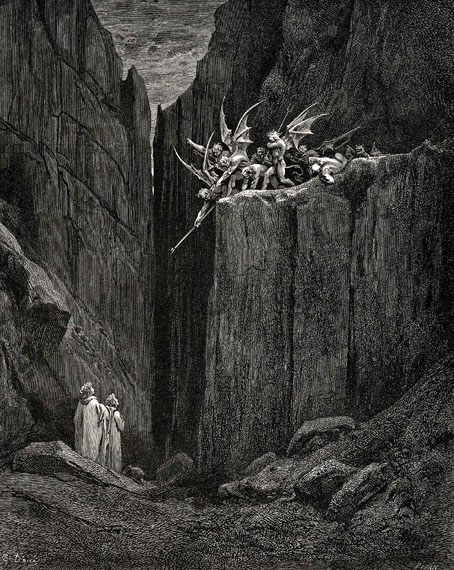
Never ran water with such hurrying pace
Adown the tube to turn a landmill's wheel,
When nearest it approaches to the spokes,
As then along that edge my master ran,
Carrying me in his bosom, as a child,
Not a companion. Scarcely had his feet
Reach'd to the lowest of the bed beneath,
When over us the steep they reach'd; but fear
In him was none; for that high Providence,
Which plac'd them ministers of the fifth foss,
Power of departing thence took from them all.
Inferno - Canto 23, lines 86-110
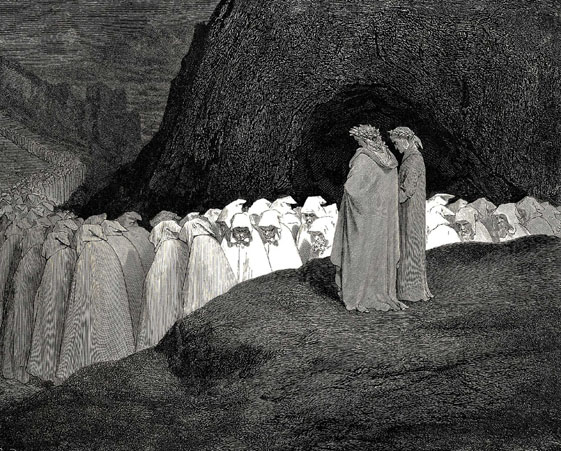
Soon as arriv'd, they with an eye askance
Perus'd me, but spake not: then turning each
To other thus conferring said: "This one
Seems, by the action of his throat, alive.
And, be they dead, what privilege allows
They walk unmantled by the cumbrous stole?"
Then thus to me: "Tuscan, who visitest
The college of the mourning hypocrites,
Disdain not to instruct us who thou art."
"By Arno's pleasant stream," I thus replied,
"In the great city I was bred and grew,
And wear the body I have ever worn.
but who are ye, from whom such mighty grief,
As now I witness, courseth down your cheeks?
What torment breaks forth in this bitter woe?"
"Our bonnets gleaming bright with orange hue,"
One of them answer'd, "are so leaden gross,
That with their weight they make the balances
To crack beneath them. Joyous friars we were,
Bologna's natives, Catalano I,
He Loderingo nam'd, and by thy land
Together taken, as men used to take
A single and indifferent arbiter,
To reconcile their strifes. How there we sped,
Gardingo's vicinage can best declare."
Inferno - Canto 23, lines 117-120
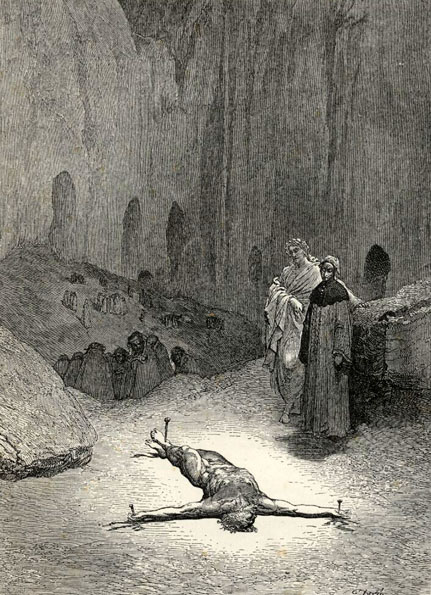
That pierced spirit, whom intent
Thou view'st, was he who gave the Pharisees
Counsel, that it were fitting for one man
To suffer for the people.
Inferno - Canto 24, lines 77-95
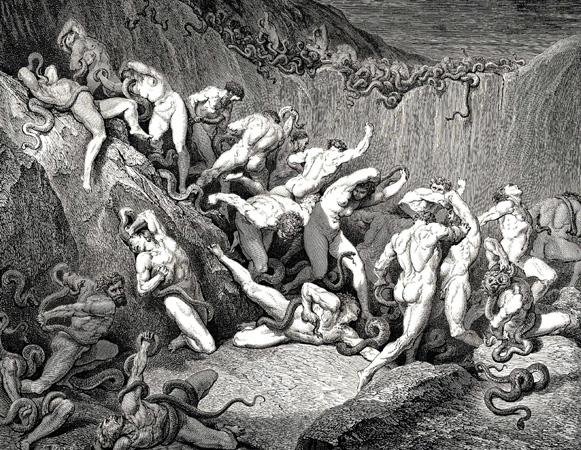
We from the bridge's head descended, where
To the eighth mound it joins, and then the chasm
Opening to view, I saw a crowd within
Of serpents terrible, so strange of shape
And hideous, that remembrance in my veins
Yet shrinks the vital current. Of her sands
Let Lybia vaunt no more: if Jaculus,
Pareas and Chelyder be her brood,
Cenchris and Amphisboena, plagues so dire
Or in such numbers swarming ne'er she shew'd,
Not with all Ethiopia, and whate'er
Above the Erythraean sea is spawn'd.
Amid this dread exuberance of woe
Ran naked spirits wing'd with horrid fear,
Nor hope had they of crevice where to hide,
Or heliotrope to charm them out of view.
With serpents were their hands behind them bound,
Which through their reins infix'd the tail and head
Twisted in folds before.
Inferno - Canto 25, lines 41-64
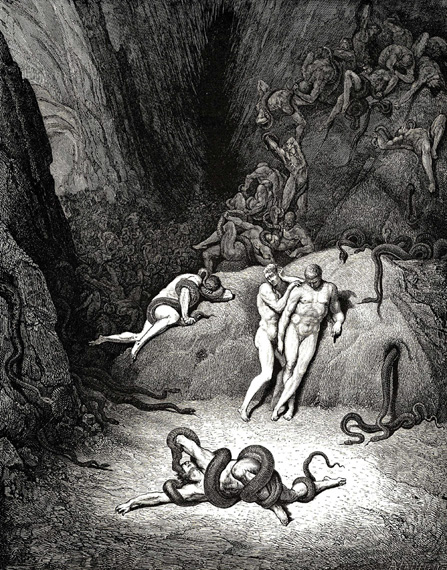
If, O reader! now
Thou be not apt to credit what I tell,
No marvel; for myself do scarce allow
The witness of mine eyes. But as I looked
Toward them, lo! a serpent with six feet
Springs forth on one, and fastens full upon him:
His midmost grasp'd the belly, a forefoot
Seiz'd on each arm (while deep in either cheek
He flesh'd his fangs); the hinder on the thighs
Were spread, 'twixt which the tail inserted curl'd
Upon the reins behind. Ivy ne'er clasp'd
A dodder'd oak, as round the other's limbs
The hideous monster intertwin'd his own.
Then, as they both had been of burning wax,
Each melted into other, mingling hues,
That which was either now was seen no more.
Thus up the shrinking paper, ere it burns,
A brown tint glides, not turning yet to black,
And the clean white expires. The other two
Look'd on exclaiming: "Ah, how dost thou change,
Agnello! See! Thou art nor double now,
Nor only one." The two heads now became
One, and two figures blended in one form
Appear'd, where both were lost.
Inferno - Canto 26, lines 44-71
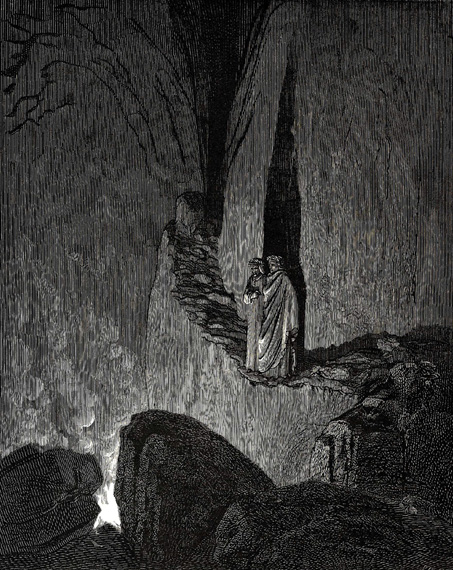
Upon the bridge I forward bent to look,
And grasp'd a flinty mass, or else had fall'n,
Though push'd not from the height. The guide, who mark'd
How I did gaze attentive, thus began:
"Within these ardours are the spirits, each
Swath'd in confining fire." - "Master, thy word,"
I answer'd, "hath assur'd me; yet I deem'd
Already of the truth, already wish'd
To ask thee, who is in yon fire, that comes
So parted at the summit, as it seem'd
Ascending from that funeral pile, where lay
The Theban brothers?" He replied: "Within
Ulysses there and Diomede endure
Their penal tortures, thus to vengeance now
Together hasting, as erewhile to wrath.
These in the flame with ceaseless groans deplore
The ambush of the horse, that open'd wide
A portal for that goodly seed to pass,
Which sow'd imperial Rome; nor less the guile
Lament they, whence of her Achilles 'reft
Deidamia yet in death complains.
And there is rued the stratagem, that Troy
Of her Palladium spoil'd." - "If they have power
Of utt'rance from within these sparks," said I,
"O master! think my prayer a thousand fold
In repetition urg'd, that thou vouchsafe
To pause, till here the horned flame arrive.
See, how toward it with desire I bend."
Inferno - Canto 28, lines 28-48
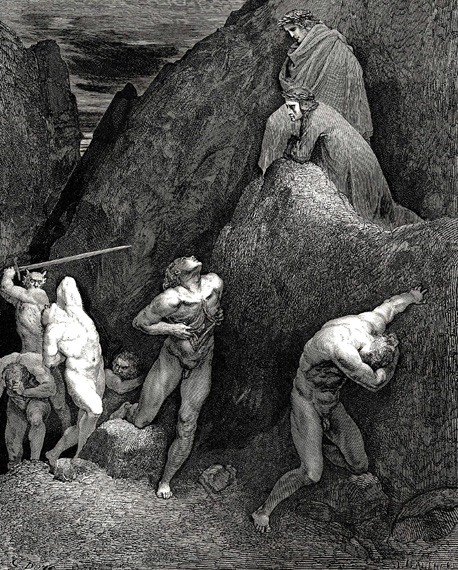
Whilst eagerly I fix on him my gaze,
He ey'd me, with his hands laid his breast bare,
And cried; "Now mark how I do rip me! lo!
How is Mohammed mangled! before me
Walks Ali weeping, from the chin his face
Cleft to the forelock; and the others all
Whom here thou seest, while they liv'd, did sow
Scandal and schism, and therefore thus are rent.
A fiend is here behind, who with his sword
Hacks us thus cruelly, slivering again
Each of this ream, when we have compast round
The dismal way, for first our gashes close
Ere we repass before him. But say who
Art thou, that standest musing on the rock,
Haply so lingering to delay the pain
Sentenc'd upon thy crimes?" - "Him death not yet,"
My guide rejoin'd, "hath overta'en, nor sin
Conducts to torment; but, that he may make
Full trial of your state, I who am dead
Must through the depths of hell, from orb to orb,
Conduct him. Trust my words, for they are true."
Inferno - Canto 28, lines 61-87
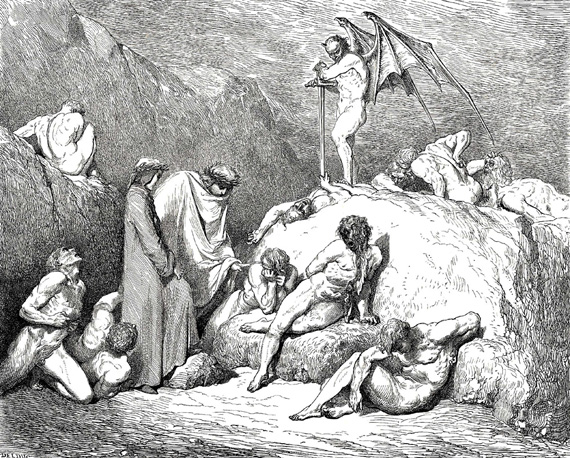
Another shade,
Pierc'd in the throat, his nostrils mutilate
E'en from beneath the eyebrows, and one ear
Lopt off, who with the rest through wonder stood
Gazing, before the rest advanc'd, and bar'd
His wind-pipe, that without was all o'ersmear'd
With crimson stain. "O thou!" said 'he, "whom sin
Condemns not, and whom erst (unless too near
Resemblance do deceive me) I aloft
Have seen on Latian ground, call thou to mind
Piero of Medicina, if again
Returning, thou behold'st the pleasant land
That from Vercelli slopes to Mercabo;
And there instruct the twain, whom Fano boasts
Her worthiest sons, Guido and Angelo,
That if 't is giv'n us here to scan aright
The future, they out of life's tenement
Shall be cast forth, and whelm'd under the waves
Near to Cattolica, through perfidy
Of a fell tyrant. 'Twixt the Cyprian isle
And Balearic, ne'er hath Neptune seen
An injury so foul, by pirates done
Or Argive crew of old. That one-ey'd traitor
(Whose realm there is a spirit here were fain
His eye had still lack'd sight of) them shall bring
To conf'rence with him, then so shape his end,
That they shall need not 'gainst Focara's wind
Offer up vow nor pray'r."
Inferno - Canto 28, lines 113-138
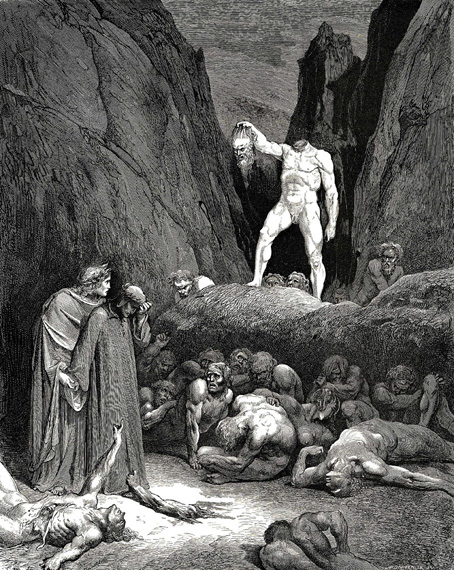
Without doubt
I saw, and yet it seems to pass before me,
A headless trunk, that even as the rest
Of the sad flock pac'd onward. By the hair
It bore the sever'd member, lantern-wise
Pendent in hand, which look'd at us and said,
"Woe's me!" The spirit lighted thus himself,
And two there were in one, and one in two.
How that may be he knows who ordereth so.
When at the bridge's foot direct he stood,
His arm aloft he rear'd, thrusting the head
Full in our view, that nearer we might hear
The words, which thus it utter'd: "Now behold
This grievous torment, thou, who breathing go'st
To spy the dead; behold if any else
Be terrible as this. And that on earth
Thou mayst bear tidings of me, know that I
Am Bertrand, he of Born, who gave King John
The counsel mischievous. Father and son
I set at mutual war. For Absalom
And David more did not Ahitophel,
Spurring them on maliciously to strife.
For parting those so closely knit, my brain
Parted, alas! I carry from its source,
That in this trunk inhabits. Thus the law
Of retribution fiercely works in me."
Inferno - Canto 29, lines 1-12
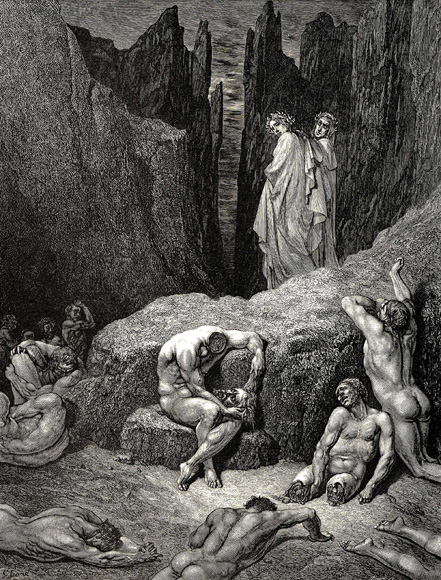
So were mine eyes inebriate with view
Of the vast multitude, whom various wounds
Disfigur'd, that they long'd to stay and weep.
But Virgil rous'd me: "What yet gazest on?
Wherefore doth fasten yet thy sight below
Among the maim'd and miserable shades?
Thou hast not shewn in any chasm beside
This weakness. Know, if thou wouldst number them
That two and twenty miles the valley winds
Its circuit, and already is the moon
Beneath our feet: the time permitted now
Is short, and more not seen remains to see."
Inferno - Canto 29, lines 51-68
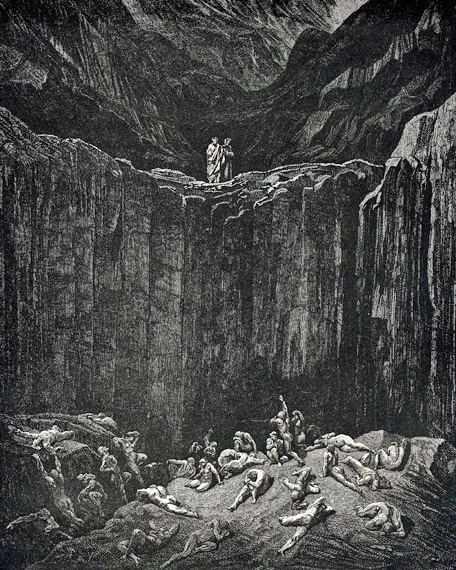
We on the utmost shore of the long rock
Descended still to leftward. Then my sight
Was livelier to explore the depth, wherein
The minister of the most mighty Lord,
All-searching Justice, dooms to punishment
The forgers noted on her dread record.
More rueful was it not methinks to see
The nation in Aegina droop, what time
Each living thing, e'en to the little worm,
All fell, so full of malice was the air
(And afterward, as bards of yore have told,
The ancient people were restor'd anew
From seed of emmets) than was here to see
The spirits, that languish'd through the murky vale
Up-pil'd on many a stack. Confus'd they lay,
One o'er the belly, o'er the shoulders one
Roll'd of another; sideling crawl'd a third
Along the dismal pathway.
Inferno - Canto 29, lines 68-87

Step by step
We journey'd on, in silence looking round
And list'ning those diseas'd, who strove in vain
To lift their forms. Then two I mark'd, that sat
Propp'd 'gainst each other, as two brazen pans
Set to retain the heat. From head to foot,
A tetter bark'd them round. Nor saw I e'er
Groom currying so fast, for whom his lord
Impatient waited, or himself perchance
Tir'd with long watching, as of these each one
Plied quickly his keen nails, through furiousness
Of ne'er abated pruriency. The crust
Came drawn from underneath in flakes, like scales
Scrap'd from the bream or fish of broader mail.
"O thou, who with thy fingers rendest off
Thy coat of proof," thus spake my guide to one,
"And sometimes makest tearing pincers of them,
Tell me if any born of Latian land
Be among these within: so may thy nails
Serve thee for everlasting to this toil."
Inferno - Canto 30, lines 20-34
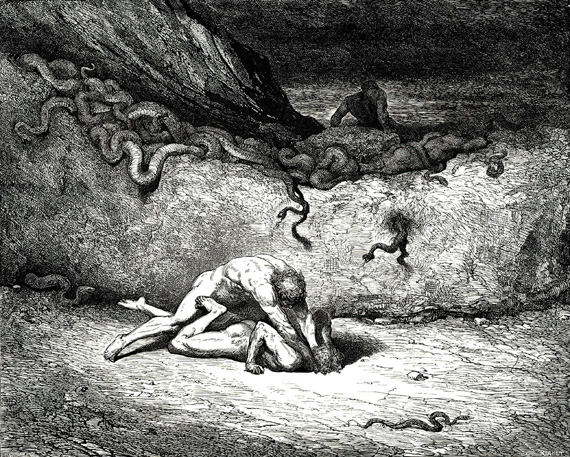
Bet ne'er the Furies or of Thebes or Troy
With such fell cruelty were seen, their goads
Infixing in the limbs of man or beast,
As now two pale and naked ghost I saw
That gnarling wildly scamper'd, like the swine
Excluded from his stye. One reach'd Capocchio,
And in the neck-joint sticking deep his fangs,
Dragg'd him, that o'er the solid pavement rubb'd
His belly stretch'd out prone. The other shape,
He of Arezzo, there left trembling, spake;
"That sprite of air is Schicchi; in like mood
Of random mischief vent he still his spite."
Inferno - Canto 30, lines 35-46
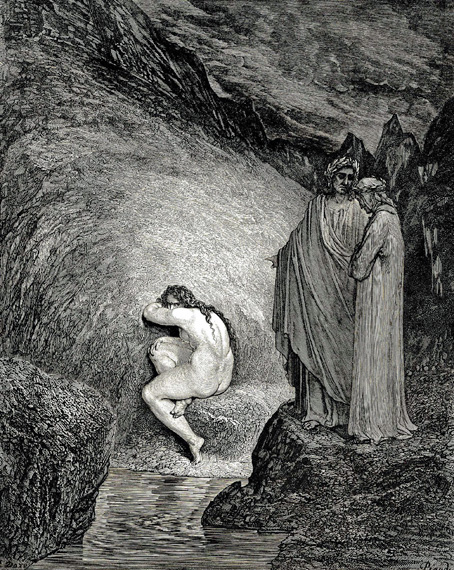
To whom I answ'ring: "Oh! as thou dost hope,
The other may not flesh its jaws on thee,
Be patient to inform us, who it is,
Ere it speed hence." - " That is the ancient soul
Of wretched Myrrha," he replied, "who burn'd
With most unholy flame for her own sire,
And a false shape assuming, so perform'd
The deed of sin; e'en as the other there,
That onward passes, dar'd to counterfeit
Donati's features, to feign'd testament
The seal affixing, that himself might gain,
For his own share, the lady of the herd."
Inferno - Canto 31, lines 34-74
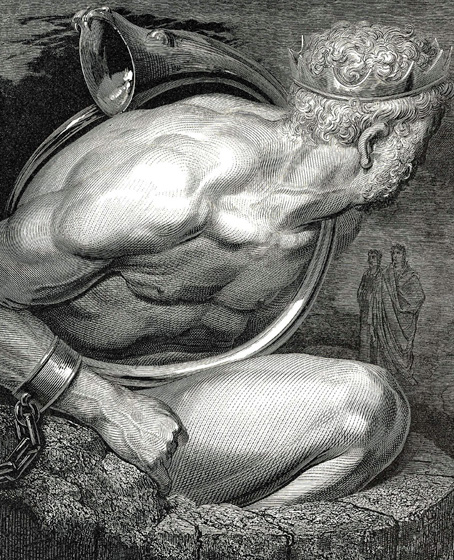
All-teeming nature, when her plastic hand
Left framing of these monsters, did display
Past doubt her wisdom, taking from mad War
Such slaves to do his bidding; and if she
Repent her not of th' elephant and whale,
Who ponders well confesses her therein
Wiser and more discreet; for when brute force
And evil will are back'd with subtlety,
Resistance none avails. His visage seem'd
In length and bulk, as doth the pine, that tops
Saint Peter's Roman fane; and th' other bones
Of like proportion, so that from above
The bank, which girdled him below, such height
Arose his stature, that three Friezelanders
Had striv'n in vain to reach but to his hair.
Full thirty ample palms was he expos'd
Downward from whence a man his garments loops.
"Raphel bai ameth sabi almi,"
So shouted his fierce lips, which sweeter hymns
Became not; and my guide address'd him thus:
"O senseless spirit! let thy horn for thee
Interpret: therewith vent thy rage, if rage
Or other passion wring thee. Search thy neck,
There shalt thou find the belt that binds it on.
Wild spirit! lo, upon thy mighty breast
Where hangs the baldrick!" Then to me he spake:
"He doth accuse himself. Nimrod is this,
Through whose ill counsel in the world no more
One tongue prevails. But pass we on, nor waste
Our words; for so each language is to him,
As his to others, understood by none."
Inferno - Canto 31, lines 75-102
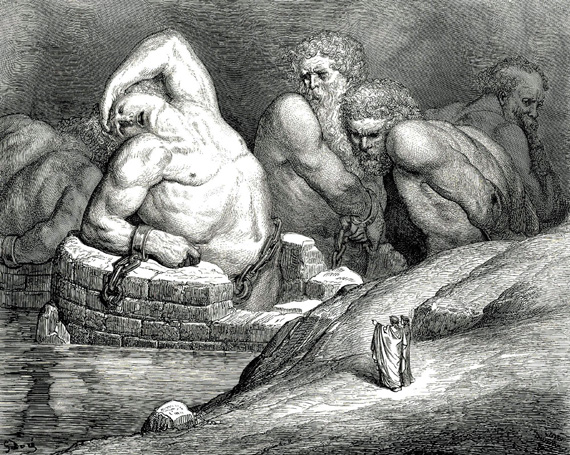
Then to the leftward turning sped we forth,
And at a sling's throw found another shade
Far fiercer and more huge. I cannot say
What master hand had girt him; but he held
Behind the right arm fetter'd, and before
The other with a chain, that fasten'd him
From the neck down, and five times round his form
Apparent met the wreathed links. "This proud one
Would of his strength against almighty Jove
Make trial," said my guide; "whence he is thus
Requited: Ephialtes him they call.
Great was his prowess, when the giants brought
Fear on the gods: those arms, which then he piled,
Now moves he never." Forthwith I return'd:
"Fain would I, if 't were possible, mine eyes
Of Briareus immeasurable gain'd
Experience next." He answer'd: "Thou shalt see
Not far from hence Antaeus, who both speaks
And is unfetter'd, who shall place us there
Where guilt is at its depth. Far onward stands
Whom thou wouldst fain behold, in chains, and made
Like to this spirit, save that in his looks
More fell he seems." By violent earthquake rock'd
Ne'er shook a tow'r, so reeling to its base,
As Ephialtes. More than ever then
I dreaded death, nor than the terror more
Had needed, if I had not seen the cords
That held him fast.
Inferno - Canto 31, lines 102-136
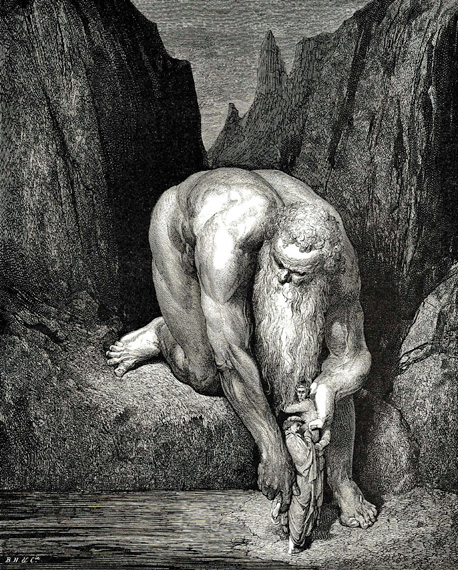
We, straightway journeying on,
Came to Antaeus, who five ells complete
Without the head, forth issued from the cave.
"O thou, who in the fortunate vale, that made
Great Scipio heir of glory, when his sword
Drove back the troop of Hannibal in flight,
Who thence of old didst carry for thy spoil
An hundred lions; and if thou hadst fought
In the high conflict on thy brethren's side,
Seems as men yet believ'd, that through thine arm
The sons of earth had conquer'd, now vouchsafe
To place us down beneath, where numbing cold
Locks up Cocytus. Force not that we crave
Or Tityus' help or Typhon's. Here is one
Can give what in this realm ye covet. Stoop
Therefore, nor scornfully distort thy lip.
He in the upper world can yet bestow
Renown on thee, for he doth live, and looks
For life yet longer, if before the time
Grace call him not unto herself." Thus spake
The teacher. He in haste forth stretch'd his hands,
And caught my guide. Alcides whilom felt
That grapple straighten'd score. Soon as my guide
Had felt it, he bespake me thus: "This way
That I may clasp thee;" then so caught me up,
That we were both one burden. As appears
The tower of Carisenda, from beneath
Where it doth lean, if chance a passing cloud
So sail across, that opposite it hangs,
Such then Antaeus seem'd, as at mine ease
I mark'd him stooping. I were fain at times
T' have pass'd another way. Yet in th' abyss,
That Lucifer with Judas low ingulfs,
Lightly he plac'd us; nor there leaning stay'd,
But rose as in a bark the stately mast.
Inferno - Canto 32, lines 16-37
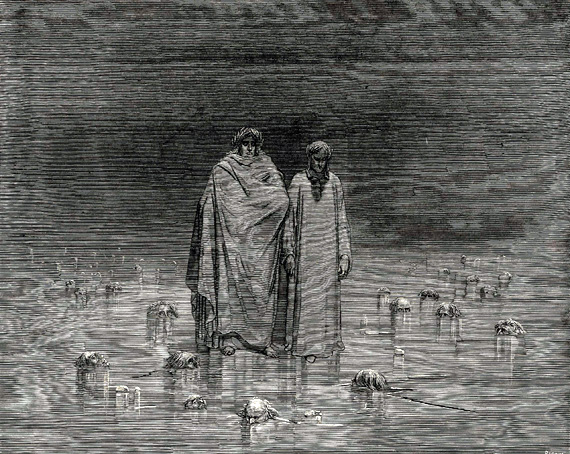
As down we stood
In the dark pit beneath the giants' feet,
But lower far than they, and I did gaze
Still on the lofty battlement, a voice
Bespoke me thus: "Look how thou walkest. Take
Good heed, thy soles do tread not on the heads
Of thy poor brethren." Thereupon I turn'd,
And saw before and underneath my feet
A lake, whose frozen surface liker seem'd
To glass than water. Not so thick a veil
In winter e'er hath Austrian Danube spread
O'er his still course, nor Tanais far remote
Under the chilling sky. Roll'd o'er that mass
Had Tabernich or Pietrapana fall'n,
Not e'en its rim had creak'd. As peeps the frog
Croaking above the wave, what time in dreams
The village gleaner oft pursues her toil,
So, to where modest shame appears, thus low
Blue pinch'd and shrin'd in ice the spirits stood,
Moving their teeth in shrill note like the stork.
His face each downward held; their mouth the cold,
Their eyes express'd the dolour of their heart.
Inferno - Canto 32, lines 71-101
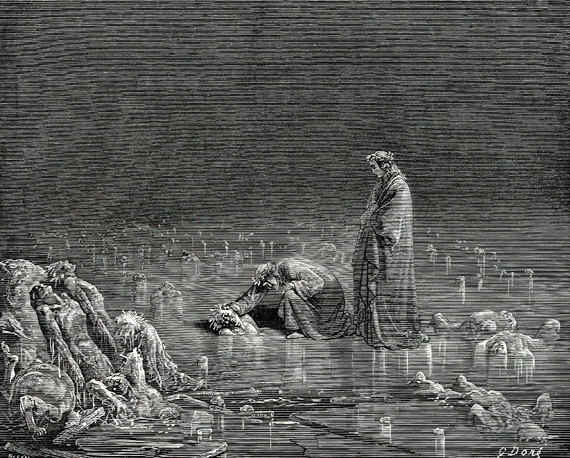
While we journey'd on
Toward the middle, at whose point unites
All heavy substance, and I trembling went
Through that eternal chillness, I know not
If will it were or destiny, or chance,
But, passing 'midst the heads, my foot did strike
With violent blow against the face of one.
"Wherefore dost bruise me?" weeping, he exclaim'd,
"Unless thy errand be some fresh revenge
For Montaperto, wherefore troublest me?"
I thus: "Instructor, now await me here,
That I through him may rid me of my doubt.
Thenceforth what haste thou wilt." The teacher paus'd,
And to that shade I spake, who bitterly
Still curs'd me in his wrath. "What art thou, speak,
That railest thus on others?" He replied:
"Now who art thou, that smiting others' cheeks
Through Antenora roamest, with such force
As were past suff'rance, wert thou living still?"
"And I am living, to thy joy perchance,"
Was my reply, "if fame be dear to thee,
That with the rest I may thy name enrol."
"The contrary of what I covet most,"
Said he, "thou tender'st: hence; nor vex me more.
Ill knowest thou to flatter in this vale."
Then seizing on his hinder scalp, I cried:
"Name thee, or not a hair shall tarry here."
"Rend all away," he answer'd, "yet for that
I will not tell nor show thee who I am,
Though at my head thou pluck a thousand times."
Inferno - Canto 32, lines 121-136
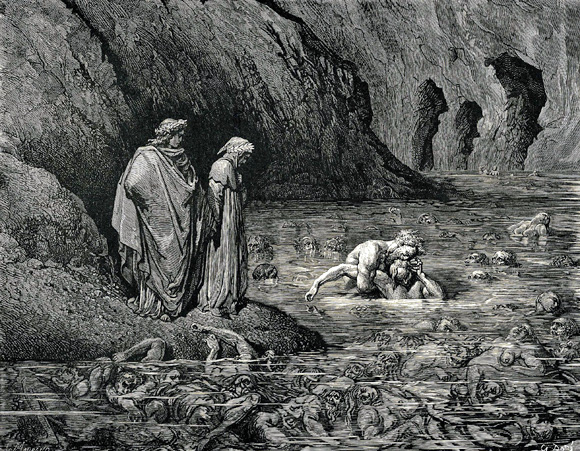
We now had left him, passing on our way,
When I beheld two spirits by the ice
Pent in one hollow, that the head of one
Was cowl unto the other; and as bread
Is raven'd up through hunger, th' uppermost
Did so apply his fangs to th' other's brain,
Where the spine joins it. Not more furiously
On Menalippus' temples Tydeus gnaw'd,
Than on that skull and on its garbage he.
"O thou who show'st so beastly sign of hate
'Gainst him thou prey'st on, let me hear," said I
"The cause, on such condition, that if right
Warrant thy grievance, knowing who ye are,
And what the colour of his sinning was,
I may repay thee in the world above,
If that, wherewith I speak be moist so long."
Inferno - Canto 33, lines 52-63
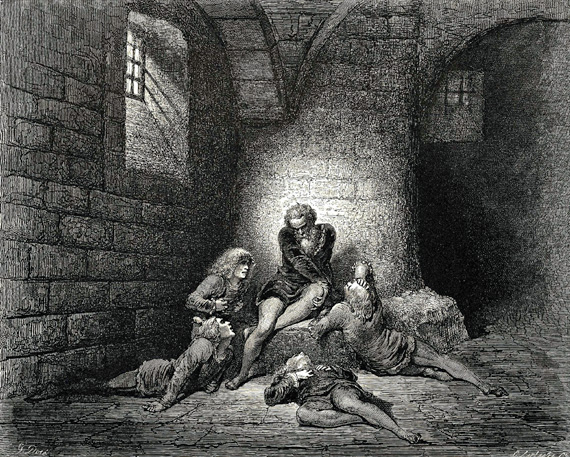
When a faint beam
Had to our doleful prison made its way,
And in four countenances I descry'd
The image of my own, on either hand
Through agony I bit, and they who thought
I did it through desire of feeding, rose
O' th' sudden, and cried, Father, we should grieve
Far less, if thou wouldst eat of us: thou gav'st
These weeds of miserable flesh we wear,
And do thou strip them off from us again.'
Then, not to make them sadder, I kept down
My spirit in stillness.
Inferno - Canto 33, lines 64-73
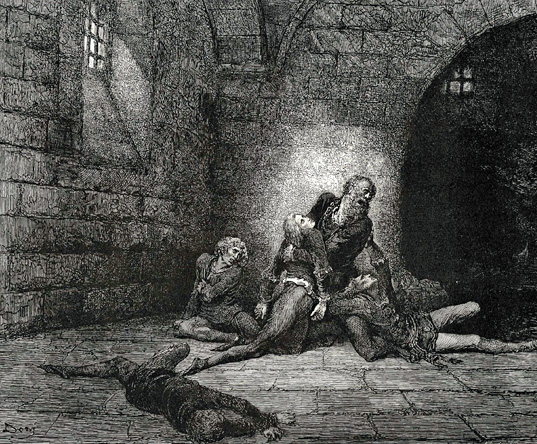
Ah, obdurate earth!
Why open'dst not upon us? When we came
To the fourth day, then Geddo at my feet
Outstretch'd did fling him, crying, 'Hast no help
For me, my father!' "There he died, and e'en
Plainly as thou seest me, saw I the three
Fall one by one 'twixt the fifth day and sixth:
Whence I betook me now grown blind to grope
Over them all, and for three days aloud
Call'd on them who were dead.
Canto 33, lines 73-91
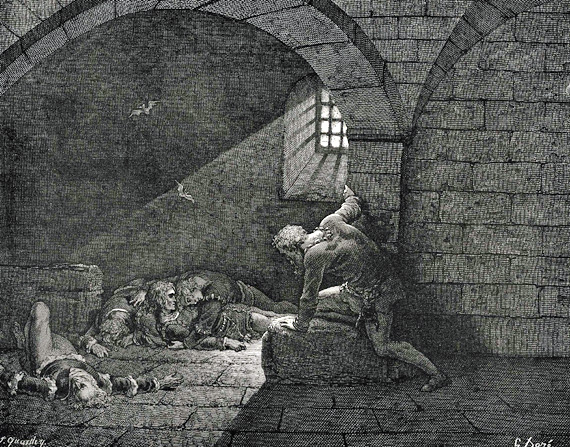
Then fasting got
The mastery of grief." Thus having spoke,
Once more upon the wretched skull his teeth
He fasten'd, like a mastiff's 'gainst the bone
Firm and unyielding. Oh thou Pisa! shame
Of all the people, who their dwelling make
In that fair region, where th' Italian voice
Is heard, since that thy neighbours are so slack
To punish, from their deep foundations rise
Capraia and Gorgona, and dam up
The mouth of Arno, that each soul in thee
May perish in the waters! What if fame
Reported that thy castles were betray'd
By Ugolino, yet no right hadst thou
To stretch his children on the rack. For them,
Brigata, Ugaccione, and the pair
Of gentle ones, of whom my song hath told,
Their tender years, thou modern Thebes! did make
Uncapable of guilt.
Canto 34, lines 10-64
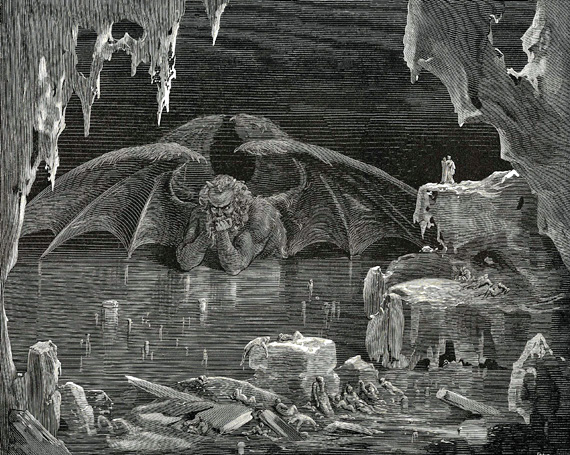
Now came I (and with fear I bid my strain
Record the marvel) where the souls were all
Whelm'd underneath, transparent, as through glass
Pellucid the frail stem. Some prone were laid,
Others stood upright, this upon the soles,
That on his head, a third with face to feet
Arch'd like a bow. When to the point we came,
Whereat my guide was pleas'd that I should see
The creature eminent in beauty once,
He from before me stepp'd and made me pause.
"Lo!" he exclaim'd, "lo Dis! and lo the place,
Where thou hast need to arm thy heart with strength."
How frozen and how faint I then became,
Ask me not, reader! for I write it not,
Since words would fail to tell thee of my state.
I was not dead nor living. Think thyself
If quick conception work in thee at all,
How I did feel. That emperor, who sways
The realm of sorrow, at mid breast from th' ice
Stood forth; and I in stature am more like
A giant, than the giants are in his arms.
Mark now how great that whole must be, which suits
With such a part. If he were beautiful
As he is hideous now, and yet did dare
To scowl upon his Maker, well from him
May all our mis'ry flow. Oh what a sight!
How passing strange it seem'd, when I did spy
Upon his head three faces: one in front
Of hue vermilion, th' other two with this
Midway each shoulder join'd and at the crest;
The right 'twixt wan and yellow seem'd: the left
To look on, such as come from whence old Nile
Stoops to the lowlands. Under each shot forth
Two mighty wings, enormous as became
A bird so vast. Sails never such I saw
Outstretch'd on the wide sea. No plumes had they,
But were in texture like a bat, and these
He flapp'd i' th' air, that from him issued still
Three winds, wherewith Cocytus to its depth
Was frozen. At six eyes he wept: the tears
Adown three chins distill'd with bloody foam.
At every mouth his teeth a sinner champ'd
Bruis'd as with pond'rous engine, so that three
Were in this guise tormented. But far more
Than from that gnawing, was the foremost pang'd
By the fierce rending, whence ofttimes the back
Was stript of all its skin. "That upper spirit,
Who hath worse punishment," so spake my guide,
"Is Judas, he that hath his head within
And plies the feet without. Of th' other two,
Whose heads are under, from the murky jaw
Who hangs, is Brutus: lo! how he doth writhe
And speaks not! Th' other Cassius, that appears
So large of limb. But night now re-ascends,
And it is time for parting. All is seen."
Canto 34, lines 121-129
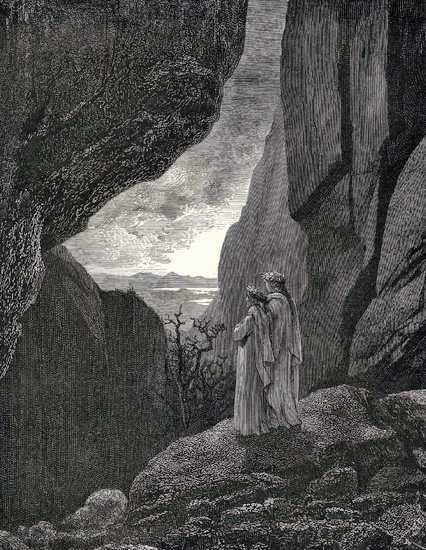
There is a place beneath,
From Belzebub as distant, as extends
The vaulted tomb, discover'd not by sight,
But by the sound of brooklet, that descends
This way along the hollow of a rock,
Which, as it winds with no precipitous course,
The wave hath eaten. By that hidden way
My guide and I did enter, to return
To the fair world
Canto 34, lines 127-133
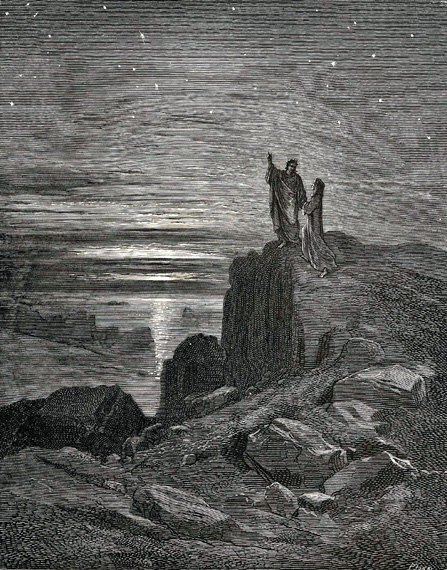
And heedless of repose
We climbed, he first, I following his steps,
Till on our view the beautiful lights of heav'n
Dawn'd through a circular opening in the cave:
Thus issuing we again beheld the stars.
PURGATORIO
Purgatorio Canto 1
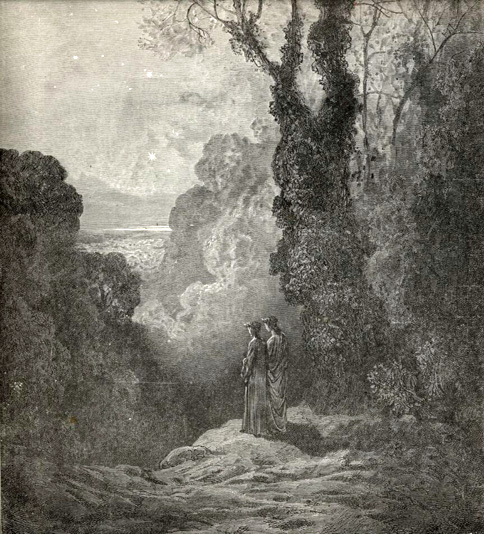
To the right hand I turn'd, and fix'd my mind
On the' other pole attentive, where I saw
Four stars ne'er seen before save by the ken
Of our first parents. Heaven of their rays
Seem'd joyous. O thou northern site, bereft
Indeed, and widow'd, since of these depriv'd!
Purgatorio Canto 1
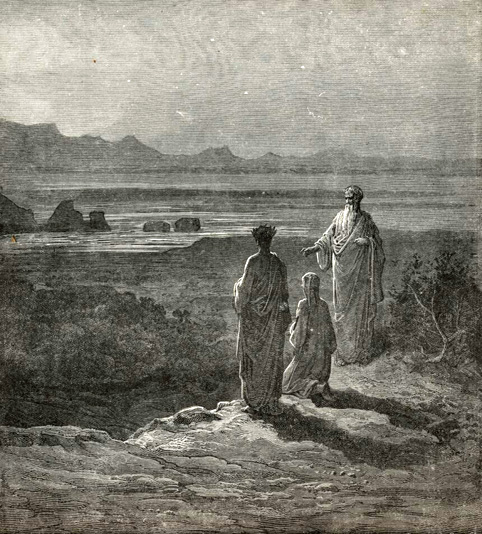
My guide, then laying hold on me, by words
And intimations given with hand and head,
Made my bent knees and eye submissive pay
Due reverence
Purgatorio Canto 2
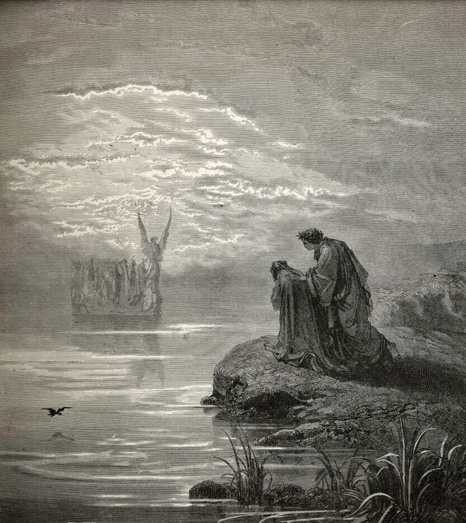
Lo how all human means he sets at naught!
So that nor oar he needs, nor other sail
Except his wings, between such distant shores.
Lo how straight up to heaven he holds them rear'd,
Winnowing the air with those eternal plumes,
That not like mortal hairs fall off or change!"
As more and more toward us came, more bright
Appear'd the bird of God, nor could the eye
Endure his splendor near: I mine bent down.
He drove ashore in a small bark so swift
And light, that in its course no wave it drank.
The heav'nly steersman at the prow was seen,
Visibly written blessed in his looks.
Purgatorio Canto 2
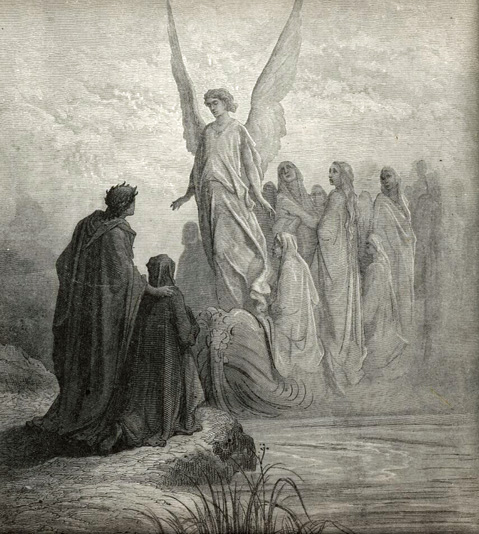
Within a hundred spirits and more there sat.
"In Exitu Israel de Aegypto;"
All with one voice together sang, with what
In the remainder of that hymn is writ.
Then soon as with the sign of holy cross
He bless'd them, they at once leap'd out on land,
The swiftly as he came return'd. The crew,
There left, appear'd astounded with the place,
Gazing around as one who sees new sights.
From every side the sun darted his beams,
And with his arrowy radiance from mid heav'n
Had chas'd the Capricorn, when that strange tribe
Lifting their eyes towards us: "If ye know,
Declare what path will Lead us to the mount."
Purgatorio Canto 3
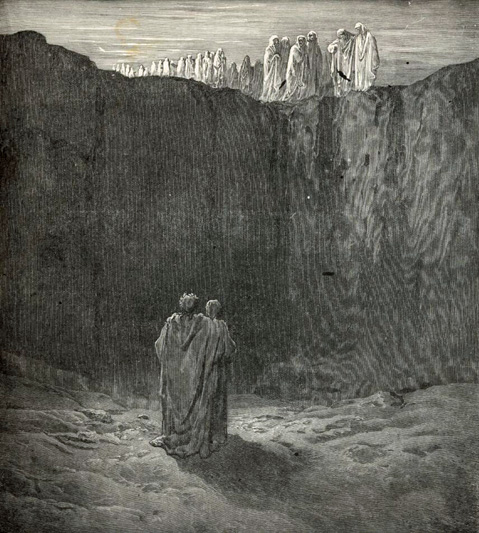
I thus my guide address'd: "Upraise thine eyes,
Lo that way some, of whom thou may'st obtain
Counsel, if of thyself thou find'st it not!"
Straightway he look'd, and with free speech replied:
"Let us tend thither: they but softly come.
And thou be firm in hope, my son belov'd."
Purgatorio Canto 4
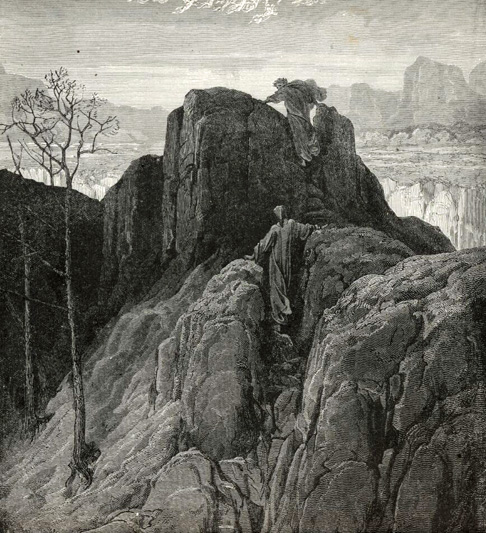
We through the broken rock ascended, close
Pent on each side, while underneath the ground
Ask'd help of hands and feet. When we arriv'd
Near on the highest ridge of the steep bank,
Where the plain level open'd I exclaim'd,
"O master! say which way can we proceed?"
Purgatorio Canto 4
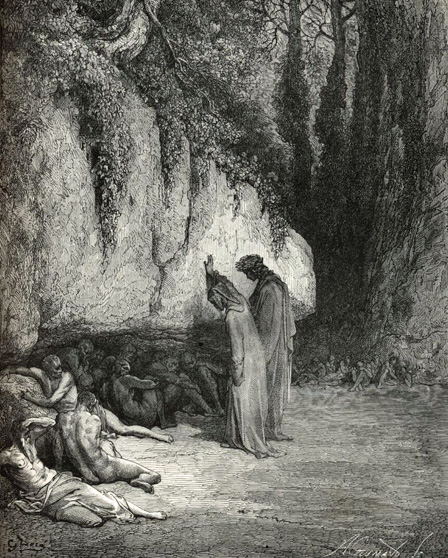
"Sweet Sir!" I cry'd, "behold that man, who shows
Himself more idle, than if laziness
Were sister to him." Straight he turn'd to us,
And, o'er the thigh lifting his face, observ'd,
Then in these accents spake: "Up then, proceed
Thou valiant one." Straight who it was I knew;
Nor could the pain I felt (for want of breath
Still somewhat urg'd me) hinder my approach.
And when I came to him, he scarce his head
Uplifted, saying "Well hast thou discern'd,
How from the left the sun his chariot leads."
Purgatorio Canto 5
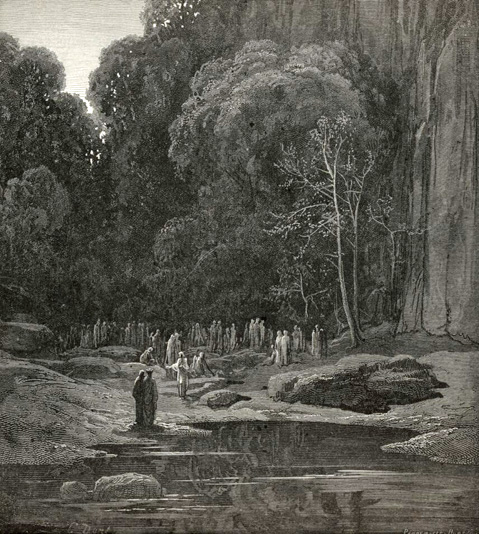
"Many," exclaim'd the bard, "are these, who throng
Around us: to petition thee they come.
Go therefore on, and listen as thou go'st."
Purgatorio Canto 5
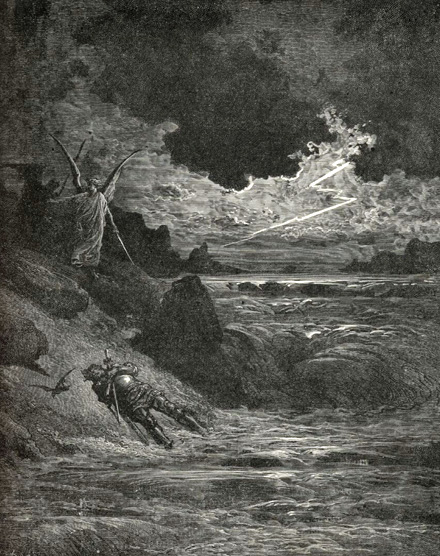
My stiffen'd frame
Laid at his mouth the fell Archiano found,
And dash'd it into Arno, from my breast
Loos'ning the cross, that of myself I made
When overcome with pain. He hurl'd me on,
Along the banks and bottom of his course;
Then in his muddy spoils encircling wrapt."
Purgatorio Canto 5
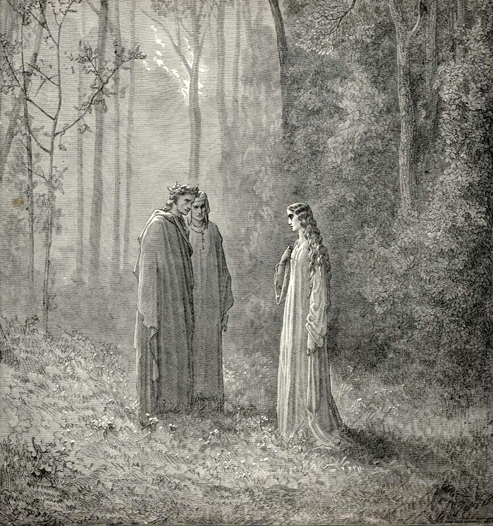
"Ah! when thou to the world shalt be return'd,
And rested after thy long road," so spake
Next the third spirit; "then remember me.
I once was Pia. Sienna gave me life,
Maremma took it from me. That he knows,
Who me with jewell'd ring had first espous'd."
Purgatorio Canto 7
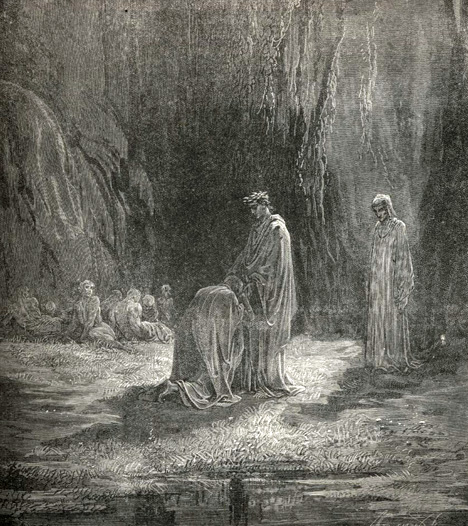
Am I arriv'd, by heav'nly influence led
And with such aid I come. There is a place
There underneath, not made by torments sad,
But by dun shades alone; where mourning's voice
Sounds not of anguish sharp, but breathes in sighs."
Purgatorio Canto 7
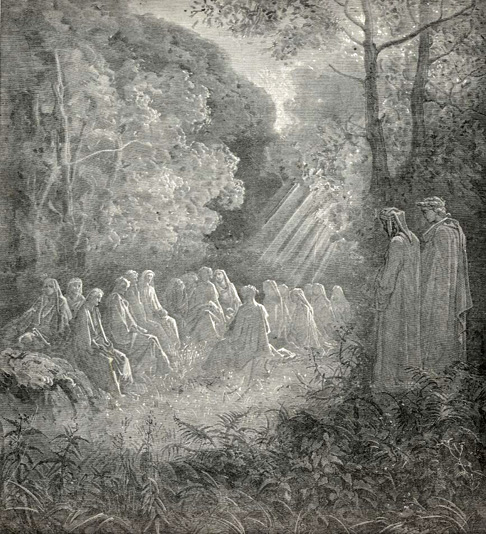
"Salve Regina," on the grass and flowers
Here chanting I beheld those spirits sit
Who not beyond the valley could be seen.
Purgatorio Canto 8
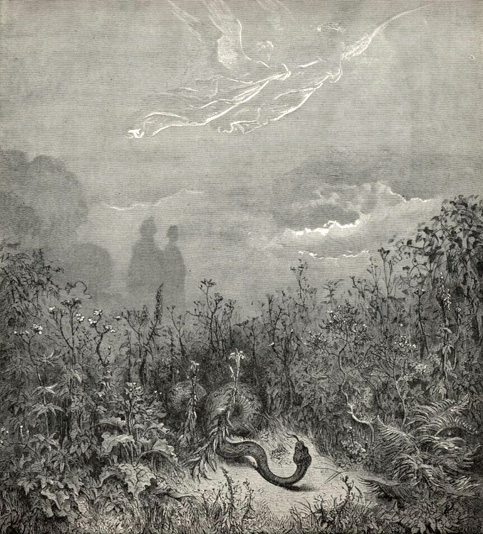
Along the side, where barrier none arose
Around the little vale, a serpent lay,
Such haply as gave Eve the bitter food.
Between the grass and flowers, the evil snake
Came on, reverting oft his lifted head;
And, as a beast that smoothes its polish'd coat,
Licking his hack. I saw not, nor can tell,
How those celestial falcons from their seat
Mov'd, but in motion each one well descried,
Hearing the air cut by their verdant plumes.
The serpent fled; and to their stations back
The angels up return'd with equal flight.
Purgatorio Canto 9
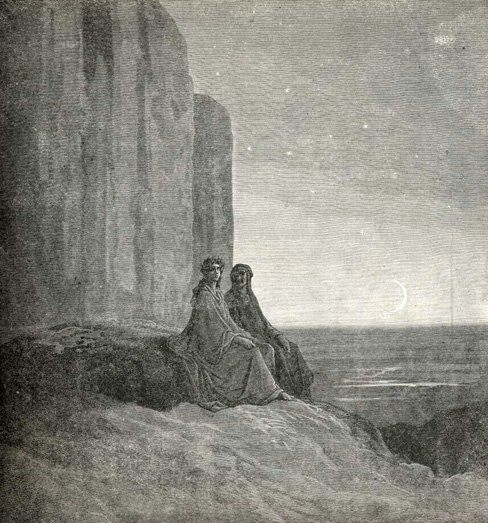
Now the fair consort of Tithonus old,
Arisen from her mate's beloved arms,
Look'd palely o'er the eastern cliff
Purgatorio Canto 9
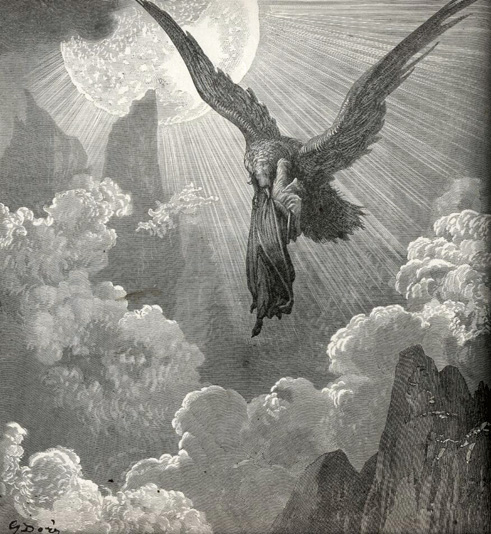
Then in a vision did I seem to view
A golden-feather'd eagle in the sky,
With open wings, and hov'ring for descent,
And I was in that place, methought, from whence
Young Ganymede, from his associates 'reft,
Was snatch'd aloft to the high consistory.
"Perhaps," thought I within me, "here alone
He strikes his quarry, and elsewhere disdains
To pounce upon the prey." Therewith, it seem'd,
A little wheeling in his airy tour
Terrible as the lightning rush'd he down,
And snatch'd me upward even to the fire.
Purgatorio Canto 9
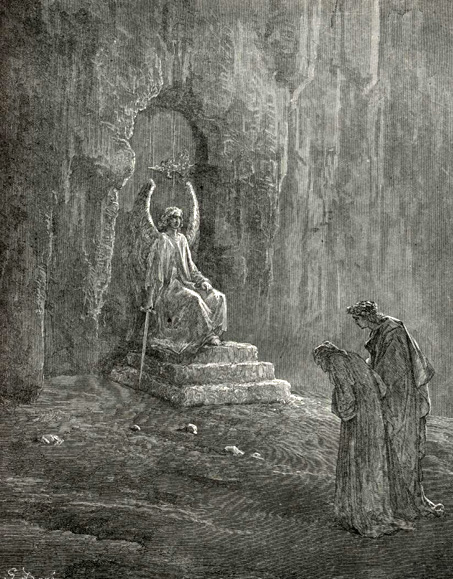
Reader! thou markest how my theme doth rise,
Nor wonder therefore, if more artfully
I prop the structure! Nearer now we drew,
Arriv'd' whence in that part, where first a breach
As of a wall appear'd, I could descry
A portal, and three steps beneath, that led
For inlet there, of different colour each,
And one who watch'd, but spake not yet a word.
As more and more mine eye did stretch its view,
I mark'd him seated on the highest step,
In visage such, as past my power to bear.
Purgatorio Canto 10
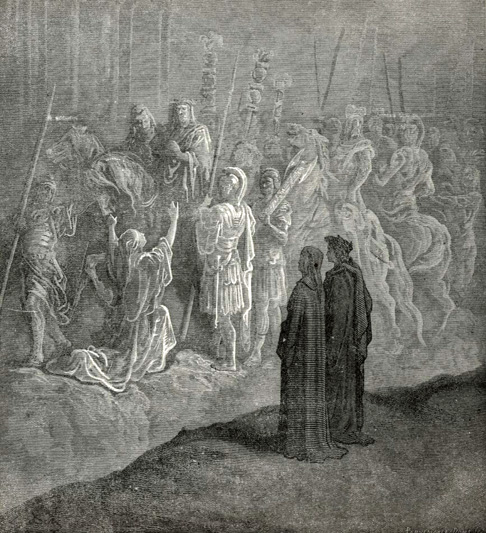
To behold the tablet next,
Which at the hack of Michol whitely shone,
I mov'd me. There was storied on the rock
The' exalted glory of the Roman prince,
Whose mighty worth mov'd Gregory to earn
His mighty conquest, Trajan th' Emperor.
A widow at his bridle stood, attir'd
In tears and mourning. Round about them troop'd
Full throng of knights, and overhead in gold
The eagles floated, struggling with the wind.
Purgatorio Canto 12
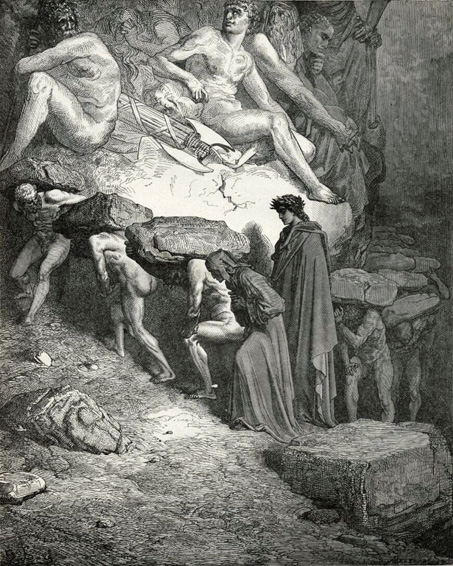
With equal pace as oxen in the yoke,
I with that laden spirit journey'd on
Long as the mild instructor suffer'd me;
But when he bade me quit him, and proceed
(For "here," said he, "behooves with sail and oars
Each man, as best he may, push on his bark"),
Upright, as one dispos'd for speed, I rais'd
My body, still in thought submissive bow'd.
I now my leader's track not loth pursued;
And each had shown how light we far'd along
When thus he warn'd me: "Bend thine eyesight down:
For thou to ease the way shall find it good
To ruminate the bed beneath thy feet."
Purgatorio Canto 12
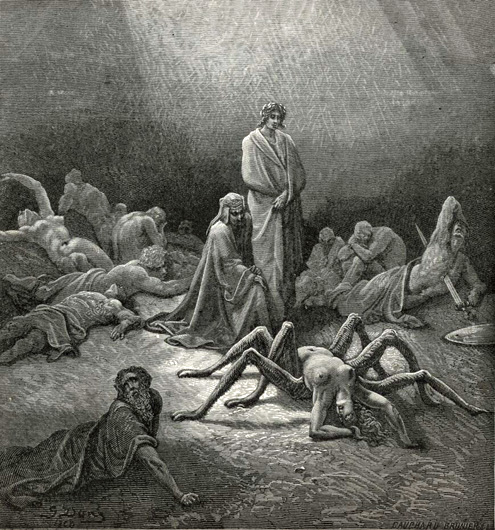
O fond Arachne! thee I also saw
Half spider now in anguish crawling up
Th' unfinish'd web thou weaved'st to thy bane!
O Rehoboam! here thy shape doth seem
Louring no more defiance! but fear-smote
With none to chase him in his chariot whirl'd.
Purgatorio Canto 13
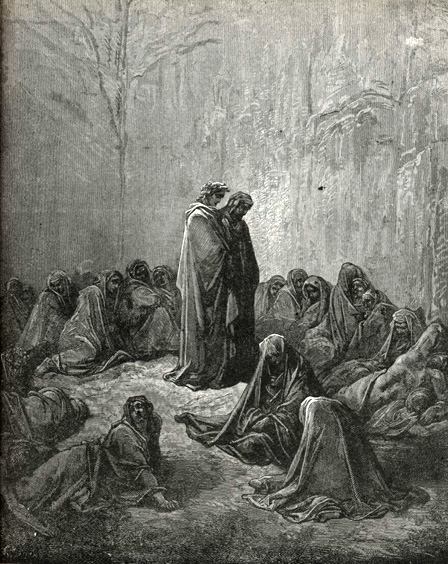
I do not think there walks on earth this day
Man so remorseless, that he hath not yearn'd
With pity at the sight that next I saw.
Mine eyes a load of sorrow teemed, when now
I stood so near them, that their semblances
Came clearly to my view. Of sackcloth vile
Their cov'ring seem'd; and on his shoulder one
Did stay another, leaning, and all lean'd
Against the cliff. E'en thus the blind and poor,
Near the confessionals, to crave an alms,
Stand, each his head upon his fellow's sunk,
So most to stir compassion, not by sound
Of words alone, but that, which moves not less,
The sight of mis'ry. And as never beam
Of noonday visiteth the eyeless man,
E'en so was heav'n a niggard unto these
Of his fair light; for, through the orbs of all,
A thread of wire, impiercing, knits them up,
As for the taming of a haggard hawk.
Purgatorio Canto 13
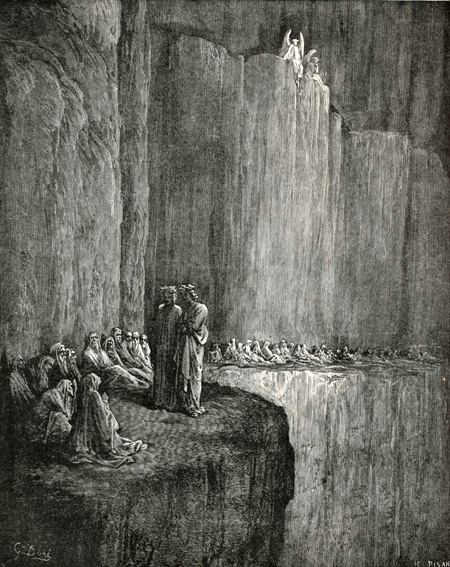
She thus: "Who then amongst us here aloft
Hath brought thee, if thou weenest to return?"
"He," answer'd I, "who standeth mute beside me.
I live: of me ask therefore, chosen spirit,
If thou desire I yonder yet should move
For thee my mortal feet."--"Oh!" she replied,
"This is so strange a thing, it is great sign
That God doth love thee. Therefore with thy prayer
Sometime assist me: and by that I crave,
Which most thou covetest, that if thy feet
E'er tread on Tuscan soil, thou save my fame
Amongst my kindred. Them shalt thou behold
With that vain multitude, who set their hope
On Telamone's haven, there to fail
Confounded, more shall when the fancied stream
They sought of Dian call'd: but they who lead
Their navies, more than ruin'd hopes shall mourn."
Purgatorio Canto 15
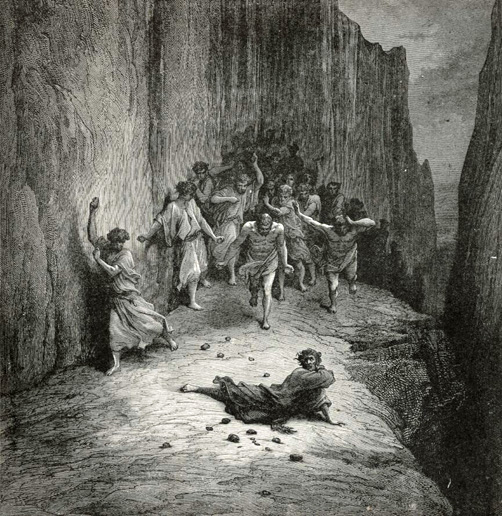
"If thou, Pisistratus, be lord indeed
Over this city, nam'd with such debate
Of adverse gods, and whence each science sparkles,
Avenge thee of those arms, whose bold embrace
Hath clasp'd our daughter; "and to fuel, meseem'd,
Benign and meek, with visage undisturb'd,
Her sovran spake: "How shall we those requite,
Who wish us evil, if we thus condemn
The man that loves us?" After that I saw
A multitude, in fury burning, slay
With stones a stripling youth, and shout amain
"Destroy, destroy!" and him I saw, who bow'd
Heavy with death unto the ground, yet made
His eyes, unfolded upward, gates to heav'n,
Praying forgiveness of th' Almighty Sire,
Amidst that cruel conflict, on his foes,
With looks, that With compassion to their aim.
Purgatorio Canto 16
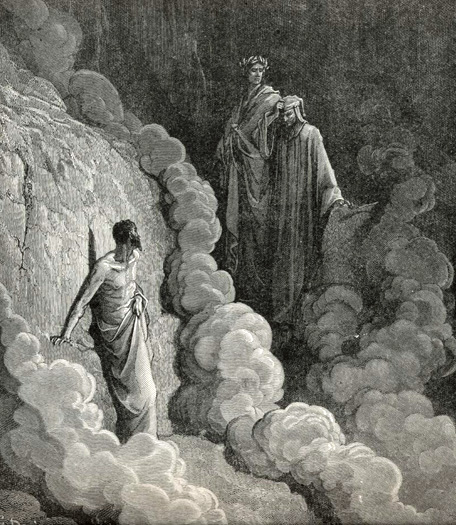
As the blind man behind his leader walks,
Lest he should err, or stumble unawares
On what might harm him, or perhaps destroy,
I journey'd through that bitter air and foul,
Still list'ning to my escort's warning voice,
"Look that from me thou part not." Straight I heard
Voices, and each one seem'd to pray for peace,
And for compassion, to the Lamb of God
That taketh sins away. Their prelude still
Was "Agnus Dei," and through all the choir,
One voice, one measure ran, that perfect seem'd
The concord of their song. "Are these I hear
Spirits, O master?" I exclaim'd; and he:
"Thou aim'st aright: these loose the bonds of wrath."
Purgatorio Canto 16
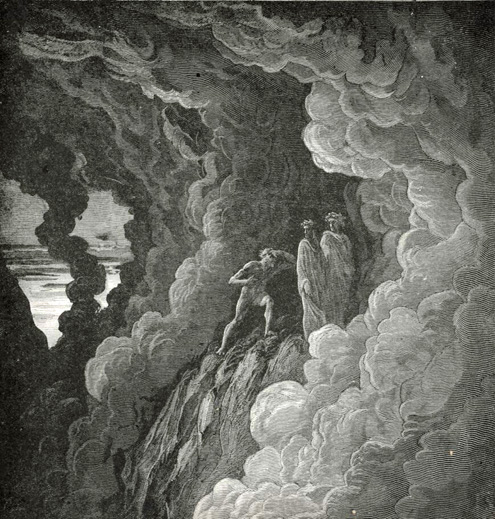
"Long as 't is lawful for me, shall my steps
Follow on thine; and since the cloudy smoke
Forbids the seeing, hearing in its stead
Shall keep us join'd." I then forthwith began
"Yet in my mortal swathing, I ascend
To higher regions, and am hither come
Through the fearful agony of hell.
And, if so largely God hath doled his grace,
That, clean beside all modern precedent,
He wills me to behold his kingly state,
From me conceal not who thou wast, ere death
Had loos'd thee; but instruct me: and instruct
If rightly to the pass I tend; thy words
The way directing as a safe escort."
Purgatorio Canto 18
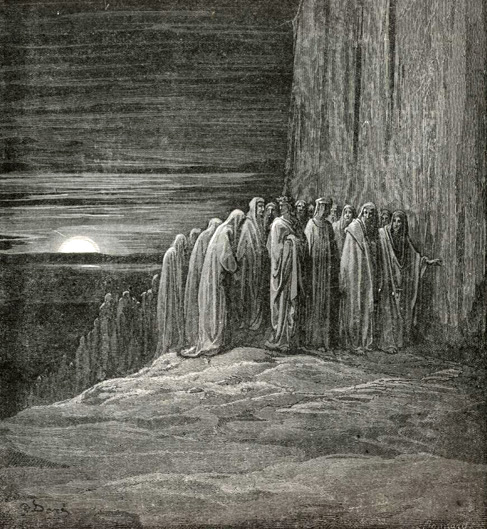
The steep already turning, from behind,
Rush'd on. With fury and like random rout,
As echoing on their shores at midnight heard
Ismenus and Asopus, for his Thebes
If Bacchus' help were needed; so came these
Tumultuous, curving each his rapid step,
By eagerness impell'd of holy love.
Soon they o'ertook us; with such swiftness mov'd
The mighty crowd. Two spirits at their head
Cried weeping; "Blessed Mary sought with haste
The hilly region. Caesar to subdue
Ilerda, darted in Marseilles his sting,
And flew to Spain."--"Oh tarry not: away;"
The others shouted; "let not time be lost
Through slackness of affection. Hearty zeal
To serve reanimates celestial grace."
Purgatorio Canto 19
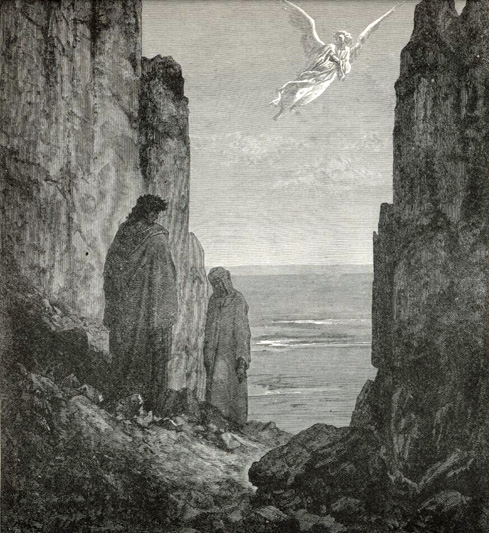
With swan-like wings dispread and pointing up,
Who thus had spoken marshal'd us along,
Where each side of the solid masonry
The sloping, walls retir'd; then mov'd his plumes,
And fanning us, affirm'd that those, who mourn,
Are blessed, for that comfort shall be theirs.
"What aileth thee, that still thou look'st to earth?"
Began my leader; while th' angelic shape
A little over us his station took.
Purgatorio Canto 19
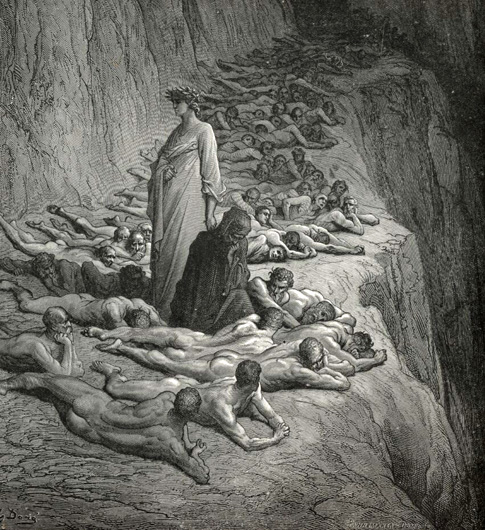
"Up," he exclaim'd, "brother! upon thy feet
Arise: err not: thy fellow servant I,
(Thine and all others') of one Sovran Power.
If thou hast ever mark'd those holy sounds
Of gospel truth, 'nor shall be given ill marriage,'
Thou mayst discern the reasons of my speech.
Go thy ways now; and linger here no more.
Thy tarrying is a let unto the tears,
With which I hasten that whereof thou spak'st.
I have on earth a kinswoman; her name
Alagia, worthy in herself, so ill
Example of our house corrupt her not:
And she is all remaineth of me there."
Purgatorio Canto 20
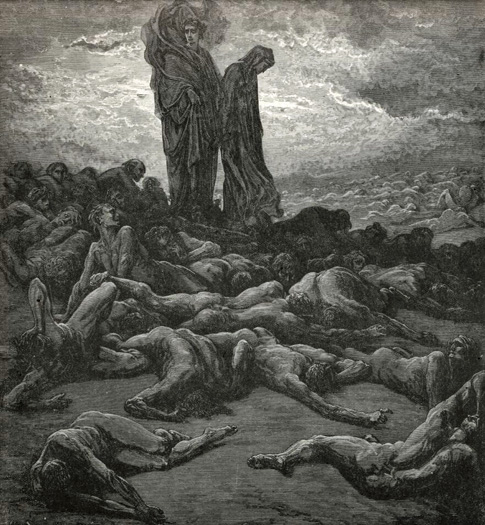
Onward I mov'd: he also onward mov'd,
Who led me, coasting still, wherever place
Along the rock was vacant, as a man
Walks near the battlements on narrow wall.
For those on th' other part, who drop by drop
Wring out their all-infecting malady,
Too closely press the verge. Accurst be thou!
Inveterate wolf! whose gorge ingluts more prey,
Than every beast beside, yet is not fill'd!
So bottomless thy maw!—Ye spheres of heaven!
To whom there are, as seems, who attribute
All change in mortal state, when is the day
Of his appearing, for whom fate reserves
To chase her hence? —With wary steps and slow
We pass'd; and I attentive to the shades,
Whom piteously I heard lament and wail;
And, 'midst the wailing, one before us heard
Cry out "O blessed Virgin!" as a dame
In the sharp pangs of childbed; and "How poor
Thou wast," it added, "witness that low roof
Where thou didst lay thy sacred burden down.
O good Fabricius! thou didst virtue choose
With poverty, before great wealth with vice."
Purgatorio Canto 23
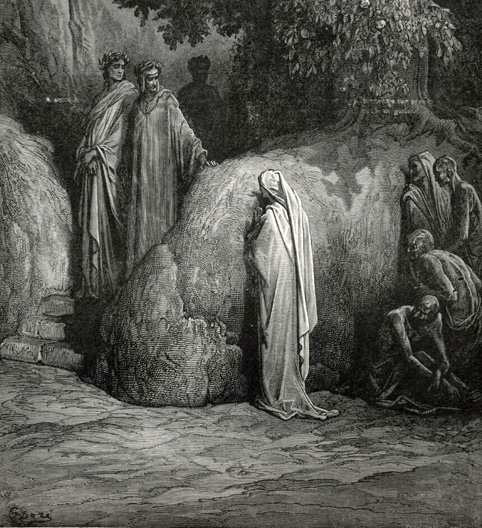
"Ah! respect
This wan and leprous wither'd skin," thus he
Suppliant implor'd, "this macerated flesh.
Speak to me truly of thyself. And who
Are those twain spirits, that escort thee there?
Be it not said thou Scorn'st to talk with me."
Purgatorio Canto 24
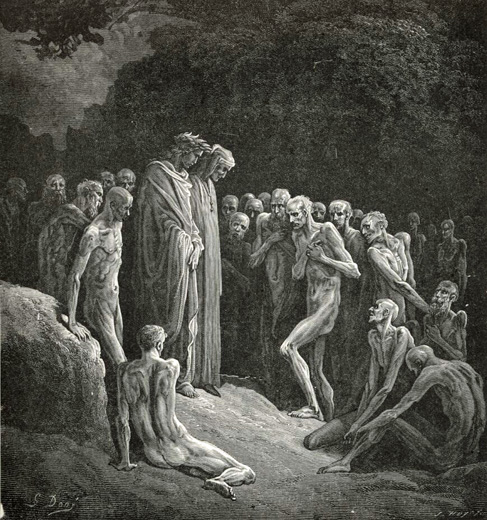
Our journey was not slacken'd by our talk,
Nor yet our talk by journeying. Still we spake,
And urg'd our travel stoutly, like a ship
When the wind sits astern.
Purgatorio Canto 24
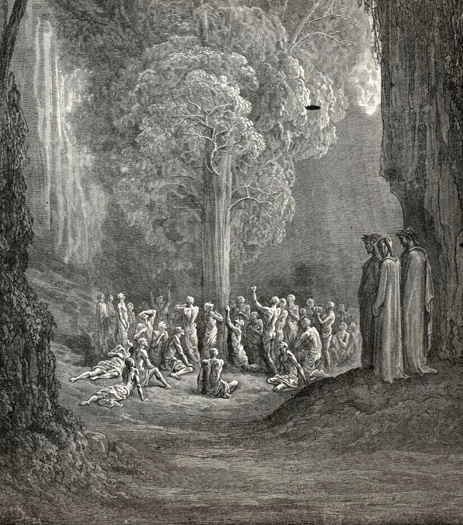
When he beyond us had so fled mine eyes
No nearer reach'd him, than my thought his words,
The branches of another fruit, thick hung,
And blooming fresh, appear'd. E'en as our steps
Turn'd thither, not far off it rose to view.
Beneath it were a multitude, that rais'd
Their hands, and shouted forth I know not What
Unto the boughs; like greedy and fond brats,
That beg, and answer none obtain from him,
Of whom they beg; but more to draw them on,
He at arm's length the object of their wish
Above them holds aloft, and hides it not.
At length, as undeceiv'd they went their way:
And we approach the tree, who vows and tears
Sue to in vain, the mighty tree. "Pass on,
And come not near. Stands higher up the wood,
Whereof Eve tasted, and from it was ta'en
'this plant." Such sounds from midst the thickets came.
Whence I, with either bard, close to the side
That rose, pass'd forth beyond. "Remember," next
We heard, "those noblest creatures of the clouds,
How they their twofold bosoms overgorg'd
Oppos'd in fight to Theseus: call to mind
The Hebrews, how effeminate they stoop'd
To ease their thirst; whence Gideon's ranks were thinn'd,
As he to Midian march'd adown the hills."
Purgatorio Canto 25
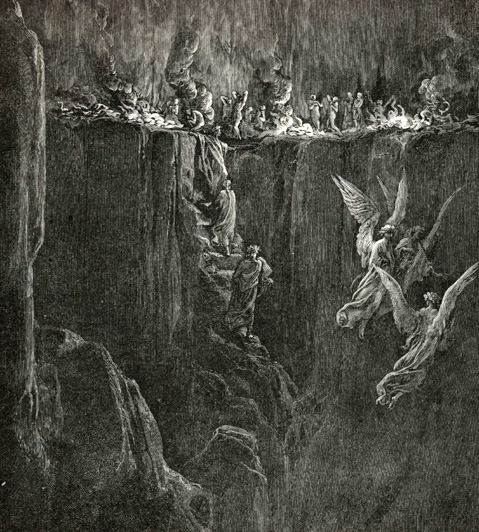
"When Lachesis hath spun the thread, the soul
Takes with her both the human and divine,
Memory, intelligence, and will, in act
Far keener than before, the other powers
Inactive all and mute. No pause allow'd,
In wond'rous sort self-moving, to one strand
Of those, where the departed roam, she falls,
Here learns her destin'd path. Soon as the place
Receives her, round the plastic virtue beams,
Distinct as in the living limbs before:
And as the air, when saturate with showers,
The casual beam refracting, decks itself
With many a hue; so here the ambient air
Weareth that form, which influence of the soul
Imprints on it; and like the flame, that where
The fire moves, thither follows, so henceforth
The new form on the spirit follows still:
Hence hath it semblance, and is shadow call'd,
With each sense even to the sight endued:
Hence speech is ours, hence laughter, tears, and sighs
Which thou mayst oft have witness'd on the mount
Th' obedient shadow fails not to present
Whatever varying passion moves within us.
And this the cause of what thou marvel'st at."
Purgatorio Canto 25
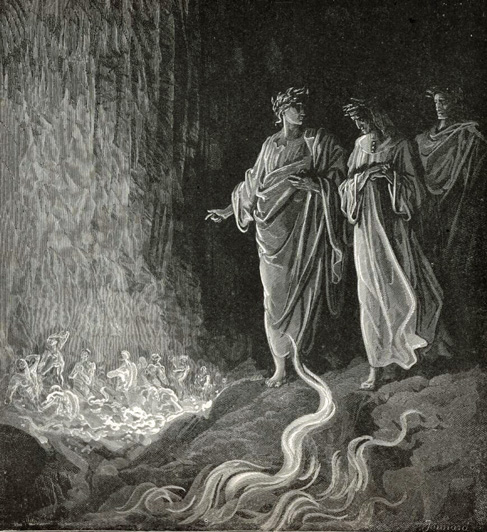
Now the last flexure of our way we reach'd,
And to the right hand turning, other care
Awaits us. Here the rocky precipice
Hurls forth redundant flames, and from the rim
A blast upblown, with forcible rebuff
Driveth them back, sequester'd from its bound.
Behoov'd us, one by one, along the side,
That border'd on the void, to pass; and I
Fear'd on one hand the fire, on th' other fear'd
Headlong to fall: when thus th' instructor warn'd:
"Strict rein must in this place direct the eyes.
A little swerving and the way is lost."
Purgatorio Canto 25
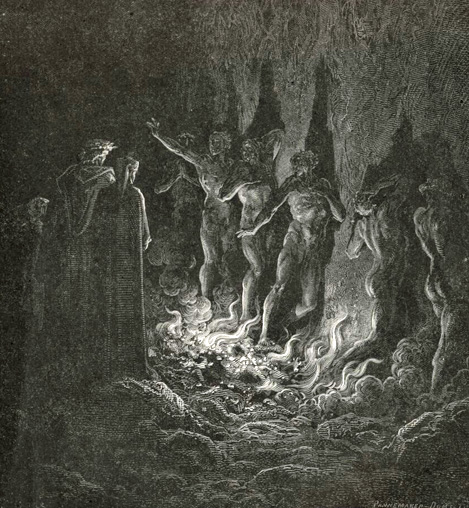
Then from the bosom of the burning mass,
"O God of mercy!" heard I sung; and felt
No less desire to turn. And when I saw
Spirits along the flame proceeding, I
Between their footsteps and mine own was fain
To share by turns my view. At the hymn's close
They shouted loud, "I do not know a man;"
Then in low voice again took up the strain,
Which once more ended, "To the wood," they cried,
"Ran Dian, and drave forth Callisto, stung
With Cytherea's poison:" then return'd
Unto their song; then marry a pair extoll'd,
Who liv'd in virtue chastely, and the bands
Of wedded love. Nor from that task, I ween,
Surcease they; whilesoe'er the scorching fire
Enclasps them. Of such skill appliance needs
To medicine the wound, that healeth last.
Purgatorio Canto 27
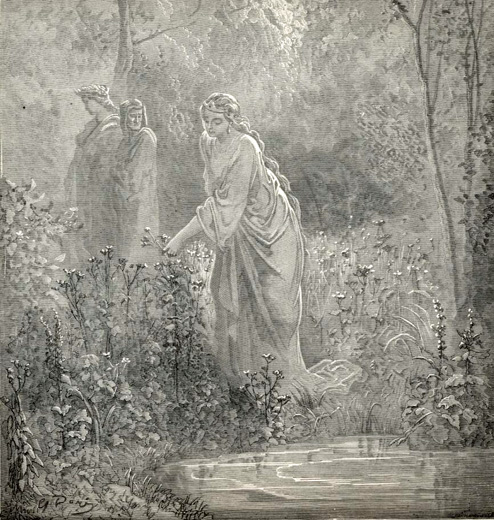
A little glimpse of sky was seen above;
Yet by that little I beheld the stars
In magnitude and rustle shining forth
With more than wonted glory. As I lay,
Gazing on them, and in that fit of musing,
Sleep overcame me, sleep, that bringeth oft
Tidings of future hap. About the hour,
As I believe, when Venus from the east
First lighten'd on the mountain, she whose orb
Seems always glowing with the fire of love,
A lady young and beautiful, I dream'd,
Was passing o'er a lea; and, as she came,
Methought I saw her ever and anon
Bending to cull the flowers; and thus she sang:
"Know ye, whoever of my name would ask,
That I am Leah: for my brow to weave
A garland, these fair hands unwearied ply.
To please me at the crystal mirror, here
I deck me. But my sister Rachel, she
Before her glass abides the livelong day,
Her radiant eyes beholding, charm'd no less,
Than I with this delightful task. Her joy
In contemplation, as in labour mine."
Purgatorio Canto 28
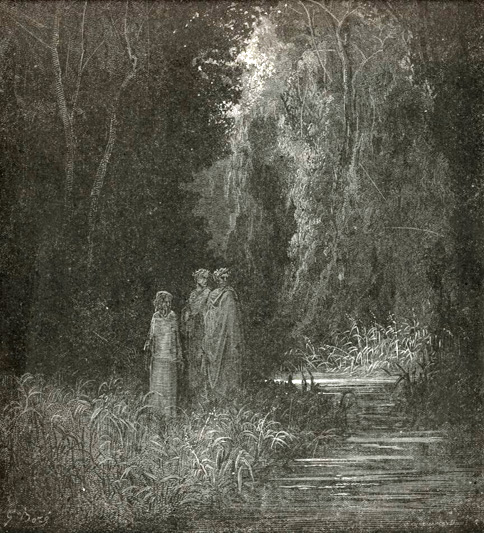
My feet advanc'd not; but my wond'ring eyes
Pass'd onward, o'er the streamlet, to survey
The tender May-bloom, flush'd through many a hue,
In prodigal variety: and there,
As object, rising suddenly to view,
That from our bosom every thought beside
With the rare marvel chases, I beheld
A lady all alone, who, singing, went,
And culling flower from flower, wherewith her way
Was all o'er painted. "Lady beautiful!
Thou, who (if looks, that use to speak the heart,
Are worthy of our trust), with love's own beam
Dost warm thee," thus to her my speech I fram'd:
"Ah! please thee hither towards the streamlet bend
Thy steps so near, that I may list thy song.
Beholding thee and this fair place, methinks,
I call to mind where wander'd and how look'd
Proserpine, in that season, when her child
The mother lost, and she the bloomy spring."
Purgatorio Canto 29
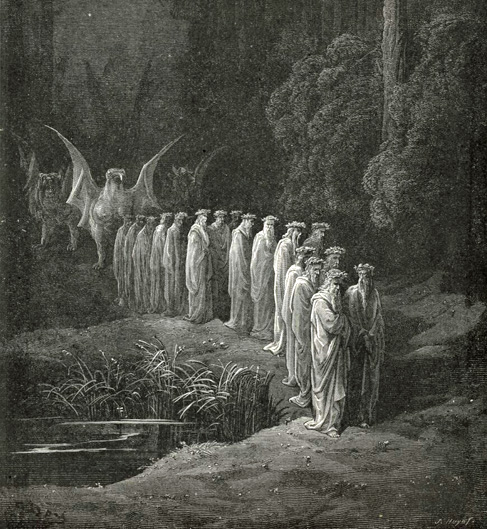
All sang one song: "Blessed be thou among
The daughters of Adam! and thy loveliness
Blessed for ever!" After that the flowers,
And the fresh herblets, on the opposite brink,
Were free from that elected race; as light
In heav'n doth second light, came after them
Four animals, each crown'd with verdurous leaf.
With six wings each was plum'd, the plumage full
Of eyes, and th' eyes of Argus would be such,
Were they endued with life. Reader, more rhymes
Will not waste in shadowing forth their form:
For other need no straitens, that in this
I may not give my bounty room. But read
Ezekiel; for he paints them, from the north
How he beheld them come by Chebar's flood,
In whirlwind, cloud and fire; and even such
As thou shalt find them character'd by him,
Here were they; save as to the pennons; there,
From him departing, John accords with me.
The space, surrounded by the four, enclos'd
A car triumphal: on two wheels it came
Drawn at a Gryphon's neck; and he above
Stretch'd either wing uplifted, 'tween the midst
And the three listed hues, on each side three;
So that the wings did cleave or injure none;
And out of sight they rose. The members, far
As he was bird, were golden; white the rest
With vermeil intervein'd. So beautiful
A car in Rome ne'er grac'd Augustus pomp,
Or Africanus': e'en the sun's itself
Were poor to this, that chariot of the sun
Erroneous, which in blazing ruin fell
At Tellus' pray'r devout, by the just doom
Mysterious of all-seeing Jove. Three nymphs
at the right wheel, came circling in smooth dance;
The one so ruddy, that her form had scarce
Been known within a furnace of clear flame:
The next did look, as if the flesh and bones
Were emerald: snow new-fallen seem'd the third.
Purgatorio Canto 29
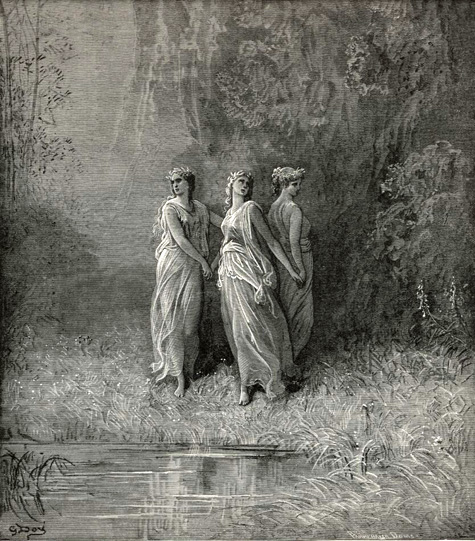
Now seem'd the white to lead, the ruddy now;
And from her song who led, the others took
Their treasure, swift or slow. At th' other wheel,
A band quaternion, each in purple clad,
Advanc'd with festal step, as of them one
The rest conducted, one, upon whose front
Three eyes were seen. In rear of all this group,
Two old men I beheld, dissimilar
In raiment, but in port and gesture like,
Solid and mainly grave; of whom the one
Did show himself some favour'd counsellor
Of the great Coan, him, whom nature made
To serve the costliest creature of her tribe.
His fellow mark'd an opposite intent,
Bearing a sword, whose glitterance and keen edge,
E'en as I view'd it with the flood between,
Appall'd me. Next four others I beheld,
Of humble seeming: and, behind them all,
One single old man, sleeping, as he came,
With a shrewd visage. And these seven, each
Like the first troop were habited, but wore
No braid of lilies on their temples wreath'd.
Rather with roses and each vermeil flower,
A sight, but little distant, might have sworn,
That they were all on fire above their brow.
Whenas the car was o'er against me, straight.
Was heard a thund'ring, at whose voice it seem'd
The chosen multitude were stay'd; for there,
With the first ensigns, made they solemn halt.
Purgatorio Canto 30
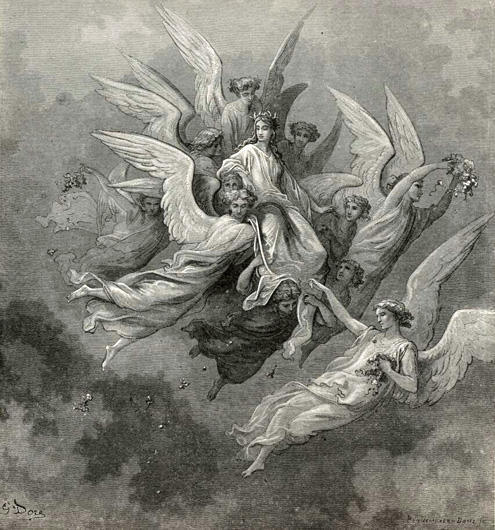
I have beheld, ere now, at break of day,
The eastern clime all roseate, and the sky
Oppos'd, one deep and beautiful serene,
And the sun's face so shaded, and with mists
Attemper'd at lids rising, that the eye
Long while endur'd the sight: thus in a cloud
Of flowers, that from those hands angelic rose,
And down, within and outside of the car,
Fell showering, in white veil with olive wreath'd,
A virgin in my view appear'd, beneath
Green mantle, rob'd in hue of living flame.
Purgatorio Canto 31
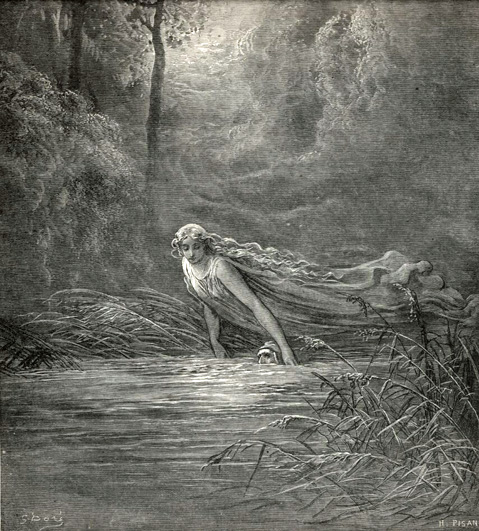
No sooner lifted I mine aspect up,
Than downward sunk that vision I beheld
Of goodly creatures vanish; and mine eyes
Yet unassur'd and wavering, bent their light
On Beatrice. Towards the animal,
Who joins two natures in one form, she turn'd,
And, even under shadow of her veil,
And parted by the verdant rill, that flow'd
Between, in loveliness appear'd as much
Her former self surpassing, as on earth
All others she surpass'd. Remorseful goads
Shot sudden through me. Each thing else, the more
Its love had late beguil'd me, now the more
I Was loathsome. On my heart so keenly smote
The bitter consciousness, that on the ground
O'erpower'd I fell: and what my state was then,
She knows who was the cause. When now my strength
Flow'd back, returning outward from the heart,
The lady, whom alone I first had seen,
I found above me. "Loose me not," she cried:
"Loose not thy hold;" and lo! had dragg'd me high
As to my neck into the stream, while she,
Still as she drew me after, swept along,
Swift as a shuttle, bounding o'er the wave.
Purgatorio Canto 32
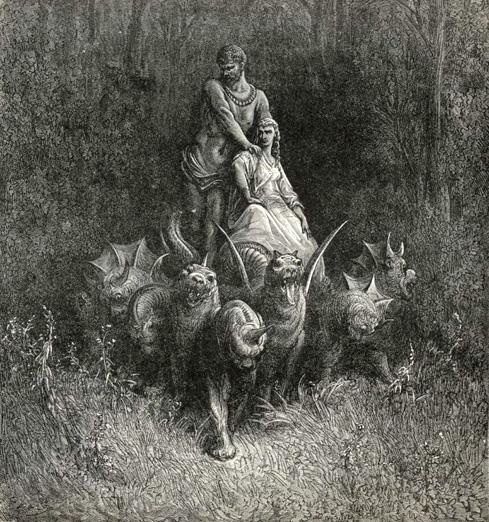
On mountain's lofty top, a shameless whore,
Whose ken rov'd loosely round her. At her side,
As 't were that none might bear her off, I saw
A giant stand; and ever, and anon
They mingled kisses. But, her lustful eyes
Chancing on me to wander, that fell minion
Scourg'd her from head to foot all o'er; then full
Of jealousy, and fierce with rage, unloos'd
The monster, and dragg'd on, so far across
The forest, that from me its shades alone
Shielded the harlot and the new-form'd brute.
Purgatorio Canto 33
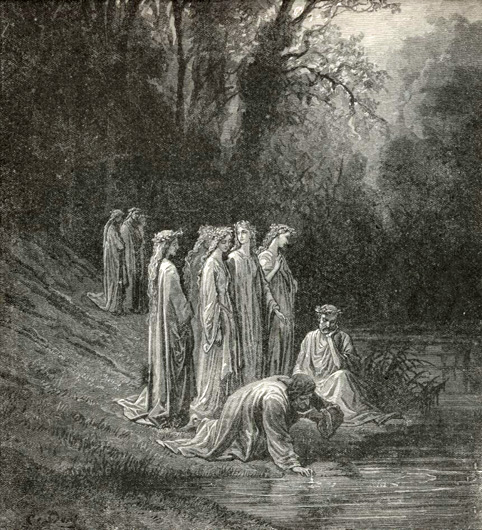
And Beatrice: "Some more pressing care
That oft the memory 'reeves, perchance hath made
His mind's eye dark. But lo! where Eunoe cows!
Lead thither; and, as thou art wont, revive
His fainting virtue." As a courteous spirit,
That proffers no excuses, but as soon
As he hath token of another's will,
Makes it his own; when she had ta'en me, thus
The lovely maiden mov'd her on, and call'd
To Statius with an air most lady-like:
"Come thou with him." Were further space allow'd,
Then, Reader, might I sing, though but in part,
That beverage, with whose sweetness I had ne'er
Been sated. But, since all the leaves are full,
Appointed for this second strain, mine art
With warning bridle checks me. I return'd
From the most holy wave, regenerate,
If 'en as new plants renew'd with foliage new,
Pure and made apt for mounting to the stars.
PARADISO
Paradiso Canto 3
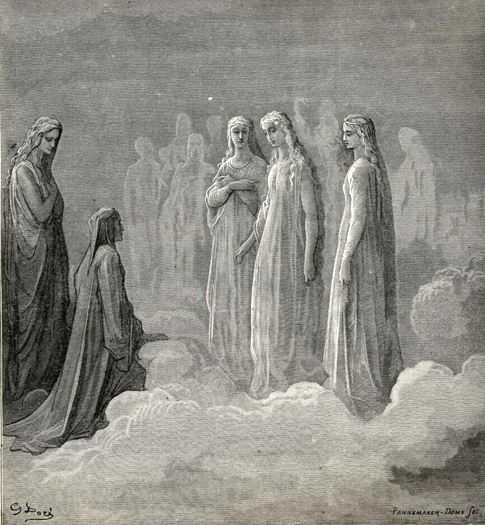
That sun, which erst with love my bosom warm'd
Had of fair truth unveil'd the sweet aspect,
By proof of right, and of the false reproof;
And I, to own myself convinc'd and free
Of doubt, as much as needed, rais'd my head
Erect for speech. But soon a sight appear'd,
Which, so intent to mark it, held me fix'd,
That of confession I no longer thought.
Paradiso Canto 5
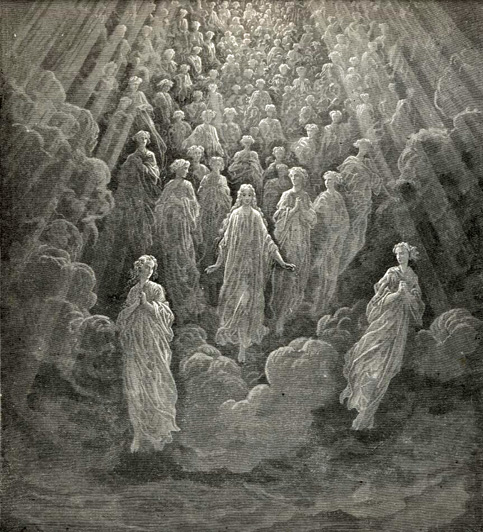
As in a quiet and clear lake the fish,
If aught approach them from without, do draw
Towards it, deeming it their food; so drew
Full more than thousand splendours towards us,
And in each one was heard: "Lo! one arriv'd
To multiply our loves!" and as each came
The shadow, streaming forth effulgence new,
Witness'd augmented joy. Here, reader! think,
If thou didst miss the sequel of my tale,
To know the rest how sorely thou wouldst crave;
And thou shalt see what vehement desire
Possess'd me, as soon as these had met my view,
To know their state. "O born in happy hour!
Thou to whom grace vouchsafes, or ere thy close
Of fleshly warfare, to behold the thrones
Of that eternal triumph, know to us
The light communicated, which through heaven
Expatiates without bound. Therefore, if aught
Thou of our beams wouldst borrow for thine aid,
Spare not; and of our radiance take thy fill."
Paradiso Canto 8
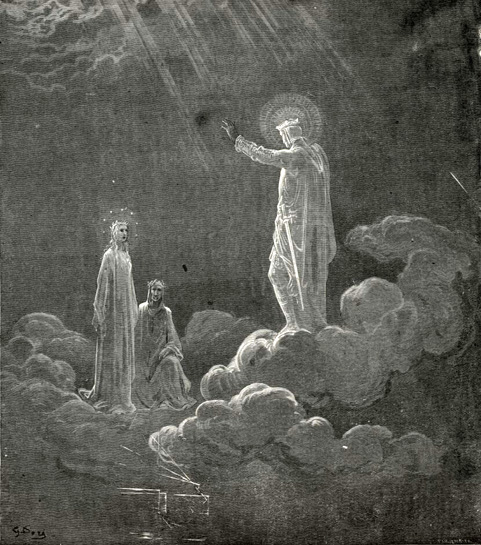
After mine eyes had with meek reverence
Sought the celestial guide, and were by her
Assur'd, they turn'd again unto the light
Who had so largely promis'd, and with voice
That bare the lively pressure of my zeal,
"Tell who ye are," I cried. Forthwith it grew
In size and splendour, through augmented joy;
And thus it answer'd: "A short date below
The world possess'd me. Had the time been more,
Much evil, that will come, had never chanc'd.
My gladness hides thee from me, which doth shine
Around, and shroud me, as an animal
In its own silk unswath'd. Thou lov'dst me well,
And had'st good cause; for had my sojourning
Been longer on the earth, the love I bare thee
Had put forth more than blossoms. The left bank,
That Rhone, when he hath mix'd with Sorga, laves."
Paradiso Canto 12
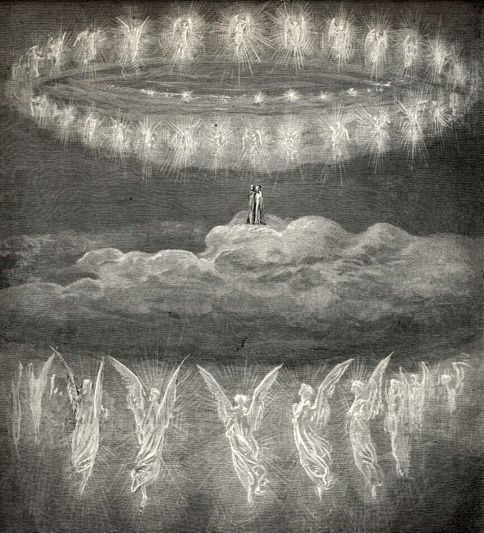
Soon as its final word the blessed flame
Had rais'd for utterance, straight the holy mill
Began to wheel, nor yet had once revolv'd,
Or ere another, circling, compass'd it,
Motion to motion, song to song, conjoining,
Song, that as much our muses doth excel,
Our Sirens with their tuneful pipes, as ray
Of primal splendour doth its faint reflex.
Paradiso Canto 14
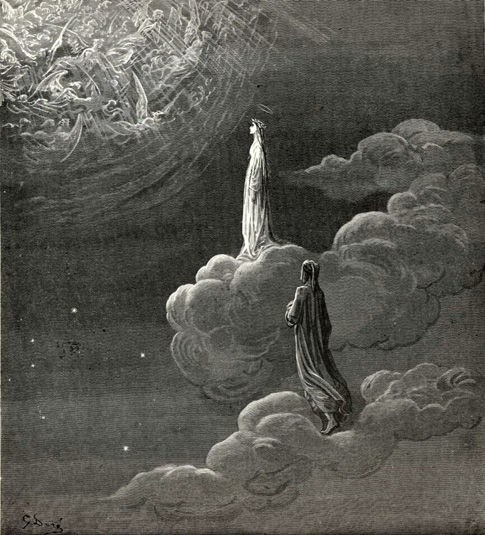
O gentle glitter of eternal beam!
With what a such whiteness did it flow,
O'erpowering vision in me! But so fair,
So passing lovely, Beatrice show'd,
Mind cannot follow it, nor words express
Her infinite sweetness. Thence mine eyes regain'd
Power to look up, and I beheld myself,
Sole with my lady, to more lofty bliss
Translated: for the star, with warmer smile
Impurpled, well denoted our ascent.
Paradiso Canto 14
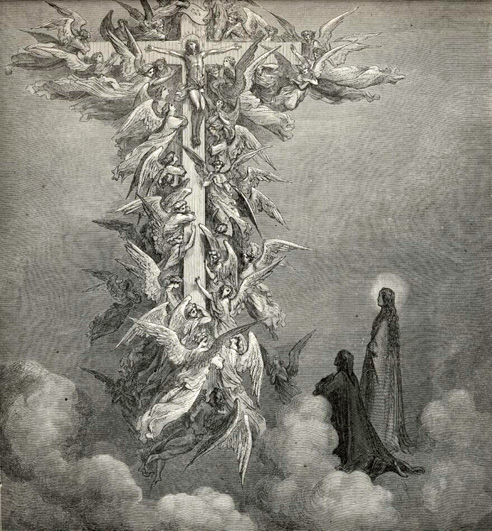
With all the heart, and with that tongue which speaks
The same in all, an holocaust I made
To God, befitting the new grace vouchsaf'd.
And from my bosom had not yet upsteam'd
The fuming of that incense, when I knew
The rite accepted. With such mighty sheen
And mantling crimson, in two listed rays
The splendours shot before me, that I cried,
"God of Sabaoth! that does prank them thus!"
Paradiso Canto 16
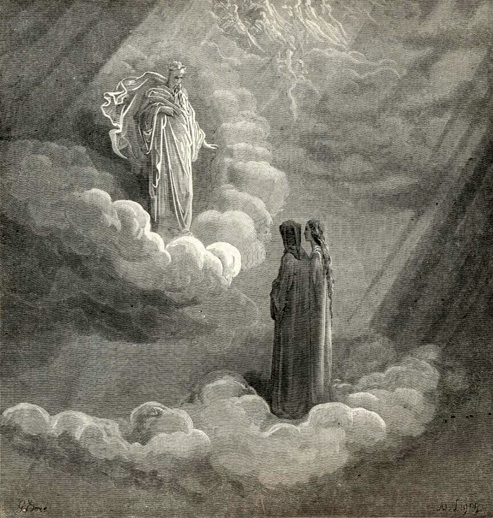
O Buondelmonte! what ill counseling
Prevail'd on thee to break the plighted bond
Many, who now are weeping, would rejoice,
Had God to Ema giv'n thee, the first time
Thou near our city cam'st. But so was doom'd:
On that maim'd stone set up to guard the bridge,
At thy last peace, the victim, Florence! fell.
With these and others like to them, I saw
Florence in such assur'd tranquility,
She had no cause at which to grieve: with these
Saw her so glorious and so just, that ne'er
The lily from the lance had hung reverse,
Or through division been with vermeil dyed."
Paradiso Canto 18
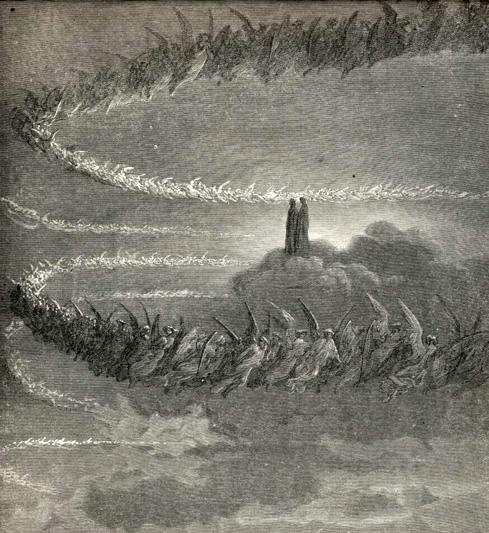
And, as by sense
Of new delight, the man, who perseveres
In good deeds doth perceive from day to day
His virtue growing; I e'en thus perceiv'd
Of my ascent, together with the heav'n
The circuit widen'd, noting the increase
Of beauty in that wonder. Like the change
In a brief moment on some maiden's cheek,
Which from its fairness doth discharge the weight
Of pudency, that stain'd it; such in her,
And to mine eyes so sudden was the change,
Through silvery whiteness of that temperate star,
Whose sixth orb now enfolded us. I saw,
Within that Jovial cresset, the clear sparks
Of love, that reign'd there, fashion to my view
Our language. And as birds, from river banks
Arisen, now in round, now lengthen'd troop,
Array them in their flight, greeting, as seems,
Their new-found pastures; so, within the lights,
The saintly creatures flying, sang, and made
Now D. now I. now L. figur'd I' th' air.
Paradiso Canto 18
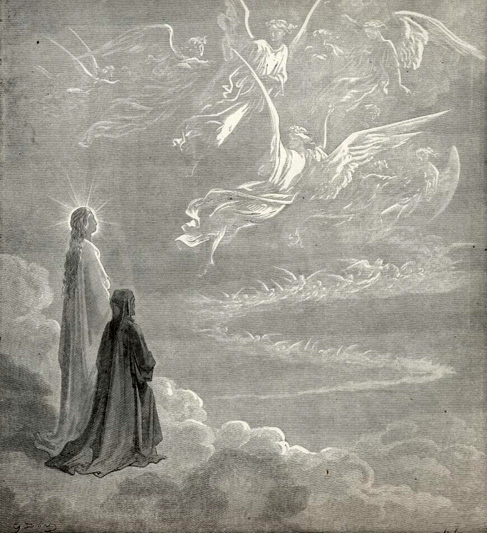
Sweet star! what glorious and thick-studded gems
Declar'd to me our justice on the earth
To be the effluence of that heav'n, which thou,
Thyself a costly jewel, dost inlay!
Therefore I pray the Sovran Mind, from whom
Thy motion and thy virtue are begun,
That he would look from whence the fog doth rise,
To vitiate thy beam: so that once more
He may put forth his hand 'gainst such, as drive
Their traffic in that sanctuary, whose walls
With miracles and martyrdoms were built.
Paradiso Canto 19
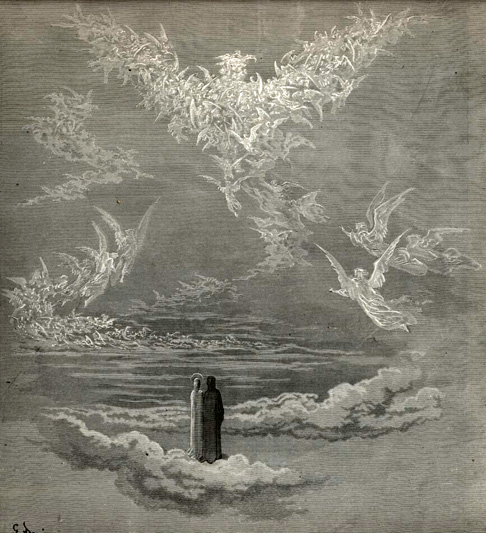
Before my sight appear'd, with open wings,
The beauteous image, in fruition sweet
Gladdening the thronged spirits. Each did seem
A little ruby, whereon so intense
The sun-beam glow'd that to mine eyes it came
In clear refraction. And that, which next
Befalls me to portray, voice hath not utter'd,
Nor hath ink written, nor in fantasy
Was e'er conceiv'd. For I beheld and heard
The beak discourse; and, what intention form'd
Of many, singly as of one express,
Beginning: "For that I was just and piteous,
l am exalted to this height of glory,
The which no wish exceeds: and there on earth
Have I my memory left, e'en by the bad
Commended, while they leave its course untrod."
Paradiso Canto 20
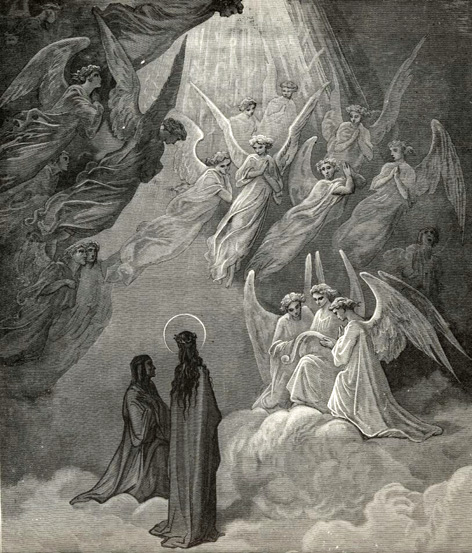
When, disappearing, from our hemisphere,
The world's enlightener vanishes, and day
On all sides wasteth, suddenly the sky,
Erewhile irradiate only with his beam,
Is yet again unfolded, putting forth
Innumerable lights wherein one shines.
Of such vicissitude in heaven I thought,
As the great sign, that marshaleth the world
And the world's leaders, in the blessed beak
Was silent; for that all those living lights,
Waxing in splendour, burst forth into songs,
Such as from memory glide and fall away.
Paradiso Canto 21
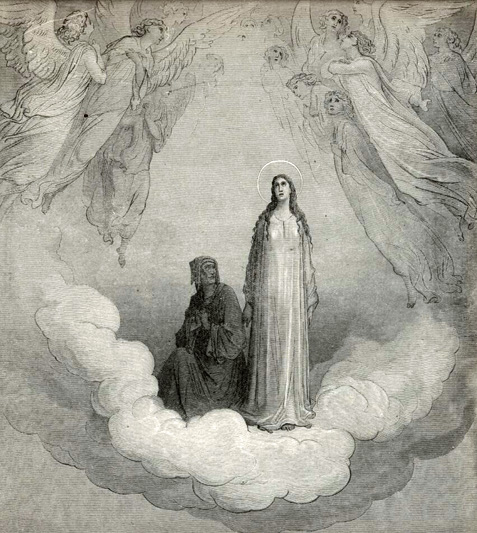
Again mine eyes were fix'd on Beatrice,
And with mine eyes my soul, that in her looks
Found all contentment. Yet no smile she wore
And, "Did I smile," quoth she, "thou wouldst be straight
Like Semele when into ashes turn'd:
For, mounting these eternal palace-stairs,
My beauty, which the loftier it climbs,
As thou hast noted, still doth kindle more,
So shines, that, were no temp'ring interpos'd,
Thy mortal puissance would from its rays
Shrink, as the leaf doth from the thunderbolt.
Into the seventh splendour are we wafted,
That underneath the burning lion's breast
Beams, in this hour, commingled with his might,
Thy mind be with thine eyes: and in them mirror'd
The shape, which in this mirror shall be shown."
Whoso can deem, how fondly I had fed
My sight upon her blissful countenance,
May know, when to new thoughts I chang'd, what joy
To do the bidding of my heav'nly guide:
In equal balance poising either weight.
Paradiso Canto 21
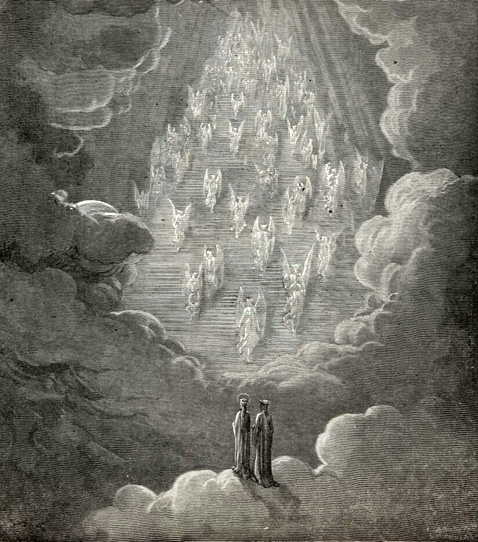
A ladder, which my ken pursued in vain,
So lofty was the summit; down whose steps
I saw the splendours in such multitude
Descending, ev'ry light in heav'n, methought,
Was shed thence. As the rooks, at dawn of day
Bestirring them to dry their feathers chill,
Some speed their way a-field, and homeward some,
Returning, cross their flight, while some abide
And wheel around their airy lodge; so seem'd
That glitterance, wafted on alternate wing,
As upon certain stair it met, and clash'd
Its shining. And one ling'ring near us, wax'd
So bright, that in my thought: said: "The love,
Which this betokens me, admits no doubt."
Paradiso Canto 26
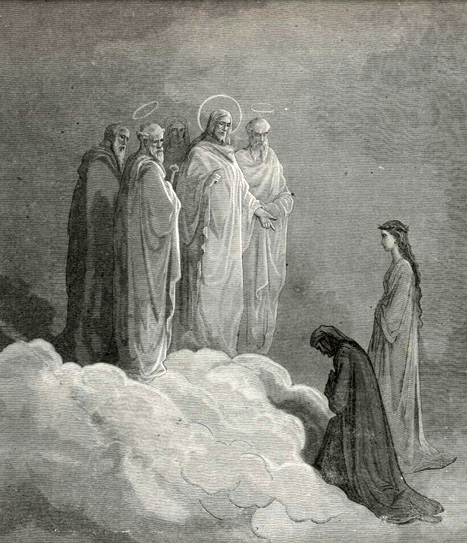
"And meanwhile rest assur'd, that sight in thee
Is but o'erpowered a space, not wholly quench'd:
Since thy fair guide and lovely, in her look
Hath potency, the like to that which dwelt
In Ananias' hand.'' I answering thus:
"Be to mine eyes the remedy or late
Or early, at her pleasure; for they were
The gates, at which she enter'd, and did light
Her never dying fire. My wishes here
Are centered; in this palace is the weal,
That Alpha and Omega, is to all
The lessons love can read me." Yet again
The voice which had dispers'd my fear, when daz'd
With that excess, to converse urg'd, and spake:
"Behooves thee sift more narrowly thy terms,
And say, who level'd at this scope thy bow."
Paradiso Canto 27
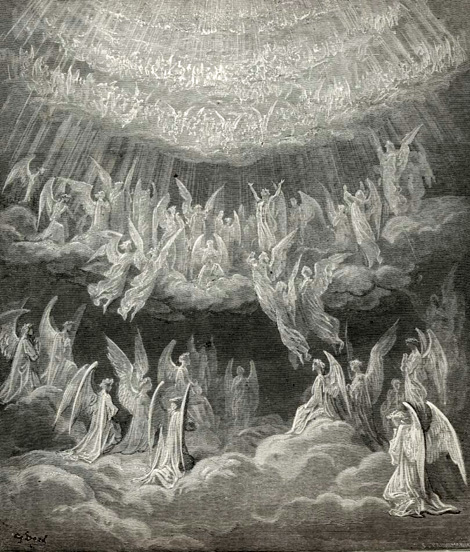
Then "Glory to the Father, to the Son,
And to the Holy Spirit," rang aloud
Throughout all Paradise, that with the song
My spirit reel'd, so passing sweet the strain:
And what I saw was equal ecstasy;
One universal smile it seem'd of all things,
Joy past compare, gladness unutterable,
Imperishable life of peace and love,
Exhaustless riches and unmeasur'd bliss.
Paradiso Canto 28
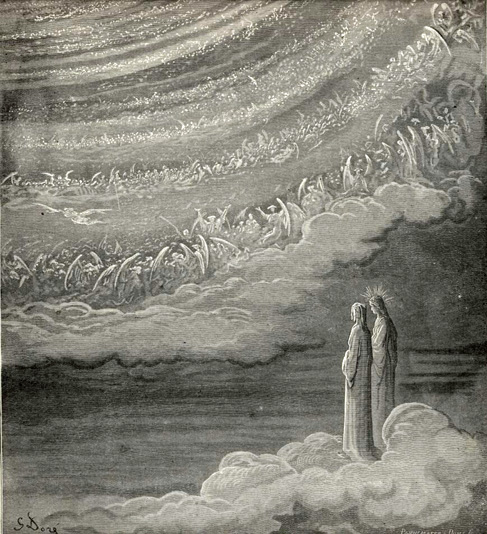
As when the sturdy north blows from his cheek
A blast, that scours the sky, forthwith our air,
Clear'd of the rack, that hung on it before,
Glitters; and, With his beauties all unveil'd,
The firmament looks forth serene, and smiles;
Such was my cheer, when Beatrice drove
With clear reply the shadows back, and truth
Was manifested, as a star in heaven.
And when the words were ended, not unlike
To iron in the furnace, every cirque
Ebullient shot forth scintillating fires:
And every sparkle shivering to new blaze,
In number did outmillion the account
Reduplicate upon the chequer'd board.
Then heard I echoing on from choir to choir,
"Hosanna," to the fixed point, that holds,
And shall for ever hold them to their place,
From everlasting, irremovable.
Paradiso Canto 31
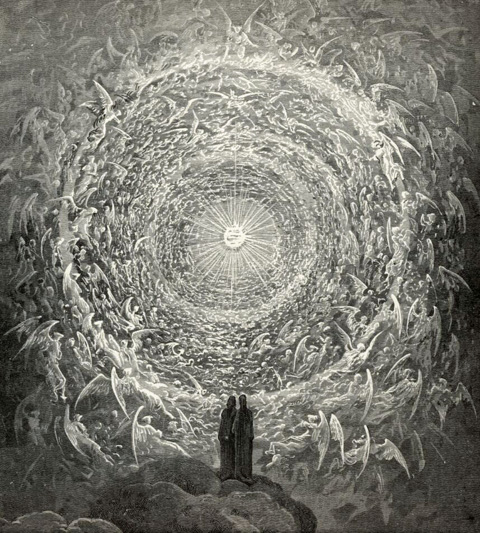
In fashion, as a snow-white rose, lay then
Before my view the saintly multitude,
Which in his own blood Christ espous'd. Meanwhile
That other host, that soar aloft to gaze
And celebrate his glory, whom they love,
Hover'd around; and, like a troop of bees,
Amid the vernal sweets alighting now,
Now, clustering, where their fragrant labour glows,
Flew downward to the mighty flow'r, or rose
From the redundant petals, streaming back
Unto the steadfast dwelling of their joy.
Faces had they of flame, and wings of gold;
The rest was whiter than the driven snow.
And as they flitted down into the flower,
From range to range, fanning their plumy loins,
Whisper'd the peace and ardour, which they won
From that soft winnowing. Shadow none, the vast
Interposition of such numerous flight
Cast, from above, upon the flower, or view
Obstructed aught. For, through the universe,
Wherever merited, celestial light
Glides freely, and no obstacle prevents.
Paradiso Canto 31
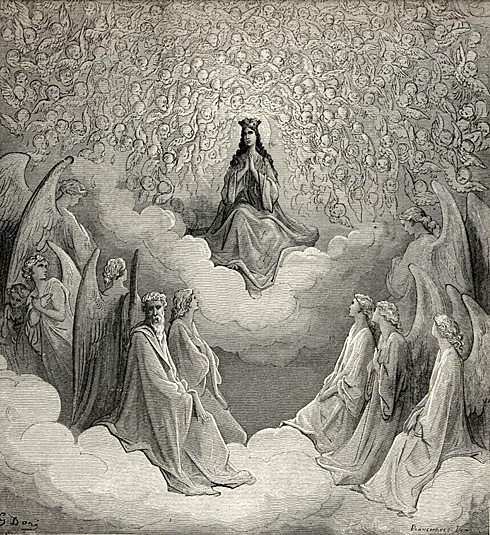
"O Lady! thou in whom my hopes have rest!
Who, for my safety, hast not scorn'd, in hell
To leave the traces of thy footsteps mark'd!
For all mine eyes have seen, I, to thy power
And goodness, virtue owe and grace. Of slave,
Thou hast to freedom brought me; and no means,
For my deliverance apt, hast left untried.
Thy liberal bounty still toward me keep.
That, when my spirit, which thou madest whole,
Is loosen'd from this body, it may find
Favour with thee." So I my suit preferr'd:
And she, so distant, as appear'd, look'd down,
And smil'd; then tow'rds th' eternal fountain turn'd.
Gustav Dore Illustrations of Don Quixote
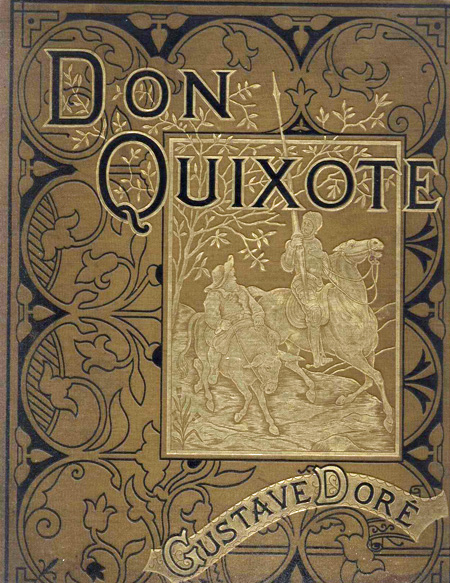
GARGANTUA AND HIS SON PANTAGRUEL
Dore Illustrations
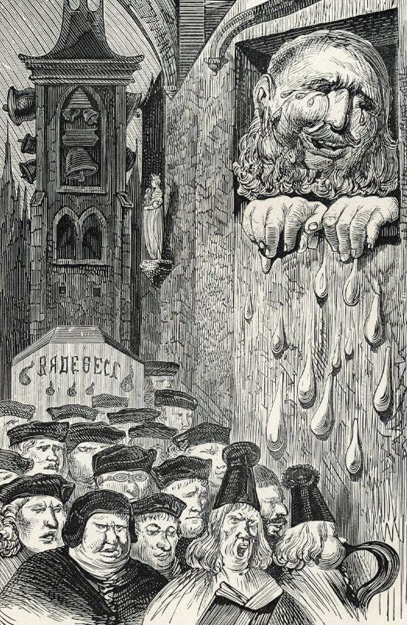
Dore's English Bible Illustrations: (1866)
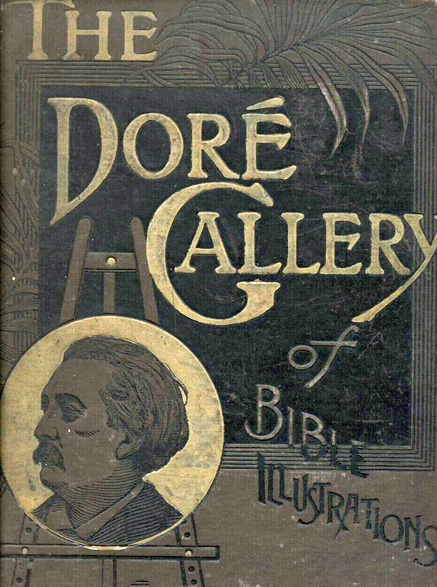
Other Works of Paul Gustave Dore
A Mountainous Landscape With A Balloon
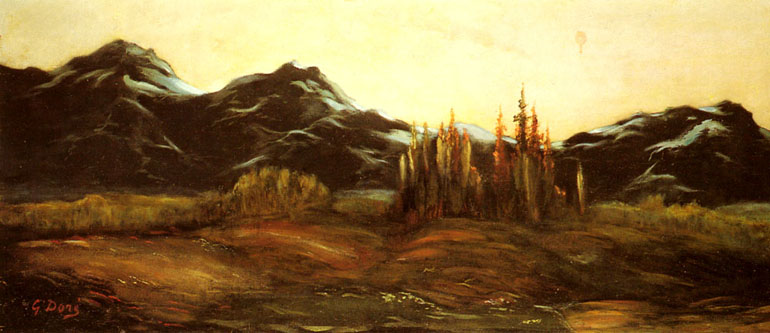
Andromeda: 1869
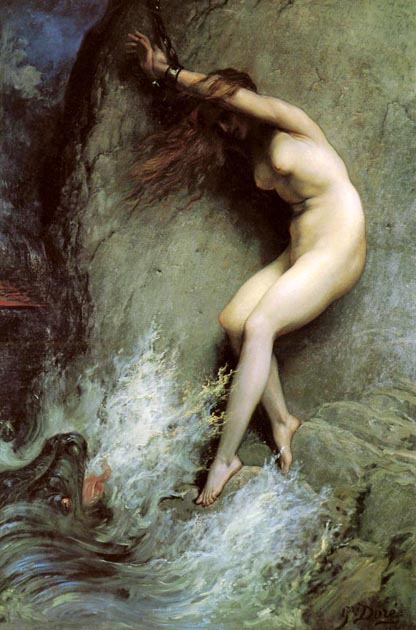
Paul Gustave Dore
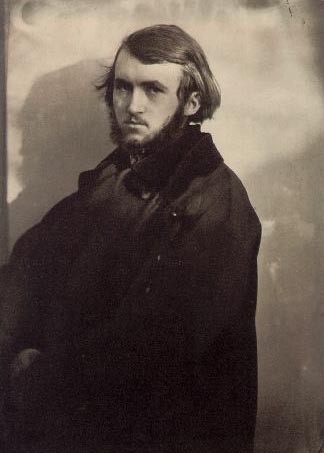
Castle on the Isle of Skye: 1877
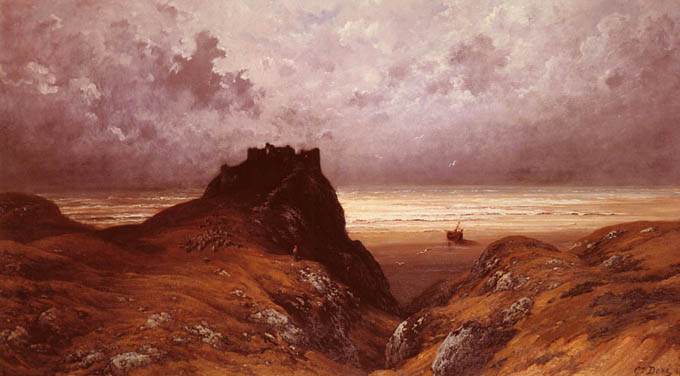
Ecce Homo: 1877
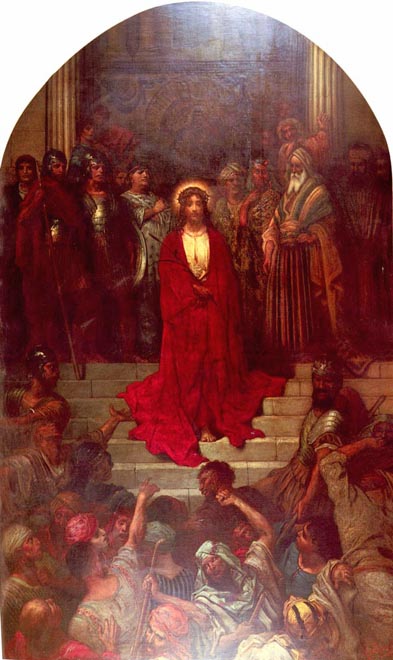
Gorge in the Mountains: 1878
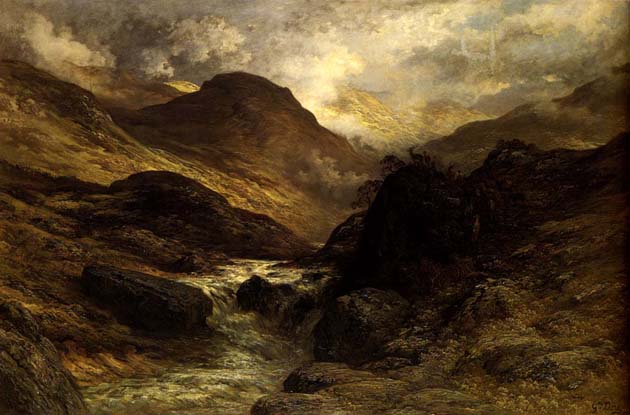
Jesus Prechant Sur La Montagne
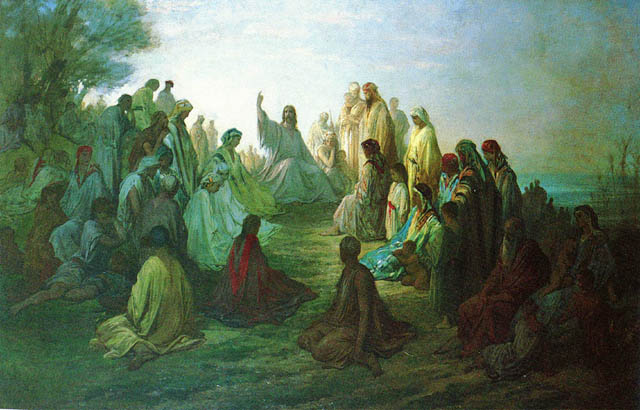
Jeune Mendiant
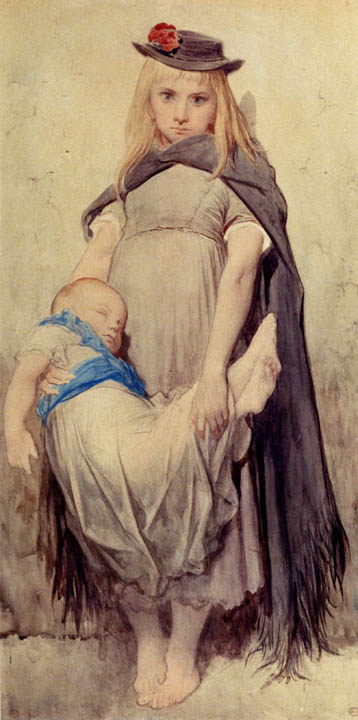
La Defense Nationale
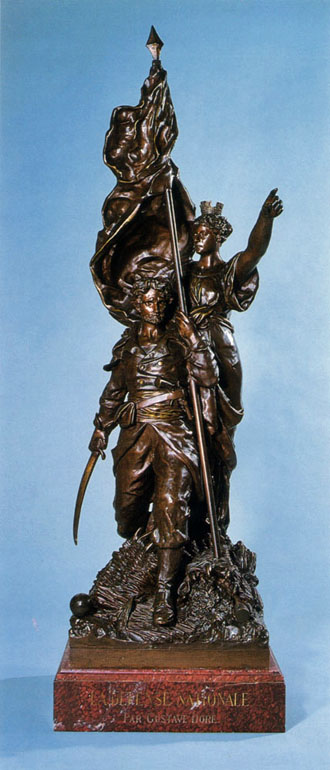
La Siesta
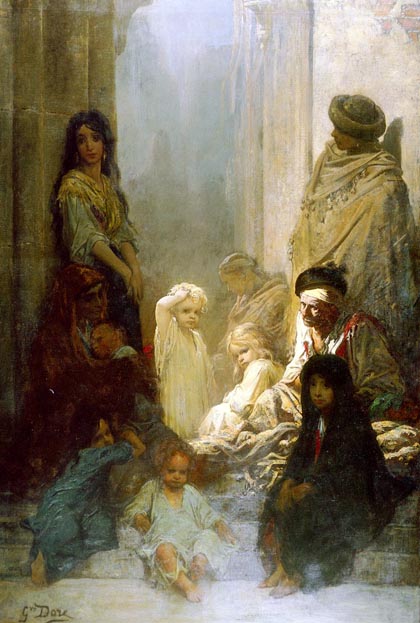
Les Oceanides - Les Naiades de la mer: ca 1860 - 69
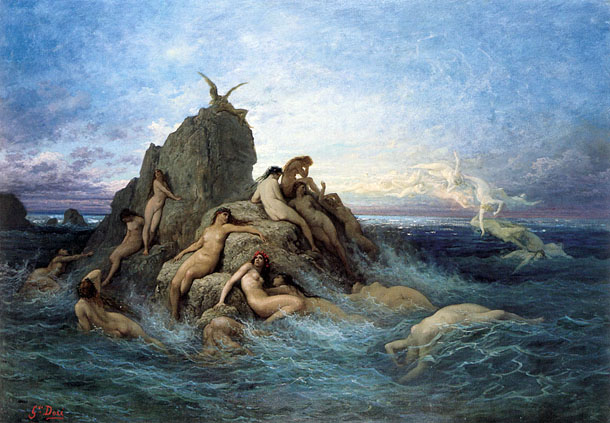
Paolo and Francesca Da Rimini
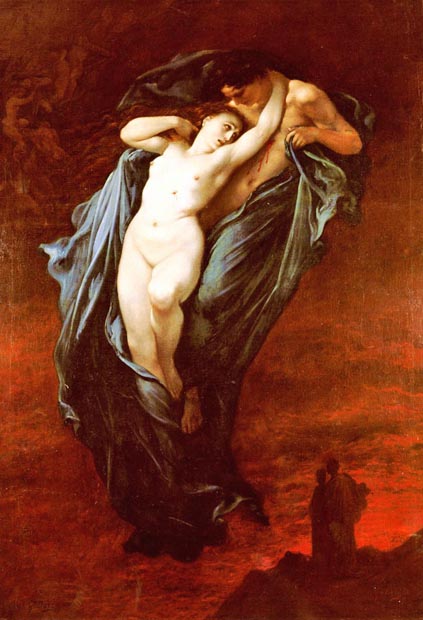
Souvenir D'Ecosse: 1879
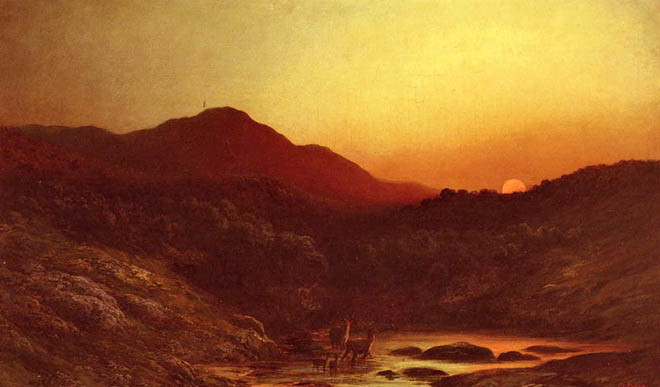
Tavern in Whitechapel: ca 1869
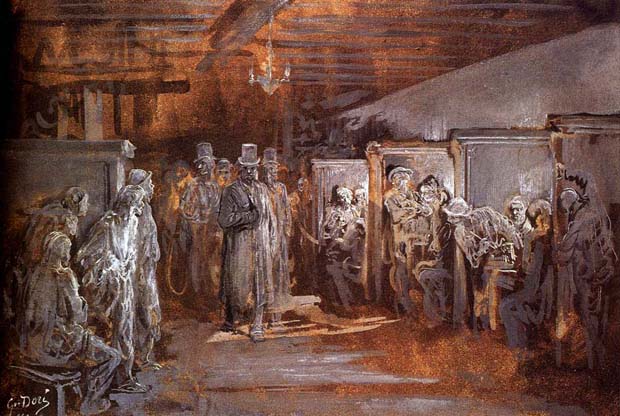
The Christian Martyrs
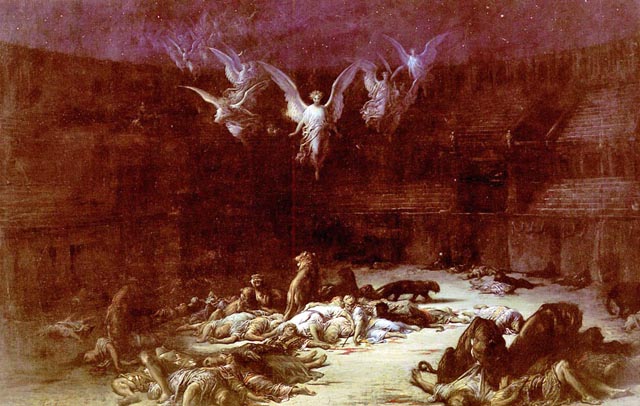
Two Owls
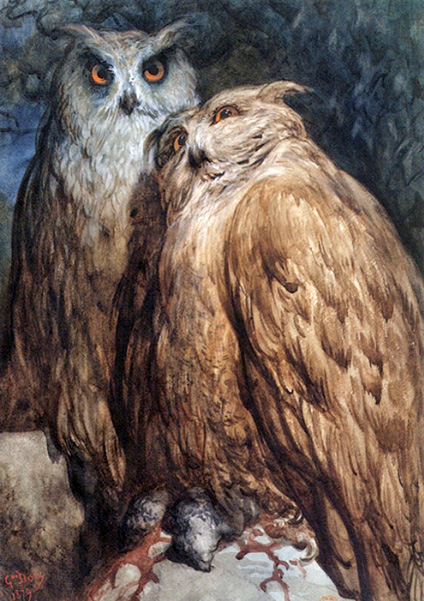
Source: Art Renewal Center
Source: A Gallery of Illustrations by Paul Gustave Dore
This page is the work of Senex Magister
Return to Pagina Artis
Return to Bruce and Bobbie's Main Page.
























































































































































